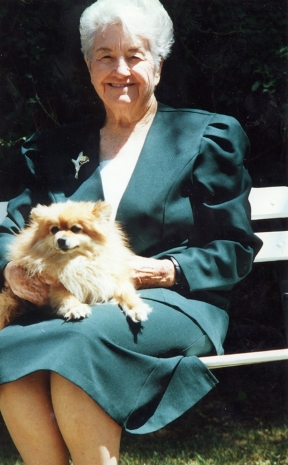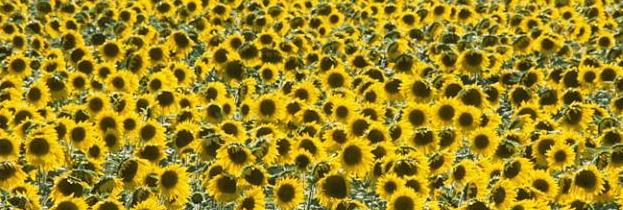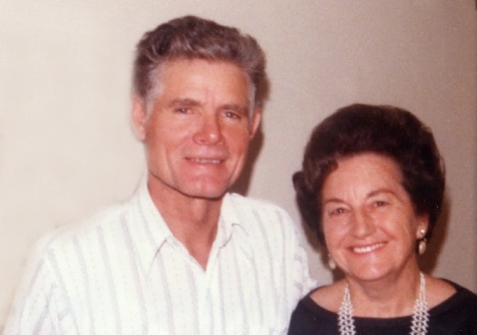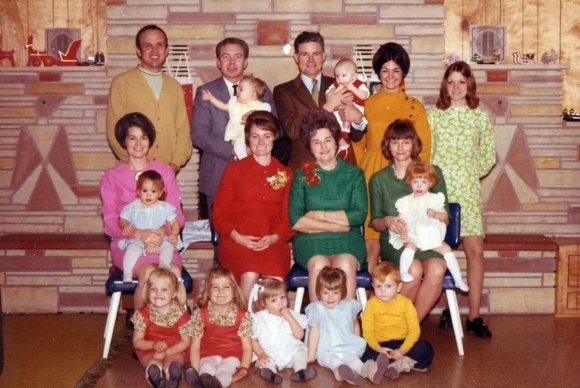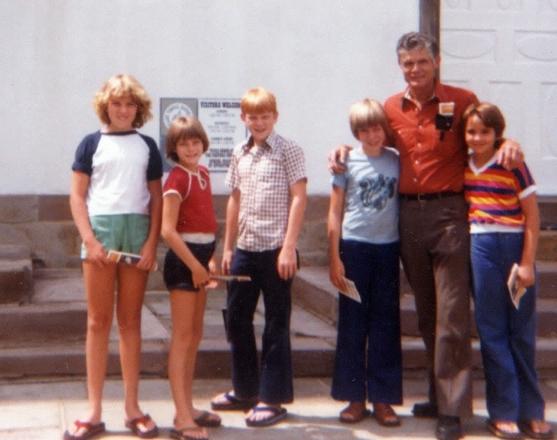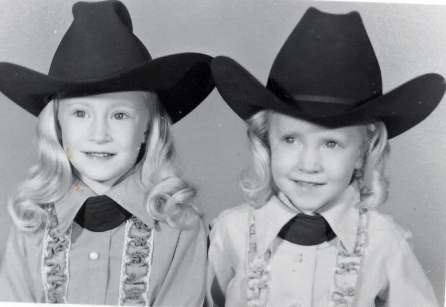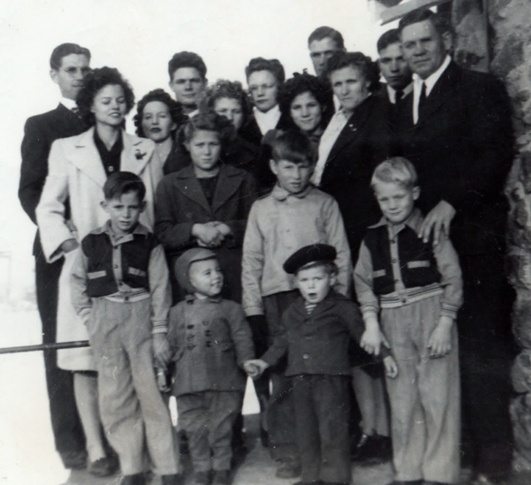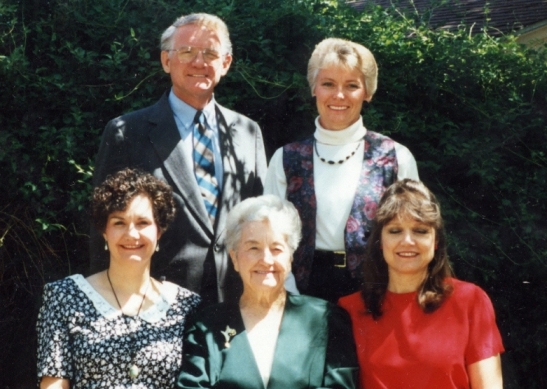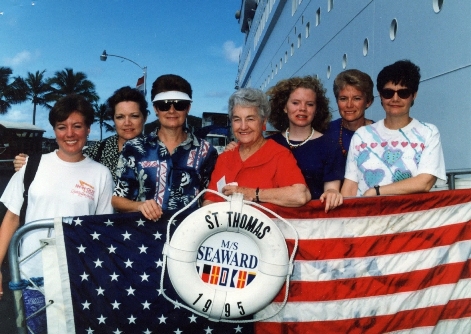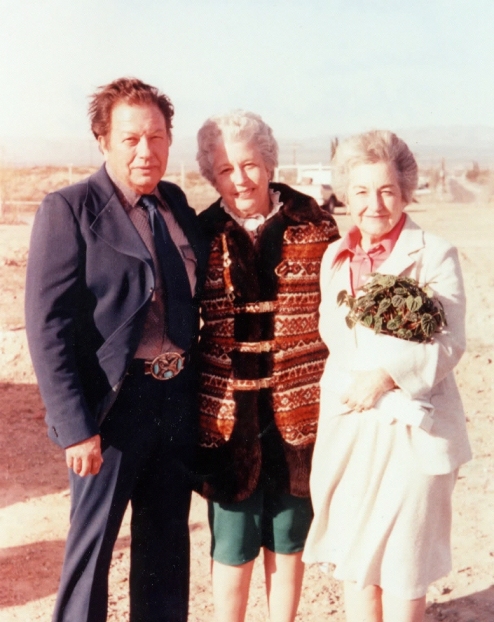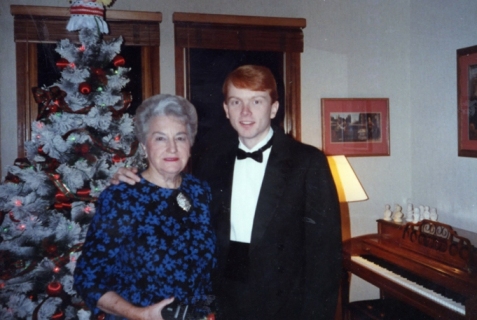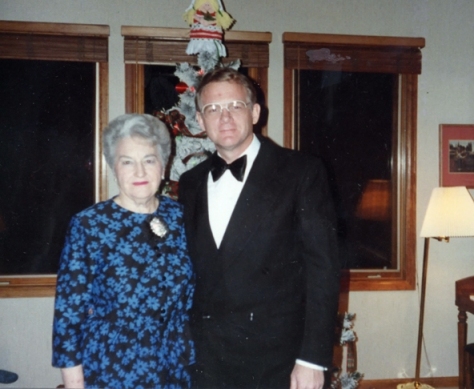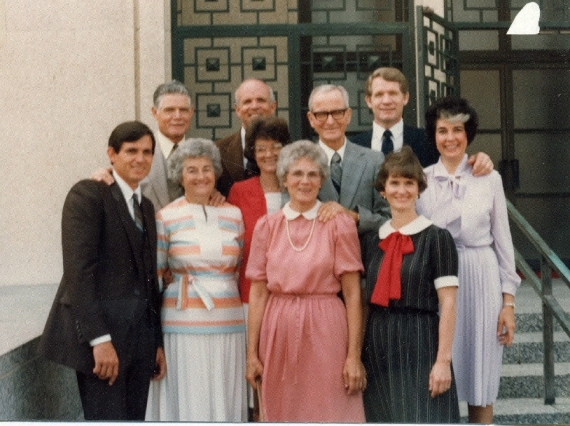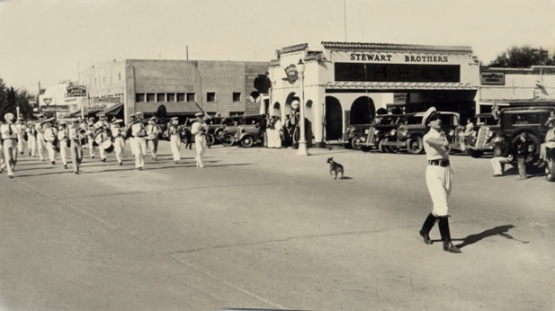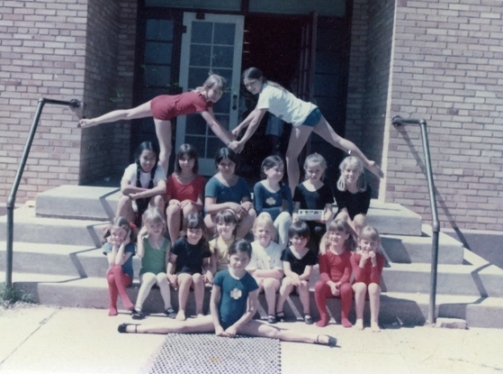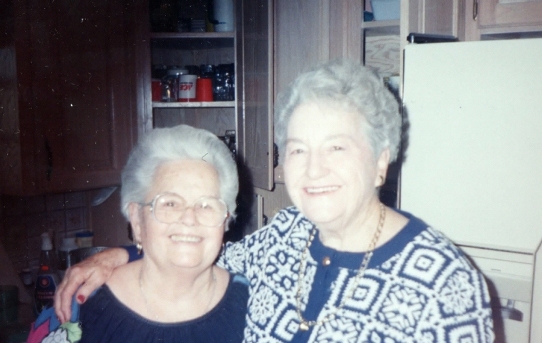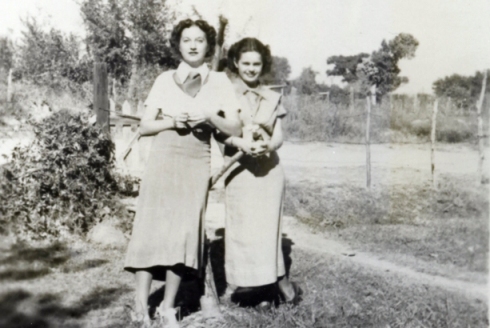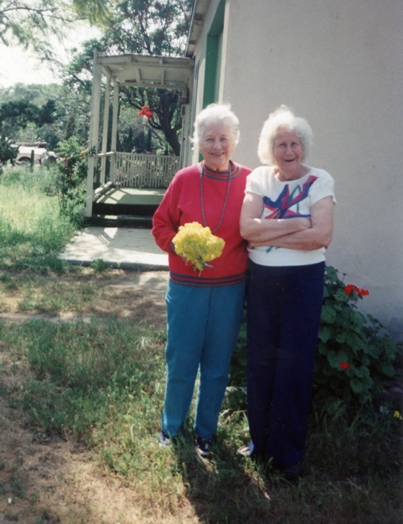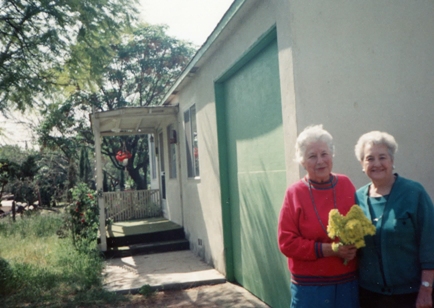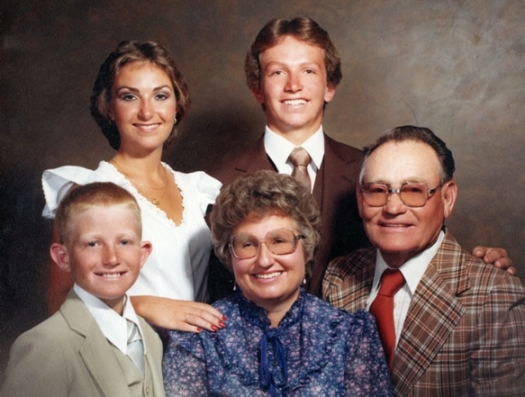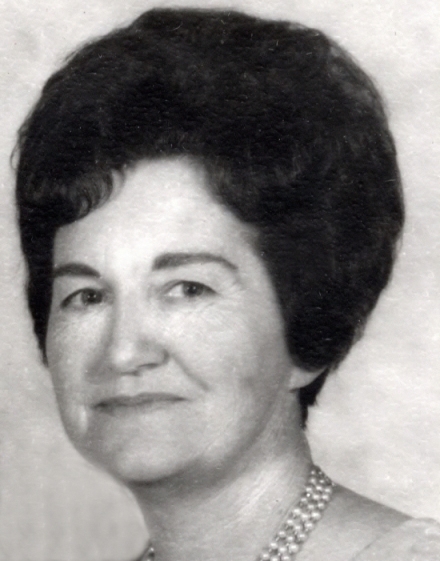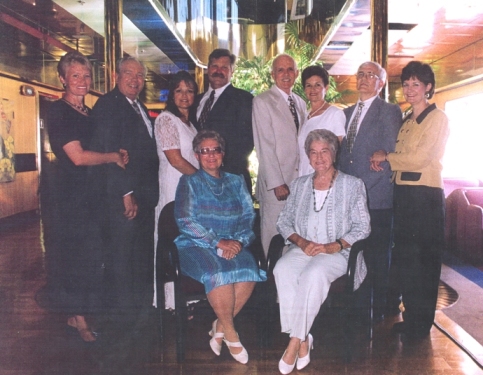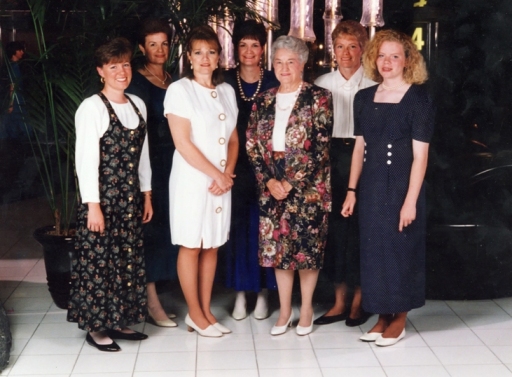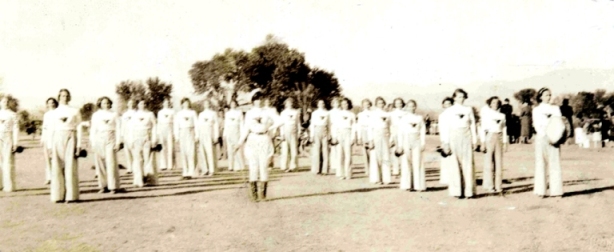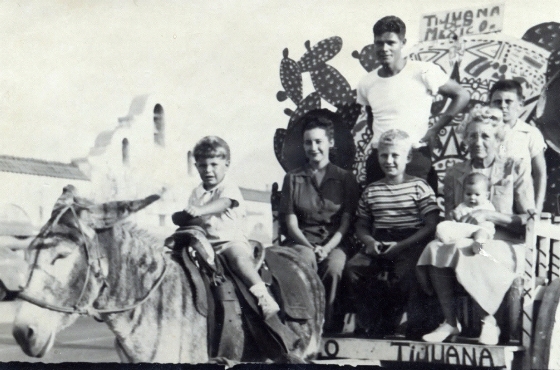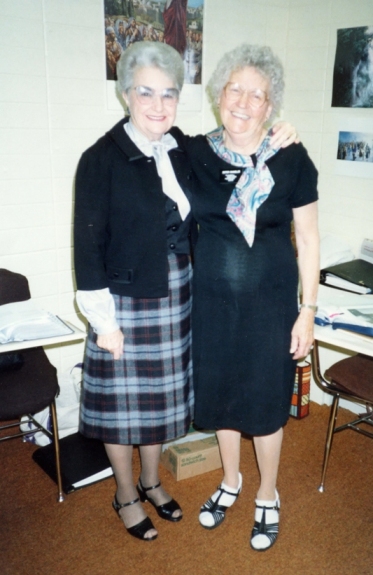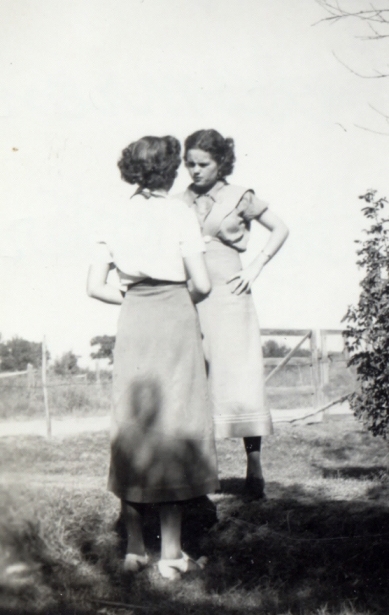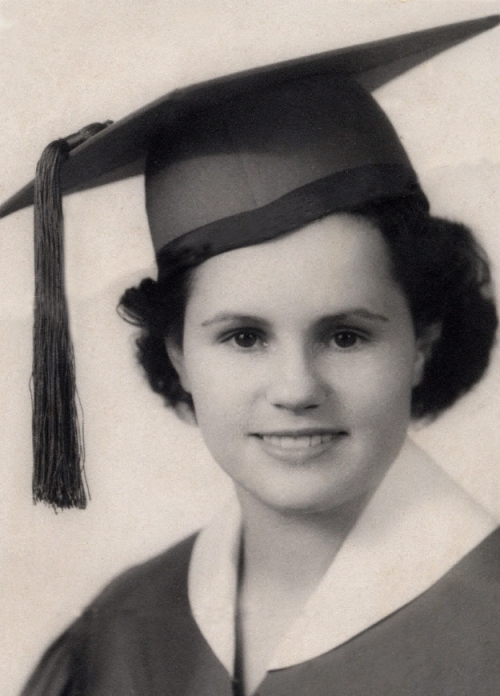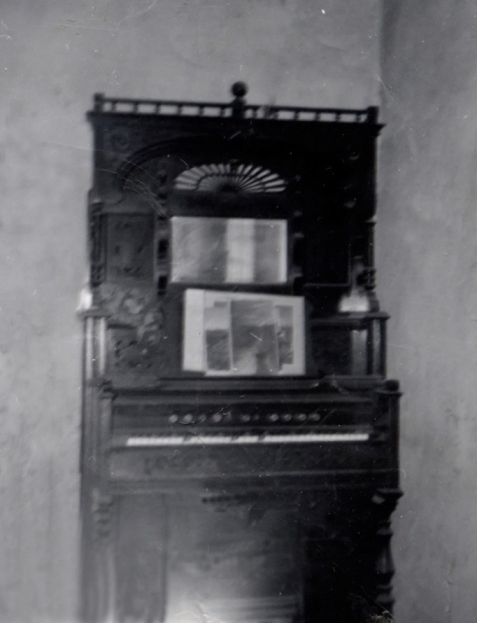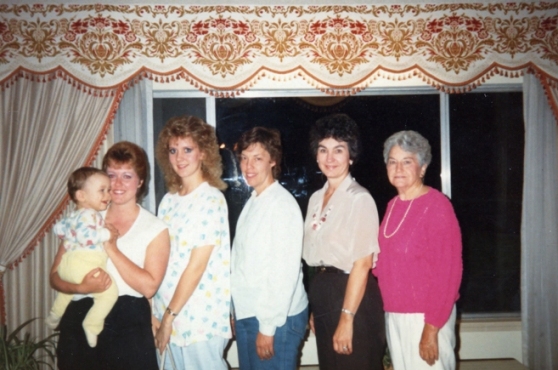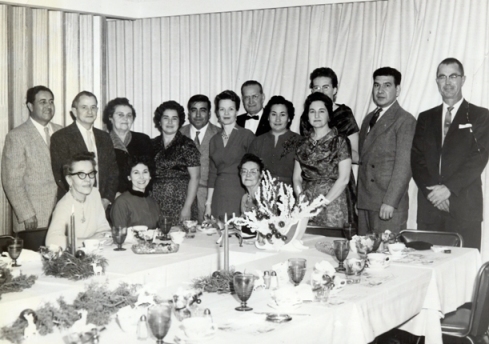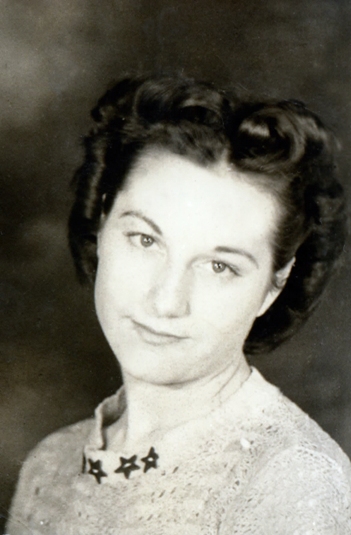The Life Story of Hester
Elizabeth Damron Brimhall
|
Compiled by Richard Logan Brimhall and Ivy LaPriel Burnett Brimhall
Editors: Alicia Brimhall, Christina Elizabeth Brimhall Stewart and Marcela Brimhall |
|
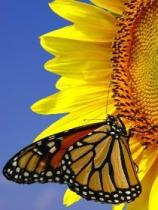
|
|
Table of Contents
INTRODUCTION
CHAPTER 1: Echoing Footsteps
• My Birth
• Whooping Cough
• Blessing and Baptism
• My Physical Description
CHAPTER 2: My Mother - Armelda Ferguson Damron
• Mom’s Physical Description
• My Mother’s Was From Kentucky
• My Mother’s Role
• Mom’s Personality and Cookies
• Church and Working with Mother
• Mom’s Quilting
• Wash Day
• Hatching Chickens and Picking Cotton
• Nap on Cotton Sack
• Mom’s Butter
• Jack and Buttered Biscuits
• Honey and Beehives
• Company and Chicken to Eat
• I Spill the Cream
• My Mom Lives With Us in Winslow
CHAPTER 3: My Father - Joseph Vernon Damron
• Physical Description of Dad
• Damrons Come From Utah
• William Wallace Damron, My Paternal Grandfather
• Dad and Pima Cattle Story
• Dad and Het combing Hair
• Dad Carved Toys For Another Family at Christmas
• Dad and Old Buck
• Dad and Our Buggy
• Dad and Sun Flower Story
• Dad and Buggy River Crossing
• Dad, Buck and Shopping
• Dad and Buck Dies
• Dad An Article on Shaving
• Rag Rugs
• Dad and Visits to His Mom
• Dad Helped With Canning
• Dad Popping Corn
• Dad Tingled My Legs
• Dad and Annie Tripped
• Dad Plowing the Fields
• Dad & Incubating Eggs
• Eggs to Pigs
• Dad Passes Away
CHAPTER 4: My Siblings
• Armelda
• Joe
• Ray
• Lewis
• Annie
• Chet
• Jack
• Bettie Lou
• Home Alone
CHAPTER 5: Home Life While Growing Up
• Dad and Killing Animals
• Bladder Balls
• White Corn
• Jack and I Playing in the Corn Stalks
• Mom and Head Cheese
• What our Family Ate; Cush, Pig Weed, Etc.
• Get Rich Meal/Pearls
• Streaked Grease
• Our Snacks
• Constipation
• De-worming
• Stomach Aches
• Living Condition/Water and Power
• Canning on the Hot Stove
• Wash and Ironing Days
• Ironing Chores
• Cow Chain Story
• Ditch Broken Arm Story
• Screen Porch Scared Story
• Built Hatching House Story
• Playing Bottle Horses with Jack
• Willie McRae Story
• Carpenter Telescope Story
• Our Thatcher Neighbors
• Games We Played
• Tarzan Movie Story
• My Jobs
• Description of Our Home
• Our Kitchen
• Jello Story
• Joe Arkansas Project
• Linoleum Project
• Cream Separator Story
• Easter Egg Hunt Story
• Thanksgiving Cake Story
• Our Christmas
• President Kimball
• Parental Church Activity
• Jake Suicide Story
• Sacrament Meeting Stories
• Fast Offerings In Kind
• Monkey Bill Moody
• Horseback Riding with Kitty Curtis
• Ditch and Bee Sting
• Mexican Family
• Uncle Gene and Aunt Hatties’ Hay Barn
• Record Player and Radio
• Roasting and Eating Doves
• Favorite Foods
• Honey and Beehives
• Tubing in the Big Ditch
• Sneak Swimming
• Chet and School
• Patriarchal Blessing
• Baptism For the Dead
• Childhood Sickness
• Trials in my Life/Dad’s Death & World War II
• Reading by Lamplight
• Mom’s Flowers and Our Tricks
• Making Soap, Washing Socks, Raising Chickens
• Danger of Cotton Wagon
CHAPTER 6: Education
• Elementary School Favorite Teachers
• Trips Growing Up
• Friends and Dating
• High School
• Friends in High School
• How I Earned Money in High School
• HS Freshman Yr.
• HS Sophomore Yr.
• HS Junior Yr.
• HS Drum Majorette
• HS Pepperette Club
• HS Plays
• HS Offices
• Jr. College
• College Majorette
CHAPTER 7: Marriage and Life With Vaughn Lorenzo Brimhall
• Meeting VLB
• VLB Jumping the Ditch
• Hospital Blessing
• Vaughn’s Heart Attack and Blessing
• My Husband
• Tribute to My Husband
• Mama Lived with Us
• The Wreck
CHAPTER 8: Our Children and Our Home
• Children
• Humorous Episodes in Our Lives
• Lessons Learned with Children
• Places we Lived
• Adult Friends
• Betty Whipple
• Rexburg Women's Weed Suitcases
• Learning from other Women
• Betty & Temple Slip
• Betty Sharing Joys and Sorrows
• Betty Caring for the House
• What happened to Betty and Tom Whipple
CHAPTER 9: The Years of World War II
• Called to War
• Basic Training
• Letters and More Scorpions
• Hot Water Steam Story
• Ricky and Marsha W.W. II
• VB + HB WorId War II Story
• My Cousin Irene
• V-Day Victory
• Vaughn Comes Home
CHAPTER 10: Talents and Community Service
• Talents
• Community Service and Work
CHAPTER 11: Travel
• Places Traveled To
• Chile in Conflict
• Arica, Chile
• Easter Island Visit
• Return to Santiago
• Mexico Jorge Visit
• Easter Island Article
CHAPTER 12: Church Service
• Callings
• Missions
CHAPTER 13: Family Reunions
• How the B-13 Ranch Came to Be
CHAPTER 14: To My Posterity
• Advice to Youth and Goals
• Strength from Tribulation
• The Text of My Patriarchal Blessing
• My Testimony
CHAPTER 15: Photos of Who We Are and Who We Were
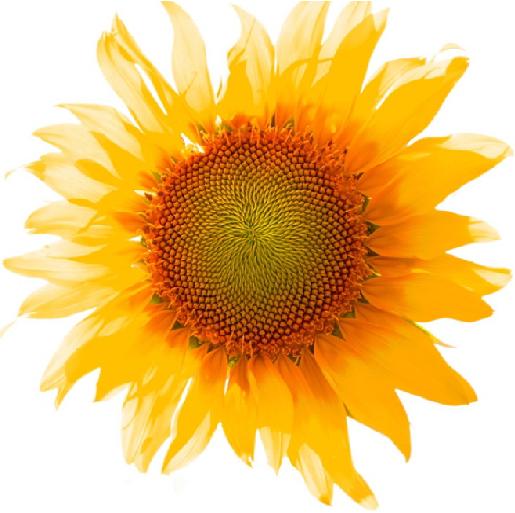
|
|
INTRODUCTION
This work was completed in 2005 and is a compilation of writings and cassette tapes dictated by Hester Elizabeth Damron Brimhall in the late 1980s through 2005 about her life. At the time of this compilation (2005) she is 85 years old living in the last home her husband built for her in the early 1960s in Winslow, Arizona. She is still very physically and mentally sound and participated actively in making this book a reality. Richard and LaPriel Brimhall began working with her in the mid 1980s on her life story. She is a record keeper, saving letters, articles, photos and keeping extensive personal journals over the years, all of which have been used in different degrees in the compilation of this work. Working with her in this project over the years has been a great blessing to us as a couple. It is her intent that this work provide the following;
1. A testament of faith in God;
2. A love of and enthusiasm for life; and
3. A statement of positive, moral courage to face what is experienced by each of us in this mortal probation.
This book is written to her current posterity and, especially, to the many generations yet to come.
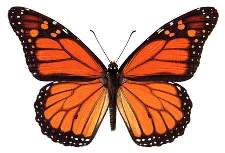
|
|
CHAPTER 1: ECHOING FOOTSTEPS
Looking down from the peaks of the present into the valleys of the past I present these echoing footsteps of my life. Dedicated to my precious decedents, loved ones and friends--this year of 1987 from Winslow, Arizona.
MY BIRTH
The ring of the horse’s hoofs on the frozen earth split the silence of a cold, clear night as the country doctor hurried to answer the call that a new baby was attempting to enter the earth. He caught a glimpse of the small adobe home and urged his horse on and soon was slipping from the horse’s back to hurry up the walk. It was 11:45 p.m. when he delivered me, and you might say I came by way of home delivery. Soon the four sided clock on the church steeple bonged out the midnight hour and firecrackers, guns, cannons and bells resounded over the Gila Valley bouncing off the surrounding mountains. Not to be left out, my oldest sister
Armelda said, my lusty cry joined the New Years celebration of the town of Thatcher, Arizona in the Gila Valley. My Father's full name was Joseph Vernon Damron. My Mother's full name was Armelda Skaggs Ferguson. My name was Hester Elizabeth Damron. I was born December 31, 1919 in Thatcher, Graham County, Arizona. My nickname was Liz, Hettie or Het. We lived in an old adobe house and I was born at home. At my birth my Father (Joseph Vernon Damron) was 45 years old and my Mother (Armelda Ferguson Damron) was 36. I was the seventh child of nine
children.
WHOOPING COUGH
At six weeks my eyes dimmed and my chest heaved with the dreaded killer disease of whooping cough racking my system. Because of the loving care of my anxious parents, I survived to be forever the smallest and feistiest one in my family.
I was blessed and given my name on March 30, 1920 by Allando B. Ballantyne in the Thatcher Ward in the Thatcher St. Joseph Stake. The Bishop was N. Nichelson. I was baptized a member of The Church of Jesus Christ of Latter Day Saints on June 30, 1928 in the Thatcher, Arizona Ward of the St. Joseph Stake. The Bishop was Bishop J. H. Porter. I was con-
firmed on July 1, 1928 by Elder John Bilby.
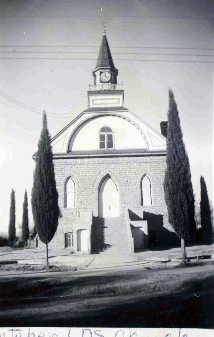 The Ward Clerk was Delbert Taylor. About the only thing I remember about my baptism and confirmation is that I was wearing a white dress and that I was baptized in the font of the old Thatcher Church/Stake Center. It recently burned to the ground.
The Ward Clerk was Delbert Taylor. About the only thing I remember about my baptism and confirmation is that I was wearing a white dress and that I was baptized in the font of the old Thatcher Church/Stake Center. It recently burned to the ground.
MY PHYSICAL DESCRIPTION
I had very dark-brown, straight hair, hazel eyes and a straight nice nose until a cow ran over me and rearranged it some. I was bouncy and full of energy and ready to
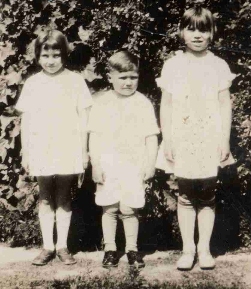 sample all of life's goodness. One of my teachers said I never walked anywhere as I either ran, skipped or danced my way through life. When young, I had lots of freckles and my brothers teased me and called me an old turkey egg. I’d come up fight'en!!!!!!!!!!!! Thank heavens I finally out grew them in my teens, but then came pimples.
sample all of life's goodness. One of my teachers said I never walked anywhere as I either ran, skipped or danced my way through life. When young, I had lots of freckles and my brothers teased me and called me an old turkey egg. I’d come up fight'en!!!!!!!!!!!! Thank heavens I finally out grew them in my teens, but then came pimples.
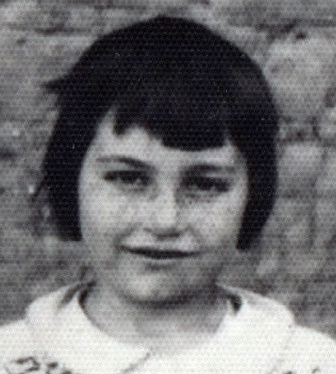 I hated them, as I’d much rather had dimples and en- vied girls who did. Now at 67 years of age I have brown spots and wrinkles. I’m a short 5’ 1 &1/2” tall and weighed 105 pounds when married and now weigh 125 pounds. It could be put on my headstone. “Here lies Hester E. Brimhall, dieting at last”.
I hated them, as I’d much rather had dimples and en- vied girls who did. Now at 67 years of age I have brown spots and wrinkles. I’m a short 5’ 1 &1/2” tall and weighed 105 pounds when married and now weigh 125 pounds. It could be put on my headstone. “Here lies Hester E. Brimhall, dieting at last”.
CHAPTER 2: MY MOTHER - ARMELDA FERGUSON DAMRON
MOM’S PHYSICAL DESCRIPTION
My Mother was rather tall--probably five feet six or seven. She was thin all of the time that I was growing up. She was sort of "raw boned," as people used to describe it. I remember that she had sort of bucked teeth that crossed in the front. That was a predominant Ferguson trait. My grandfather's teeth crossed in the front, my Mother's teeth crossed in the front, my sister Armelda's did and my brother Ray's did. When one of my daughters was born, Sylvia Ann, and started growing up her teeth started crossing in front. We had to have orthodontic care for her. Also, my grand daughter, Christina Brimhall Stewart’s teeth were bucked and crossed in front. She also had to have braces.
MOTHER WAS FROM KENTUCKY
My mother’s family came to Thatcher from Kentucky. In 1976, Mother told me the following stories about her life and that of her family, the Fergusons.
“The name given me at my birth was Armelda Ferguson. The place I was born is Lawrence County Kentucky in 1884 February 6th. Ma’s name was Sarah Ann Skaggs and Pa’s name was William Ambrose Ferguson.
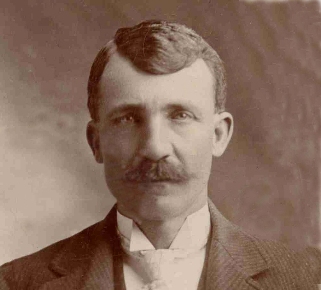
|
My Grandmother’s name was Sarah Gillum and she was born in Elliot County and my grandfather’s name was Lewis L. Skaggs and he was born in Lawrence County Kentucky.
Ma married my dad when she was young. She was a big woman about 5”8” tall. She had bright blue eyes and long black hair and lots of it. She was such a happy woman, who sang a lot. She had five
children, Laura, Armelda (me), Mary, Hulda and Henry.
Pa was a wonderful, hard working man and very handsome with dark, thick hair and a mustache. He had an adventurous spirit and was brave and courageous.
We lived in a log house that had a big front room and a large kitchen, but no bedrooms or bath. There was a fireplace in both rooms made of rock. It got mighty cold there, and if we wanted to, we could burn wood in both rooms as it was plentiful. We cleared off the land to cultivate, and that gave us our wood. When we wanted to go to the bathroom, we just hunted a spot in the woods or a gully and wiped on leaves. Nobody knew about outdoor toilets then.
Sometimes when we wouldn’t have a horse to farm with, we borrowed Uncle Link (Melvin Porter) Ferguson’s mules. He was my dad’s brother. His wife’s name was Rindy (Rinda) Fyffe and her father was Merida. They just lived through a field from us. We had other relatives there such as Aunt Sebra Elizabeth Skaggs who was married to John Milton Skaggs. We called her Aunt Seeb. Some of their kids were Ressie, Sarah, Dave, Elzy and Nianza.
When I was about six I went to Keaton School. I wore wool clothing that my mother had made. First she spun all the material for all our clothing from sheep's wool that I helped Dad sheer. One time my cousin came to watch us sheer the sheep and while we were walking to the house, she was swinging the sheers, which were very sharp, and the end stuck in my leg just above the knee. For months my leg was stiff and I could hardly walk. Because of being pretty stove up, Dad allowed me to get 10 duck eggs and nine of them hatched. A mud turtle got one, so I raised only eight. I finally got tired of them and traded them for guinea hens. About this time we moved to Morgan County and we went to school there awhile. We also moved to Johnson County and finally we went back to Lawrence County.
When I was seven years old Pa had cut down a beech tree for fire wood and Laura and I were gathering the chips. All of a sudden Laura started screaming, “Run! Meldie run, it’s Lee Prince’s old mean pig, and he’s coming down the lane and he’ll bite us!” And she ran towards the house. The pig was big and contrary but instead of running, I took a handful of chips and started pounding on her head and she really got mad and knocked me down and mauled me and bit the back of my leg up pretty bad. Later on the Princes killed this pig and sent us a shoulder, as was the custom in those days. When I tasted that meat, I swear it was the best I ever ate.
Laura, Mary, Hulda and me learned to milk the cow. In those days the women did the milking. We had an old gentle cow and she was kind of blue and white so we named her Frosty. Mother would milk, then we girls would strip a pint tin cup full and by taking turns under mother’s supervision we all learned to milk.
Laura was mothers helper in the house, and being as I was next in line, I helped Dad in the fields and outdoors. Henry was the only boy and too young to help. I worked right along side of him by grubbing corn which was our principle crop. We had to rotate the fields and the one would have to be cleaned the following year of sassafras and young chestnut growth. First I’d drive a yoke of oxen while Dad held the plow and I used to help plant the corn and always, I did the string beans which were planted in the same hill as the corn. We raised enough beans to sell and bought clothes with the money. We also raised sugar cane and made our own molasses.
When we were older our cousins used to come and we’d go exploring in the mountains close by. We went to a place called Raven Rock where there were caves made from over hanging rocks. The squirrels and chipmunks would gather nuts and bunches of grapes so we would get long sticks and scrape them out from under rocks. There would be beautiful bunches of wild grapes and meaty nuts making a wonderful prize for us. We also gathered what we called mountain tea, but is called wintergreen now. There was beautiful bright persimmons, and the paupau’s were shaped like a kidney that grew green, then yellow, and when ripe turned brown, then black when spoiled and smelled from far off. Also beechnuts, walnuts that were black and tan, hickory nuts, wild cherry trees, hazel berries and many more were everywhere.
Together we explored the pleasures nature offers the young, lazing away hot summer days under our favorite dogwood tree. We’d roam the Kentucky woods in search of all these wonderful prizes. Our Dad and uncles would possum hunt through the long winter nights with their favorite possum dog. Most times we could hear their barks, high pitched, rapid signaling they’d located their prey. Our hearts would leap with excitement of the coming day break and return of the successful hunters. Dad liked coon, but Ma favored possum.
May apples were so delicious. The sarves trees grew everywhere. When we were working in the fields we would stop to rest under their lovely, spreading branches. We kids would go climb the trees and eat the berries. One tree was our favorite and was especially tall and all the branches were eight feet high from the ground. Both my sisters and uncle tried to climb it and so did I. The bark was smooth and white and difficult to climb. I was the first to finally make it up and my uncle John Ed said, “If Meldie can climb it, by golly, so can I.” And he did but it took him three more days of hard trying for him to accomplish it.
One day Mary and Laura was sitting under this tree and I was up in it. I’d break off small limbs loaded with delicious sarves berries and throw down to them to eat. They were really gobbling them up when all of a sudden the limb I was sitting on broke and I fell out of the tree and landed sitting down right between them. We were all so startled then we just laughed our heads off.
We churned butter every day and never drank sweet milk. We always had buttermilk that was left after the butter was formed. We never knew what light bread was. We always ate hot or cold biscuits and corn bread. Grandma Ferguson occasionally made either sour dough bread or salt risen.
We made our own lye from ashes for soap making. All winter we would save the ashes from the best wood. Then when March came we would have a soap making festival with all the relatives and neighbors. We would first pour boiling water over the ashes and then cold water. The seep that came from the ashes was pure lye. During the winter the entrails of the butchered pigs were split and washed and hung to dry for later consumption. All the pig’s meat drippings (lard and grease) were saved and all this would go into a big iron pot with the lye water. After boiling and cooling, there would be a thick, soft soap. Enough would be made and stored in a barrel to last a whole year.
As Laura and I went into the woods one day that were near our home, saw a large hornet’s nest under a little beech tree. We were supposed to be gathering fire wood. I got a stick and started poking the nest just to see what would happen. Laura told me that I shouldn’t do it, but I was a dare devil and did it anyway. She grabbed her fire wood and ran for the house. The hornets came buzzing out from their nest and covered me with their stings. Boy! did I ever jump and scream and holler. You could have heard me in the next county.
We ate mostly things we had raised or grown in the garden. We killed about two pigs a year and ate vegetables, fruit, chickens, ducks, geese and sometimes turkeys and eggs. We farmed corn, cane, potatoes, onions, peanuts, tobacco, beans, squash and sweet potatoes. We also raised oats and fodder for the stock. We had lots of beehive boxes and sold honey and molasses. We made our own brooms out of broom grass that was plentiful. Also raised and ate a lot of popcorn and string beans.
The country we lived in was hilly and heavily wooded in places. A little creek ran near our house, and we played in it a lot. In late summer it would go dry in spots and even the deep dug wells would get low.
Ma sent Mary and me to the store to trade a hen and some eggs for sugar and oatmeal. We were riding a horse. I was in the saddle and Mary was behind me. The old hen let out a big squawk and scared the horse and he pitched us both off. Mary wasn’t hurt, but I had some broken ribs and my arm was dislocated. I was so bunged up I couldn’t work in the fields for the rest of the summer.
Ma got real sick and Dad took her to a doctor and he sent them to Louisville for Ma to have an operation. They removed a 60 pound tumor. It was in a big sack of liquid and in it was black hair and teeth. They said it probably started out as a baby and then the tumor took it over. It was displayed in a medical college in a five gallon glass jar of alcohol and was called an ovarian cyst. She hadn’t felt well for a long time and no wonder. She got better and was her old self again singing around the house and weaving linseyl-woolsey for all our clothes. Then the dreaded tumor came back and she became rapidly sick, but refused to be operated on again, because it would cost our home. Ma didn’t want dad and us kids to be homeless. She suffered great pain and swelled up tight as a drum and burst. Dad dressed it with warm, soapy water each day and pressed clean white cloths to it to try to keep it dry, but it oozed all the time. It was summer and we didn’t have screen doors, so someone had to stay with her all day to keep the blow flies away. She got constipated and begged us to dig out the stool. We didn’t know about enemas then. She was sick so long that all our food was about gone to feed the people who came to help us with her. I was eleven years old when she died. She was buried way up on a hill on Grandpa Lewis Ferguson’s farm in Lawrence County Kentucky.
About two years after Ma died Pa married Hannah Boggs. Soon after the Mormon Elders showed up in our area and my sister Laura was converted to the LDS Church through the teaching of the Elders and reading Orson Pratt’s works. Then Pa, Mary and I joined. This was around 1898. Hulda was baptized a year later as we left Kentucky for Arizona. Henry, being too young at the time, never was baptized or joined the Church. Laura wanted to get an education and be a school teacher, but Pa said she either had to get married or come with us to Arizona. So she stayed in Kentucky and married Millard Fyffe and later came to Arizona.
When we left home for Zion it was in the month of July. There was Pa, myself (I was 15 years old), Mary 13, Hulda 11, Henry 8 and Eda (Edie), who was our half sister, was 2 years old. Hannah didn’t come because she had Nancy, a five month old baby. That left Mary and me to carry the load as mother of the family in Arizona. The trip took us two weeks on the train and whenever it stopped, Dad would get off and get Edie a cup of milk. She was weaned, but couldn’t go without milk. Dad bought tickets to Mesa, but by mistake they forgot to have us get off and we ended up in Wilcox. Dad didn’t like the looks of the place so we rode our tickets as far back as we could and they put us off in Thatcher. We were anxious to get somewhere with the Saints, because the missionaries had told us how wonderful it would be. But to our great disappointment we found these people weren’t any better than our dear home folks and friends we’d left in good ole’ Kentucky.
When we got off the train Pa had less than five dollars in his pocket. We camped under the cottonwood trees and some folks felt sorry for us and lent us a fry pan to cook on. Next day Dad got out and found us a place to live and I went to work doing house cleaning for people. Some of them were more than kind and others took advantage of us newcomers. Old Grandma Ray charged us 10 cents for a quart of milk when we later found out everyone else was charging 5 cents a quart. We switched to Mrs. George Hoopes to get our milk for 5 cents a quart. Her husband was on a mission and she needed every penny she could make. Mary and I washed for people for 25 cents a day and Pa saved up his wages of $1.50 a day. The following December he sent for Hannah and baby Nancy to come from Kentucky.
Hannah had to follow Pa to ranches and goat camps. She met very few people and life was hard for her. The country was desert and far different from the lush fields and lovely trees of her Kentucky. She had very little chance to make friends and had another baby, Sarah Ann. She finally came to coaxing Pa to return to Kentucky. So, he saved enough money to send Hulda back with some relatives and he borrowed enough money later on to send Hannah, Henry, Nancy, Sarah Ann (whom we called Sadie), and also Edie. Then it took Pa almost a whole year after this to square his debts and save enough for a ticket for himself. Then he told me I either had to get married or go home with him. But he just had barely enough money for his ticket and I knew it, and besides I didn’t want to go back. I could make more money here and not have to work as hard.
Before leaving Kentucky I remember how heroic and wonderful I thought my Dad looked as he stood on cross ties and bore a fervent testimony of the gospel of Jesus Christ. He was a handsome and loving father. After Father returned to Kentucky Hannah had twin boys, Truman and Norman. After awhile Dad and Hannah were divorced and Dad returned to Thatcher, as did many of my brother and sisters. Dad married again. Her name was Mary Jane Donnels and they had four children. Dad died in 1932 in Thatcher and Aunt Jane (Mary Jane Donnels Ferguson) died in 1939 in Phoenix, Arizona and was buried in Thatcher.
I married Joseph Vernon Damron the 17th of November in 1903 in Thatcher. I was 19 and he was 29 years old.
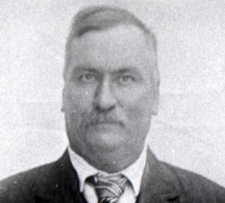 We moved in with his folks for three months and I learned to love them.
We moved in with his folks for three months and I learned to love them.
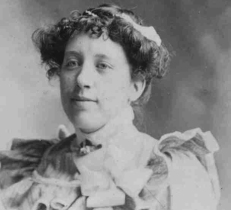
|
Armelda Ferguson Damron at 19 |
We moved to ourselves in Thatcher, then to Central where
Armelda was born, and then back to Thatcher after suffering many difficulties such as the Gila river flooding and washing our farm land away, our horse dying, our house burning, etc.”
MY MOTHER’S ROLE
My Mother's role in our home was very predominant because my Father was sort of easy going and took things as they came, so she took over as the head of the household. She was very strong-willed. She had to be, so that we could survive.
MOM’S PERSONALITY AND COOKIES
The personality and characteristics of my Mother were that she was a very calm, sweet and an enduring person. She was compassionate, loyal and kind. Her hair coloring was dark brown, and she had bright blue eyes. She was talented in bread making. She made beautiful molasses cookies that were as big as hot-cakes which she always stored in a round wooden bread basket. It was sort of like a barrel made out of slats with wire around it. It had a wooden top that would slide underneath some holes near the top. It was airtight and was perfect for molasses cookies. It was wonderful to come home from school and be able to go get a big ole’ molasses cookie.
CHURCH & WORKING WITH MOTHER
What I enjoyed doing with my Mother was walking to Church. We'd talk as we walked to Church. I enjoyed working in the kitchen and washing the socks on the washboard. I'd help her candle the eggs and decide which one had a little baby in it and which didn't.
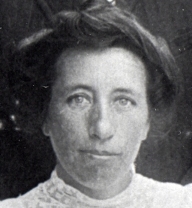
|
|
Armelda Ferguson Damron 1908 |
We always enjoyed canning fruit together. It was nice to go to the cotton fields and be with your parents. She used to play jacks with us girls all of the time. We'd get up on the kitchen table and play jacks by the hours, and she could really play. Also, about twice a year all the family would go up and clean the family grave lots. We enjoyed doing that and making them look nice.
MOM’S QUILTING
My Mother was a wonderful quilter and in fact she was a master quilter. People from all over the country would come and hire her to make quilts for them. I remember when she was in her eighties, one winter she quilted 25 quilts. Some of them were king-size, queen-size and doubles. We figured it out one time and she made $.25 cents an hour quilting.
WASH DAY
Wash day was every Tuesday, and I knew every Tuesday when I came home from school that we were going to have beans and hot bread for dinner. That was our washday meal, and it sure was good. Sometimes we even had corn on the cob with it. In those days, people didn't have money. It was depression years and so you made do with whatever you had. Whenever my Mother got through washing the clothes, the floors were mopped with the last rinse water and it would have quite a bit of soap still in it. We would wash and scrub all the floors like this on washday and everybody was always tired when this day was over, especially my Mother.
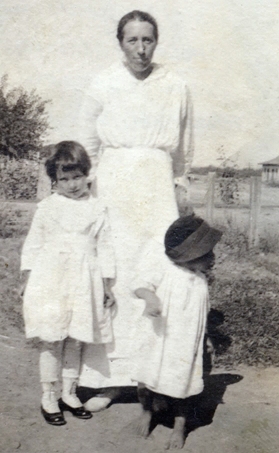
|
(L-R) Hester & Armelda Damron |
HATCHING CHICKENS & PICKING COTTON
My Father never worked out in the public. The only thing that I ever remember him doing was hatching the chickens in the adobe chicken hatchery that we had built behind our house. My Mother would get out and pick cotton to bring extra money into the home. We would hoe cotton until it was mature and then we would pick it for farmers. My Mother was a real good cotton picker and she could make $1.50 a day by picking 100 pounds of cotton. I can remember when I was very little, I would go to the cotton fields with her. We would take our lunch in a lard bucket with a lid on it. Our lunch would usually be deviled ham sandwiches, boiled eggs and pickles. I couldn't eat deviled ham for a long time after this because the lunch would get hot in the sun and not smell to good by the time we ate it. We'd open the lunch bucket and the smell of those sandwiches would come up very strong.
NAP ON COTTON SACK
I can remember when I was small that my brother Jack and I, would get tired of following our Mother up and down the cotton rows. It would be time for our naps. She couldn't quit picking because she needed to make the money while she could and so she'd let us lay down on her cotton sack. The sack was 6 to 8 feet long and about 2-1/2 feet wide. There was a big strap that went over the shoulder and down under the other arm. There was an opening in the top part of the sack. You'd pick and put the cotton in this opening. All of the sacks were made out of heavy canvas. A cotton filled sack made a good bed. Either Jack or I would lay on the bottom of the cotton sack while she'd pull us up and down the rows as she picked cotton while we took our nap.
MOM’S BUTTER
My Mother made the best butter. It was just simply delicious. We'd save the cream for a week at a time. We had this big crock-like churn that we used. She'd warm the cream to a certain temperature and then we'd put the cream in that churn. It had a dasher with a round thing that fit inside the crock. You'd take hold of the handle and dash that thing up and down until it made butter. Then she'd pour the contents out into a big bowl. There would be buttermilk and little pieces of butter. She would put salt on the butter and work out all of the water. The remaining butter was a beautiful golden color. She had a mold that was made out of wood. It was hinged and it would make a perfectly square pound of butter. I remember that she would use wax paper. She would take the butter out of the mold and put it down on this wax paper. She would wet the wax paper and fit it around the butter.
JACK & BUTTERED BISCUITS
We would then sell the butter. This helped us to buy our clothes and things like that. That butter was so good on hot bread that she would just take out of the oven!
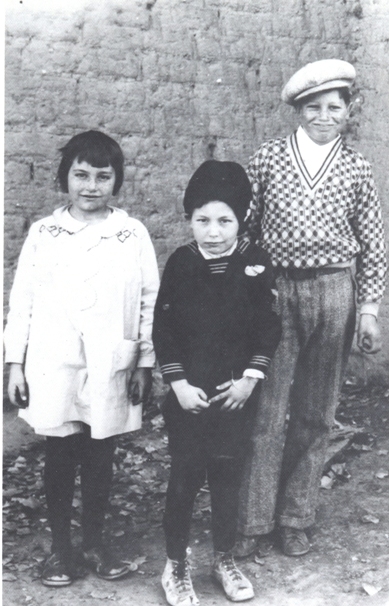
|
(L-R) Hester, Jack & Chet Damron 1927 |
She would make these great big biscuits. We’d would put this homemade butter on them and just eat them up. They were so good! I can remember that my little brother Jack's favorite thing was for my Mother to stand at the oven door, take out a great big biscuit that was, oh, about three times as big as the biscuits that we make now days, and toss it to him so he could catch it. He thought that was the neatest thing. We always teased him because once in a while he missed, so we really razzed him.
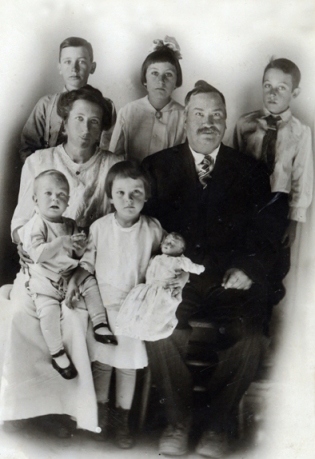
|
The Joseph & Armelda Damron Family 1924 |
HONEY & BEEHIVES
I can remember every year my Mother would go with my grandfather out to where he had land and his beehives. They'd take the honey out of the beehives and extract it. I can remember that she'd come home with her lips all swollen up with bee stings all over her, but I never heard her complain. I can remember all of us being so excited to get fresh honey. We thought that the honey comb was very delicious. We'd chew it like gum until we got all the honey out of it before we'd spit it out.
COMPANY AND CHICKEN TO EAT
We had lots of company come to our house and my Mother was very efficient. She would go out into the chicken pen, catch one of the chickens and cut or wring its head off. Then she would dip it in hot water, hang it up by its feet with a wire on the clothes line and pick all of the feathers off from it. Then she would take a page from the Sears and Robuck Catalog, set it on fire and singe all of the little fine hairs and feathers off from the chicken. Then she would take it in the house, cut it open and take all of the entrails out. She would then cut it into pieces and fry it. She was the best chicken fryer! I don't know how she made chicken taste so good! Whenever we had company, she'd go through that rigmarole. We always had fried chicken, mashed potatoes and gravy, a salad, peas or corn, and usually vanilla cake for desert. Everybody loved to come to our house because her cooking was excellent.
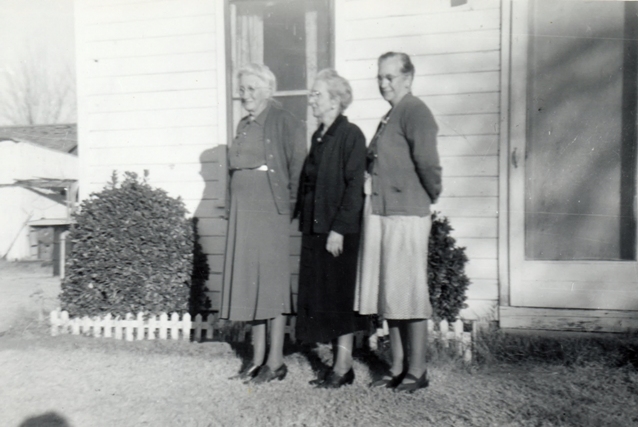
|
Armelda Damron & Two Sisters 1961 |
I SPILL THE CREAM
Saving the cream so that we could make and sell the butter was a very important thing in our family and was something that we all knew had to be done with great care. We'd milk the cows and then mama would put the milk in a pan. We didn't have a refrigerator like we do now days, but we had a cooler door that opened to the outside where it had shelves and was screened. My Father put gunny sacks over these screens. We'd keep the gunny sacks wet all of the time. That is how we kept our milk, our butter and stuff like that cool. Back to the milk in the bowl. When the milk formed a rich yellow cream, my Mother would skim it off and put it in a lard bucket. After she had saved all of the cream for about a week, she'd put it on the back of the stove so that it would heat up to the right temperature so she could make butter out of it.
This one time, when I was in the kitchen with her, she told me, "Hester bring me the cream now because I have the churn all scalded out and clean. It is time to make the butter." She carefully explained to me to put my hand underneath the bottom of the bucket. When I got over by the stove, it felt kind of hot so instead of doing as she had told me, I took hold with my finger and my thumb and held on each side of the bucket. As I started to bring it over to the kitchen table where she was getting ready to churn, the whole bucket of cream slipped out of my hands and lit on the floor. Cream just went everywhere; all over the stove, all over the cupboards, all over the table and chairs, all over my Mother's feet and legs and all over me. There was our money all down the drain for the next week. We would not be able to buy many groceries because I had spilled the cream. I was just heart broken, and I started crying and saying, "Mama Mama, I didn't mean too, I'm sorry, I'm sorry!" I thought sure that she was going to spank me because I didn't mind her; I didn't do what she told me to do. I didn't put my hand under the bottom of the bucket.
She stood there and looked at me for a minute, and then she took me in her arms and she said, "I know you didn't mean to. I'm sorry too, but let's just get it cleaned up and forget it. I know you won't ever do it again." That was such a kind, Christ-like way to treat a situation like that. I have never forgotten it.
MY MOM LIVES WITH US IN WINSLOW
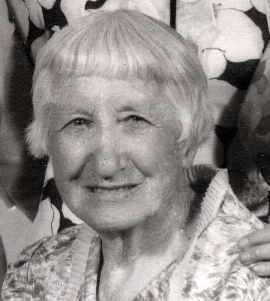
At 92 years of age my Mother couldn't live alone anymore because she couldn't remember to turn the gas burners off on the kitchen stove when she finished cooking and she couldn't bathe herself because she couldn't get in and out of the tub. We brought her home to Winslow, Arizona to live with us after Ray died.
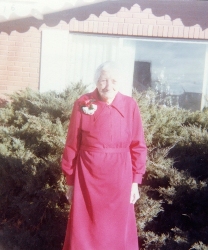 She lived to be ninety-nine years old (lacking three weeks). I love my Mother very much. All the time I lived away from home after I was married, I wrote to my Mother every week. I called her often after we had built her a new house and had a telephone put in. I felt that was one way I could show her how much I loved her.
She lived to be ninety-nine years old (lacking three weeks). I love my Mother very much. All the time I lived away from home after I was married, I wrote to my Mother every week. I called her often after we had built her a new house and had a telephone put in. I felt that was one way I could show her how much I loved her.
CHAPTER 3: MY FATHER - JOSEPH VERNON DAMRON
PHYSICAL DESCRIPTION OF DAD
My Father was a jolly person. Dad stood about 5’ 10” tall, with a stocky build. He had brown hair and dark brown snappy eyes, like most of the Damrons do. He was rather short for a man and of stocky build. He wore bib overalls all the time, with a long-sleeved shirt, winter or summer. His small size 8 feet were covered with brown, ankle-high work shoes, and a red bandanna handkerchief hung from his back pocket.

|
Joseph Vernon Damron 1925 |
His dark hair was sprinkled with gray. He had a real thick mustache and I can remember he would sit by the fireplace and spit tobacco into the flames and would they sizzle! Sometimes he’d miss and where he’d sit by the fireplace was always a little off color. One of my jobs was to get soap and water and wash it clean. I didn’t appreciate that one bit. He was jovial and had a good sense of humor and everyone liked him. He was friendly and concerned about people. All his friends called him “Paddy” which is an Irish name. He was good natured and mild most of the time, but fiery when pushed too far. He could never hold his temper once he let go of it. He was a carpenter, but rarely worked outside the home. He made all of our little rocking chairs and all of us kids little straight backed chairs and tables to play house with. He was a good, decent Father who loved us children.
DAMRONS COME FROM UTAH
My family goes back a long way in Arizona. My Mother came from Kentucky to Arizona. My Father, Joseph Vernon, came as a child with his family from Mormon settlements in Deseret, Utah. Besides my Father, there were seven brothers and four sisters and their father and mother when they left Kanosh, Utah in 1882. They came in three covered wagons trailing a milk cow and a few extra animals. When they approached the Colorado River they had to fasten and drag a log behind each wagon to hold it in check in its steep descent to the river. To cross the river, the wagons were placed on barges made of logs. The horses swam the river. When they finally arrived in Pima, Arizona, they lived in tents for six months. The children attended schools in Utah and Pima. Schools were organized as soon as the settlers arrived in any area as they were education minded. My grandfather, William Wallace Damron, taught school in Kanosh, Utah and so was pressed into that position wherever they lived. He was the first U. S. Post Master in Thatcher. It was combined with a mercantile store that he owned.
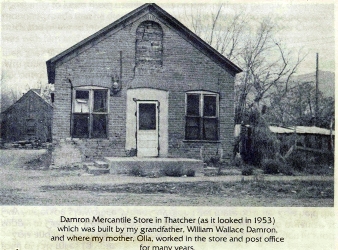 He was prominent in politics and was a well respected person. I can barely remember my Grandma Hester Elizabeth Ray Damron, for whom I was named. I do remember that she was blind, heavy set and passed away from cancer of the lip and face. We always had to be very careful when we went to visit as she had candy for us and we were taught we must wash it before we ate it.
He was prominent in politics and was a well respected person. I can barely remember my Grandma Hester Elizabeth Ray Damron, for whom I was named. I do remember that she was blind, heavy set and passed away from cancer of the lip and face. We always had to be very careful when we went to visit as she had candy for us and we were taught we must wash it before we ate it.
WILLIAM WALLACE DAMRON, MY PATERNAL GRANDFATHER
I found this newspaper article in my Mother’s trunk about my grandfather.
THE BULLETIN PUBLISHING COMPANY publishers G.H. KELLY AND W. B. KELLY
1897 GRAHAM COUNTY. ARIZONA TERRITORY
W. W. Damron
This well known citizen and public officer of Graham County, went from Texas to Salt Lake City, Utah in 1855. There he engaged in farming, teaching school and clerking in stores. Being raised in the south, he was never satisfied in a northern climate and he immigrated to Arizona. He arrived in Pima, Graham County, on the 25th day of November, l883, when this valley was but little more than a desert wilderness. Mr. Damron was quick to see the grand possibilities of such a favored land and he was impressed with the belief that here would be “The Oasis” of Arizona. Since his arrival in Graham County he has engaged in farming, teaching school and merchandising. Besides holding various public offices, the duties of which have been faithfully and satisfactorily discharged, he has always taken an active part in public affairs, standing always firm for every measure that looked to bettering the condition of the poorer class. Mr. Damron was elected county treasurer in 1888 and again in 1890; in 1892 he was elected probate judge, serving two years, and he was elected again to that office in 1896, being the present incumbent. He is an old-time Jeffersonian Democrat and his council is sought on all party matters. W. W. Damron & Sons also keep the Post Office in Thatcher.
DAD AND PIMA CATTLE STORY
Now, back to my Dad. What a fantastic story teller my Dad was. If it wasn’t exciting enough to suit him, he would just change it and make it the best story in the whole world. He’d tell me stories about when he was a young boy growing up. One of these I remember so well is just after he came with his parents to Pima from Utah. The people were living sort of like the United Order. Everybody helped everyone else. This day it was his turn to take care of the little town of Pima’s cattle. He had to herd them up into the hills by the big canal. We always called the canal the big ditch even though it was a nice sized irrigation canal running through the whole valley.
The Apache Indians were on the warpath at the time and he was a little anxious, but it was his turn and he had to go anyway. The cows had only wild grass to feed upon. I don’t know how old he was, but I figure he was about eleven or younger. He said he was quietly herding the cattle when all of a sudden he could hear the thunder of horses hoofs so he ran to the top of the hill. Crouching behind a tree he looked down onto the plains. There was a large band of Indians coming at a rapid pace with their horses with faces painted for war. It frightened him so bad that he didn’t know what to do for a few seconds. Then dashing down the hill at breakneck speed he scattered the animals so the Indians wouldn’t take all if they came upon them. Making a wild dive into the slow running canal he jerked up a reed similar to bamboo.
When the Indians topped the hill and looked down on the river they knew he was there because they saw the cattle. With excited yips and yells they started looking for the herder. He hid under some overhanging branches in the water. Soon they were getting closer and closer. He heard them leap off their horses and start walking up and down the banks of the canal calling back and forth to each other. His heart was beating so loud he knew they would hear it so he raised the reed to his mouth and slid under the water. He breathed through it knowing it was now or never and his only chance. It wasn’t long until they got discouraged and went to round up the cattle. When he eased up out of the water he was still under the protecting branches. Though they didn’t find him they did take most of the town of Pima’s cattle. He felt lucky he escaped with his life as these were the most warlike tribe of Indians in Arizona, The Apache.
DAD & HET COMBING HAIR
Early morning by five you could find Dad in the living room by a big fire he had built to warm up the house. Sometimes I’d wake up and go sit with him to visit and talk. Pretty soon he’d say. “How about combing my hair Hester?” I’d scurry and find the fine tooth comb with teeth so small and hurry back to his rocking chair. The rocker had curved arm rests and curved seat.
He didn’t have much hair, but enough that he enjoyed me combing and scratching his scalp. He'd tell me stories about when he was a young boy growing up. We’d just have a good, quiet time together.
DAD CARVED TOYS FOR ANOTHER FAMILY AT CHRISTMAS
I recently received a letter from a friend named Edna Curtis who was raised in our little town. She said she remembered when her parents were killed in a car accident and they had to go live with their grandmother in Thatcher. She said one Christmas they were so poor they knew they wouldn’t get anything for Christmas. But here came my Father with toys for all of them that he had carved out of the cottonwood limbs that grew on our ditch bank. She said she would never forget how happy this made them. He also carved tops out of Mama’s sewing spools for many of the children in our little hamlet. I can remember he would cut the spool in two and carve one half of it into a point and then he’d make a dowel and put it into the hole of the top. We could turn these tops and they would really go. They were so well balanced that they would spin and spin. He also could make the kind that, with a length of strong string twisted around it, you could throw it out onto the floor and it would go like sixty!
DAD &OLD BUCK
Dad had a horse named old Buck. He was born near the same time as my brother Jack. My Father got very attached to Buck because he was such a nice animal. He was a beautiful buckskin of heroic stature with a golden mane and flowing tail. My Father took excellent care of him. He groomed, brushed and watered him every day and saw that he had fresh. green food and hay in the winter time. He was really a good horse.
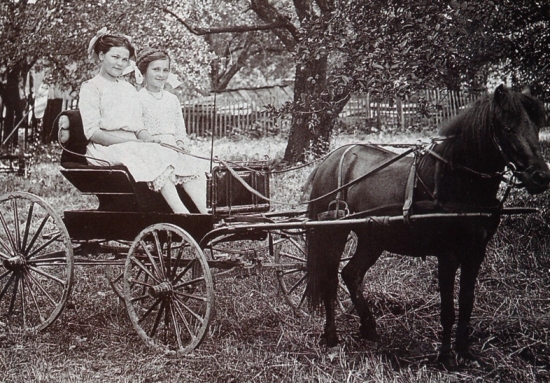
|
|
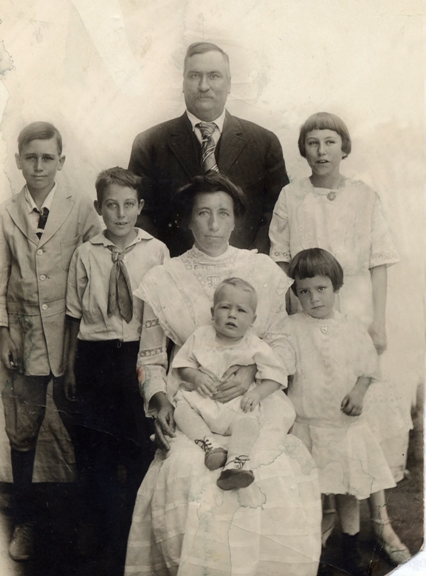
|
The Joseph & Armelda Damron Family 1924 |
DAD & OUR BUGGY
I must tell you about the buggy that Buck pulled. It was our only mode of transportation. It had two stays on it that fit into a harness and then it had a bed with a seat that two people and, maybe three if you crowded up, could sit in. In front there was a little panel that came up and had a slot that you could put a whip into.
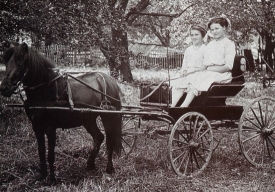 This whip had a wooden handle that was wrapped with leather and had on the end a braided length of leather about six feet long. Dad would snap the whip over old Buck when he got too proddy and slow, so that he’d perk up and go faster. In the back of the seat there was a little box-like bed. Lots of times I’d stand back there when I was small and lean over the seat and visit with my Father rather than sit up on the seat with him.
This whip had a wooden handle that was wrapped with leather and had on the end a braided length of leather about six feet long. Dad would snap the whip over old Buck when he got too proddy and slow, so that he’d perk up and go faster. In the back of the seat there was a little box-like bed. Lots of times I’d stand back there when I was small and lean over the seat and visit with my Father rather than sit up on the seat with him.
DAD & SUN FLOWER STORY
When he was in the hatchery business he would go across the Gila river to collect eggs from the farmers and he’d let me go with him. We’d drive down those dusty lanes and it would be so pleasantly warm and hazy like. To enhance the beauty of the scene both sides of the lanes would be lined with tall, wild sunflowers. Sometimes he didn’t talk much and I’d begin to feel anxious and then he’d say something nice and I found that one kind word can warm three winter months. At times I’d get bored and I’d say, “Dad get me a sunflower so I can see if someone loves me today.” Out would come his whip and in one movement he’d whirl it over his head flashing out with the speed and accuracy of a snake. Around a unsuspecting sunflower plant it would wrap and back he’d jerk and I’d have a handful of golden yellow flowers with charming black eyes for their center. These bright sunny flowers were plentiful and the humming of the bees in the background added to our wonderful day. I’d then play the game of, “He Loves Me, He Loves Me Not” until all the petals had been pulled out one by one. I’d think about someone I really liked and I’d be so thrilled when it came out that he loved me. I still love sunflowers! Von took my picture by a field of them near the San Francisco peaks in Flagstaff a few year ago. Every time I see a sunflower I think of my Dad and those wonderful times together so many years ago.
DAD & BUGGY RIVER CROSSING STORY
The Gila River is nothing but a dry bed most of the time except in the rainy season, but when we were crossing and going over it to get eggs from the farmers on the other side it could be a raging, dangerous flood river.
The season had come for my Dad to cross the river and buy the eggs at an appointed time. The river was in full flow and he didn’t know what to do. He had to have the eggs as it meant our bread and butter for the coming winter. We stood on the sandy banks of the river smelling the wet tamaracks and wondering how we could possibly get across the muddy water rushing by so swiftly. Finally we drove up and down the side of the river until Dad decided that he had found the shallowest spot for a crossing.
The whip cracked over old Buck’s back and I remember going off the bank of that river without a road or anything to guide us, and how the bank kind of crashed in and the sand melted away into the river. Buggy, horse and people landed in the dirty rushing water with a crashing splash and we hadn’t even made it a few yards when Buck had to start swimming. I could feel the fear rise up in my Father as neither of us could swim. I started crying and he told me. “Don’t cry, don’t cry .” Then he laid the whip on the horse and he swam as hard as he could and being large and strong soon came close to the other bank. His feet touched the bed of the river and up, up the far side we climbed to safety. As soon as we stopped my Dad got out of the buggy and went up and put his arms around the neck of our hero, old Buck who's sides were still heaving from the great exertion he’d had to put forth to bring us to safety. How grateful we were and how thankful I was that Heavenly Father had let us get across that dangerously flooded stream.
After we gathered the eggs from the farmers, we went all the way around on the river road to Pima to cross that wide expanse of water on the bridge. It was the long way home, but we didn’t want to swim the river again. This was a very exciting day because our return route took us down Webster Lane to visit with Uncle Oscar Webster and Aunt Ollie and we told them about our adventure.
On this route home we had to cross the railroad tracks. My Father was already nervous so when we got to the tracks and he heard the train whistle, it frightened him. I was standing in the back of the buggy leaning over the seat and when he whipped Buck. It startled Buck and he leaped forward. I wasn’t holding on very well and it threw me out of the buggy falling onto the railroad tracks, cutting my chin wide open. I carried a scar underneath my chin for years. My Dad finally got Buck calmed down and rescued me off from the tracks. About that time the train flew by with the whistles blowing. I can remember sitting in the buggy with Dad’s big ole’ red bandanna handkerchief under my chin because it was still bleeding. I was embarrassed because I had the handkerchief up to my face as we trotted through the main street of Thatcher. Can you imagine how glad we were to get to our cozy, humble home again after all the excitement of that long day.
DAD, BUCK & SHOPPING
Buck was important in our lives as Dad used him for many other things besides transportation. He’d hitch him to the plow and make our field ready for planting and also the large garden we raised each year. We lived off our fruit trees and the garden winter and summer. Mama would search through the valley newspaper called “The Graham County Guardian” and make out a grocery list of food on sale. Dad would hitch up old Buck and go to Safford to purchase the groceries. He had to go to all the different stores to pick up the items on sale. Mama would give him just enough money to get each thing. I recall he always had a little money hidden someplace and whenever he was shopping he’d buy peppermint candy sticks and cookies in a big tin can. The cookies were yellow, pink and white, made of marshmallow with coconut on the outside of them. They looked like fluffy clouds. They did taste heavenly and whenever I could, I would coax Dad out of one. He kept them hidden in the hatching house for his private snack. Sometimes I’d get to go in the buggy with him to Safford. He was so jolly. He’d stop and visit with people on the street and everybody would say, “Hi, Paddy, (his nickname) how are you doing today?” I was proud of my Dad because so many people liked him.
DAD & BUCK DIES
Old Buck died when I was eighteen years old and when he died my Dad had to get a friend to come in his pickup and drag him away. I guess he died of old age. I can still see my Dad standing outside in his blue bib overalls with his big ole’ red bandanna to his eyes, tears just rolling down his cheeks as he bid goodbye to his dependable friend. It was a sad occasion for us all. Dad was tender hearted and he loved that old, faithful horse.
DAD AND ARTICLE ON SHAVING
Another memory from my life with Dad is best illustrated by this story I found in a magazine years ago by Ann Meyer. It describes him so well that I copied and edited it.
LAMENT FOR THE STRAIGHT EDGED RAZOR--Ah! My Dad
“When the final page of history is written by that last enfeebled hand, the single cause of civilization’s collapse will be shown for what it truly was; the invention of the safety razor and subsequent disappearance of the straight.
All his adult life, my Father Joseph Vernon Damron, shaved with this lethal instrument, called the straight edged razor. Between times, it reclined, folded and ominous, in a plush-lined case we children were forbidden to even glance at. He shaved standing up in front of the living room mirror by the entrance door. Laid out on the table like surgeons instruments were the long straight edged razor that folded into a hollow black handle when not in use. Along side was a mug decorated with purple flowers that held a round bar of soap in the bottom. The shaving brush was plunged into a white granite basin of water and then stirred around in the mug until it foamed. Close at hand were pages from the Sears Roebuck Catalogue to wipe the unused foamy soap on from the razor.
The big moment had arrived. As he manipulated the sharp blade skillfully across his face, hand held steady, eyes fixed coolly on his mirrored image. My little brother, Jack, and I watched in opened mouthed awe with our eyes on level with the table so we wouldn’t miss a single stroke.
It took dexterity and patience to achieve exactly the right angle to de-beard without cutting and since his skin was under the deep lather foam from the brush, he could only guess at where his face actually was. As an exercise in judgment, it must have been like trying to find a straying bed-sock in bed on a cold night.
Each stroke left a clean swath on his cheek. Taking up a page of Sears, he carefully wiped off the mixture of soap and stubble, which we thought looked like whipped cream with anise seeds in it.
We came to know all the movements--the delicate, pinkie-out, dabs at the sideburn area; the cheek hollows filled out with a prodding tongue; the head-back, eyes-rolled forward stance for mowing around the Adams apple with a trembling hand. It was when he got to this point that we children were especially cautioned not to startle him. He always had such a positive assurance that, some day one us would and cause him to accidently cut his own throat.
We were all happy when Dad finished shaving. It was a feat that offered us much in family drama and togetherness. Mama breathed an admiring sigh of relief, much as the cave woman must have done when her mate came in dragging the family roast. And we children departed to our boisterous play, dimly aware that we had been witness to an almost sacred ritual. Most certainly Dad had achieved something stupendous. One careless movement could cost an eyebrow, an earlobe, or as I mentioned before, cut a jugular. (Many in later generations seemed to get their kicks from fast cars, alcohol and drugs.)
Along with the razor, went the strap on which it was sharpened. This was a double piece of leather, some eighteen inches long, three inches wide and a quarter inch thick. It always hung behind the kitchen door, from whence we knew it could be removed in an instant by an irate parental hand. Oddly enough it was reserved for Dad’s exclusive use even in this secondary role as adjunct to keeping order. No one in our house was ever actually hit with it, but it was an ever present possibility that sent shivers of apprehension over us and modified our behavior at once.
Growing boys could scarcely wait to shave. Wisely, they recognized this as a puberty rite of the finest order, having all the primitive elements in it--danger, a degree of physical attainment in the form of preliminary fuzz or bristle, the ultimate acceptance by men as a man. Jack and I were constantly watching for the duck down to appear on his young face.
A youth was not interested in growing a beard. He knew that it took cool courage, a steady eye and hand, and a knowledge of anatomy in the stretching of skin over bone to the desired tension to secure a cleanly shaven face. In short, when he could shave well, he was obviously a man--as skilled with his blade as any duelist.
Then the safety razor came into general use, and out went good old American initiative and individuality. Where once millions of men faced the morning with adrenalin pumping alertly through their systems as they met the real danger of bleeding themselves dry, now they pulled a new and effete instrument tamely across expressionless visages. Ah! the thrill and excitement of the straight edged razor.”
RAG RUGS
We saved rags that we would send to a company back East and they would weave rugs out of them. They were really pretty and would come in the mail. We would be so excited to have all these beautiful rugs come back, since they were just rags when we sent them. They would be about as long as a twin bed and about as wide. My Dad would put one on the floor in the living room and then he would lay down and take a nap on it every single day. He was a real patient man. I remember wrestling him when he would lay down on the rug to take his nap. He'd let me crawl up on his big old fat stomach and ride horses. Sometimes I'd just lay down and take a nap with him.
DAD & VISITS HIS MOM
It was very hot in Thatcher in the summertime. Every afternoon after lunch Dad would get out the hose and spray down all the yards with water. There was no such thing as air conditioning in those times. We had dirt next to the house, but we had big lawns and trees in front. This spraying made it cooler inside the house. After finishing he would lie down on the floor on one of our rag rugs. In about an hour he would get up and tell mama, “Well, I’m going down to see my mother.” Every day of his life he would walk down through town to see my grandmother, who was blind. I’m sure this pleased her that her son came to visit her so often.
DAD HELPED WITH CANNING
We did lots of things as a family. My Dad was very good to help my Mother with the canning. We would all sit around in a circle on the little chairs that he had built and peel peaches, apples and shell corn for hominy. As we did these family projects, we came closer together and had some fun time to boot. Dad would work all day long helping with this project. I really appreciated that from him. He always used his pocket knife and kept all the house hold knives sharp with his whetstone.
DAD POPPING CORN
Other times we’d sit around in the living room in a big circle and Dad or Mama would pop corn in an old fashioned corn popper. It was sort of like a loaf tin that bread is cooked in, only it was about twice as wide and more shallow. It had a screen on the top that had a little wire handle that would move back and forth. You would put the corn and oil in, close the screen and hold it over the open flame in the fireplace. You had to shake it for dear life every single minute or it would burn. I can see it as plain as yesterday. Dad would sit there popping corn while Mama read by lamplight, as we didn’t have electricity. She’d read the Ranch Romance magazine. It was a western issue all about cowboys. We’d save our pennies from one week to the other and my brother Chet would walk to the drugstore and get the magazine every week as there were continued stories in it. We loved it and could hardly wait to hear the next part of the story. My Mother was a good reader with lots of expression. A setting such as this makes a child feel warm, loved and secure even though the home was extremely humble. Our home had a living room with a bed and fireplace, a large kitchen, bedroom for my parents and a screened porch along the back used by the children as a bedroom.
DAD TINGLED MY LEGS
One memorable day when Dad was at his work bench in the back yard and I was hunting for something to entertain myself, I made a grave mistake.
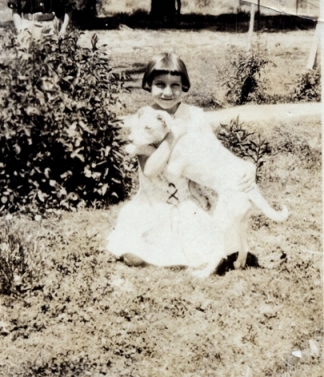
|
Hester Damron at Age 7 |
Dad was usually pretty good natured, but he would be pushed only so far. At the moment he was upset because he had just cut his finger and here was Hester with a big stick standing by the buggy wheel. I’d run the stick all the way around the wood spokes of the wheel where it would make this big racket-clack-clack-clack really fast. Then to top it off, I’d yell just as loud as I could like a fire engine. I did that I suppose for about ten minutes when Dad told me two or three times; “Hester, if you don’t stop that racket I’m going to give you a spank'en.” But, I was so caught up in my fun and didn’t pay any attention to him. I just kept it up and pretty soon he came after me. I ran around the buggy several times with him in hot pursuit. Even though he was on the heavy side he could run fast and he grabbed hold of my wrist. With a small limb off the cottonwood tree, he tingled my legs good. It served me right ‘cause I didn’t mind him.
DAD & ANNIE TRIPPED
My sister, Annie, told me she did the same thing with the same warning from Dad and he grabbed the buggy whip. She started running as fast as she could. She made it all the way around the corn field, sailing over the ditch banks with him breathing right down her neck. She was young and boy, could she run, but he could run faster. Pretty quick he took that ole’ buggy whip, whirled it around his head and lashed it out with the speed of a snake’s tongue. The leather thong wrapped around her ankle tripping her and threw her a winding. It just scared her to death and also broke her heart because she was a lot like my Dad and he kind'a petted her. She was a true Damron after his family with the black hair and big brown eyes. She never forgot this incident and we still laugh and talk about it a lot.
DAD PLOWING THE FIELDS
The Spring was a wonderful aromatic time when Dad started plowing the field with Old Buck. Me and my brother, Jack, and sometimes Chet, would walk right behind him as the plow turned over that lovely, warm, black soil. It would dig a big furrow and it was so nice because every time the earth would turn over the smell was just heavenly. It has such an aroma and smelled so clean and earthy. I yearn for that smell again whenever spring comes. There was an abundance of earthworms exposed as the dirt rolled over. Jack would chase me all over the field threatening to put one down my neck. I did my share of scream'en, dodging and leaping from row to row to stay ahead of him. Finally we would tire of this game, gather the worms in a can and play with them. We’d also save some to go fishing with in the irrigation ditch by our house. We’d make a big to do about getting a string and a pole made from a tree limb. We’d put the worm on a safety pin and try to catch fish. Of course, there weren’t any fish in there, but we thought there were and that was good enough. Sometimes we’d lay down in these nice fresh plowed furrows and one time my brothers covered me up to my neck and oh! it felt so good and warm lying against my small body. But, Dad put a stop to that because he was afraid we might accidently smother one of us.
During the plowing my Mother and older sister would come into the field and follow the furrows. We carried our seeds in little bags and cans. We would make a small hole with a pointed stick after ramming it in the ground. Then we’d plant three kernels of corn and two of Kentucky String Beans in the hole. We always planted these beans because Mama was from Kentucky and she loved them. Soon the corn would come up so tall and beautiful. Field corn grows really high and has big broad leaves and eventually the golden tassels come on. They are so pretty! When the wind comes along they just sway back and forth as if dancing to a silent symphony. I loved to watch them perform.
DAD & INCUBATING EGGS
My Father would take care of the hatchery. This job was much like baby sitting a baby. The fertilized eggs in the incubators had to be turned every few hours. My Dad would have to set an alarm and get up during the night to turn the eggs and take care of them. Sometimes he'd have as many as a thousand eggs in the incubators. Each egg had to be candled by hand. The candler was like a megaphone, only you turned it and put your face in the big end . You held the small end up and put the egg in front of the small end. When you held it up to the sun or to a lamp you could see whether it was a fertile egg or an infertile egg. If it was fertile, a little baby chicken was starting to form. These eggs went back into the incubator. If they were infertile, they wouldn't hatch, but were still good for other uses.
EGGS TO PIGS
Since we raised lots of pigs, we'd take the eggs that wouldn't make a baby chicken and put them in a big ole’ black tub on an open fire. We would cover them with water. The whole tub would be full of eggs. We'd then boil the eggs and it was my job to stir the them. I couldn't eat boiled eggs for years after that because sometimes the eggs would break and smell so awful while I was stirring them. When they were done, we would feed them to the pigs.
DAD PASSES AWAY
When my Father was sixty five years old he had a cerebral hemorrhage from which he never recovered. He was in a coma for over a week and then passed on. Towards the end of the week my Mother gathered us all to my Father’s bedside and we knelt as she prayed. She told Heavenly Father that if my Father could not recover and be well and, if it was His will that He could take him. The next day he passed away. I remember when all the relatives came. My aunts came at the same time and went in together to see Dad. Then they put their arms around each other and my Mother as they stood in a circle and wailed, moaned and cried. It was the most awful sound I had ever heard.
In those times the dead were put in a wooden, home-made coffin with Mason fruit jars full of ice packed all the way around the body to preserve them as long as possible. Our relatives came in turns to help guard the body nights because everyone had cats to keep the mouse population down. It was known that unguarded bodies had been eaten on by some of these hungry animals. The dead were usually laid in the living room of a home. I sat around the fireplace with my cousin Zola Claridge and Chet as they were changing turns and talked in subdued tones about all that had happened. Von and I hadn’t been married too long when this happened. I’d been to San Diego, California to help my sister, Armelda, who was ill. When we received the sad news, my brother Joe and I came home by bus and had to leave my weeping sister behind because she wasn’t strong enough to travel.
CHAPTER 4: MY SIBLINGS
ARMELDA
Armelda (Melda) was born 23 February, 1905 in Central, Graham County, Arizona.
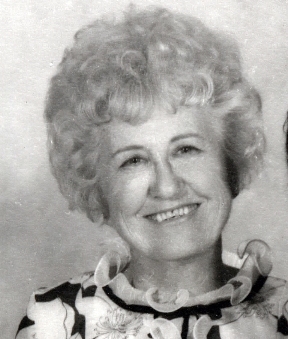 She was rather tall, about 5’ 6” and had light brown hair and bright blue eyes like our Mother. She was full of energy and was a good hard worker. She was generous and fun to be around and made up stories that she told so often she finally believed them as the truth. She got this from my Father. She always looked nice and could talk to anyone and made friends easily. She was good to me and I always looked up to her because she was my big sister. A Memorial was held for her in San Diego, Calif. where she died. She donated her body to
She was rather tall, about 5’ 6” and had light brown hair and bright blue eyes like our Mother. She was full of energy and was a good hard worker. She was generous and fun to be around and made up stories that she told so often she finally believed them as the truth. She got this from my Father. She always looked nice and could talk to anyone and made friends easily. She was good to me and I always looked up to her because she was my big sister. A Memorial was held for her in San Diego, Calif. where she died. She donated her body to
science.
JOE
My oldest brother Joseph Vernon Damron Jr. Was born in Thatcher on the 22 of July 1906 and was named after my Dad. He was over 6’2” tall and had black hair and blue eye
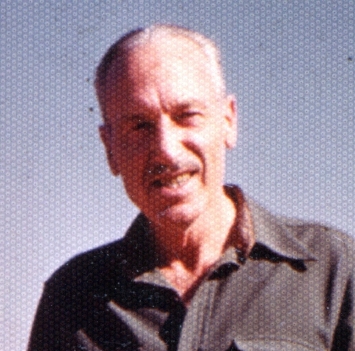 s. He was handsome, but he led a sad life because of alcohol. I remember that as a young man he worked hard, saved his money for a whole year and bought my Mother a new wood stove. She was so thrilled. He was always good to Mama and tried to make her life a little easier. He favored her folks as he resembled the Fergusons.
s. He was handsome, but he led a sad life because of alcohol. I remember that as a young man he worked hard, saved his money for a whole year and bought my Mother a new wood stove. She was so thrilled. He was always good to Mama and tried to make her life a little easier. He favored her folks as he resembled the Fergusons.
He worked building the highway running through the town of Thatcher. When I would be on my way home from school I would see him pushing a loaded wheelbarrow full of concrete. He did that all day long in the hot sun. He’d have the staggers he was so weary and I felt so sorry for him. He had such thin legs. When he was in the Arizona National Guard he had to dress in uniform once a week and drill for which he received $1.50. They were required to wear khaki pants, shirts, high top shoes and, from shoe top to mid-calf, they wrapped their legs over their trousers with matching binding strips. He would wrap his twice so his legs would look larger.
During the depression years he married Josephine Beatty from Arkansas. They lived with us for awhile. There was no work so President Roosevelt formed the CCC camps. He joined and my brother Chester also. Josephine moved to a room in Safford and waited tables. Joe would come home on the weekends, but she wasn’t happy. One time when he came home she was gone. It broke his heart and he started drinking. Later he married Ruth Tally and they had four beautiful children.
RAY
My brother William Ray Damron was born 25 May 1909 in Thatcher, Arizona. He was 6’ tall and had black hair and blue eyes. He was shot in the leg while rabbit hunting as a teenager with our uncle Bill Ferguson by accident.
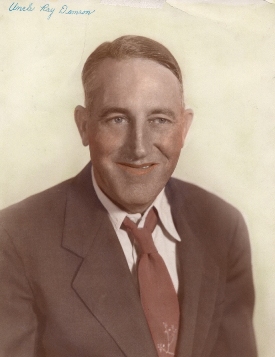
A rifle was leaned up against a fence post while they were going through the fence. It fell over and discharged into Ray’s leg. In those times people who were crippled were treated as invalids, so his life was not happy. He was so good to all his nieces and nephews that they really loved him. He lived with my Mother more years than she lived with her husband.
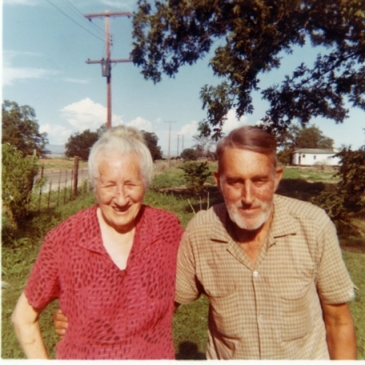
|
Armelda and Ray Damron 1966 |
Ray never married. He died at age 65 with lung cancer as did Armelda, Joe and Chet. My brother Ray first had cancer when Amber was a baby. He had cancer of the breast, then a tumor on the brain. Next a tumor appeared on his finger, which finally healed up. He next got a big one on his elbow, and his right arm had to be removed. He died a year and a half later of lung cancer. My Father died when my Mother was fifty-five years old, and he was sixty-five years old. About that time most of us kids left home. However, my brother Ray lived at home with my Mother all of his life. Ray died when he was sixty-five and Mama was ninety-two years old. She had been taking care of him as an adult for over forty years.
LEWIS
My brother Lewis Milton Damron died of diphtheria at 23 days old. He was born 6 January 1911 in Thatcher, Arizona.
ANNIE
My sister Mary Annie Damron was born 5 July 1913 in Thatcher. Arizona. She is medium height about 5’ 5” tall and has coal black hair and dark brown eyes like the Damrons. She’s always been beautiful and a sweet person. She is very compassionate with everyone, almost to a fault as people take advantage of her. She has worked hard all her life. She and I get along very well together. She had three children and married Casey Pilcher. I think sisters are certainly the most satisfactory relationship ever. They’re around your own age, which your children are not and they are your own sex, which your husband is not and they are blood relations, which your friends are not. No one else can fill the gap.
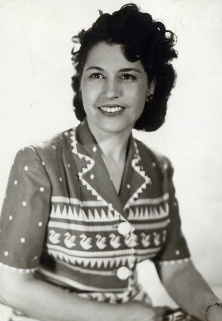
|
|
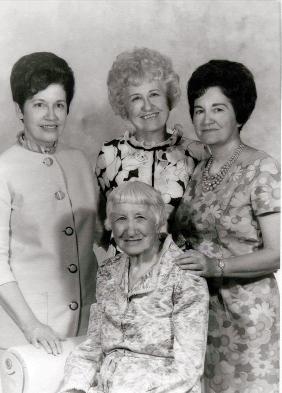
|
|
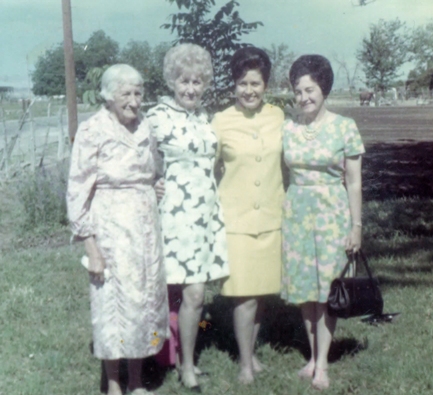
|
Armelda, Melda, Annie & Hester 1970 |
CHET
Next in the family came Chester Ferguson Damron born 13 August 1916 in Thatcher, Arizona.
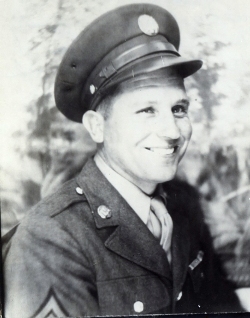
|
|
He had the same coloring as me with dark brown hair and hazel eyes. He was of medium build and stocky. He had a hard time learning to read and was held back a grade or so. We ended up in the same classroom which made it hard on both of us. I think he had a form of dyslexia, but in those times t
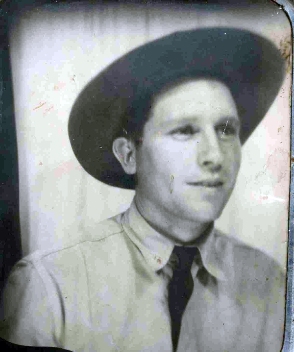 hey didn’t recognize it. It was very nerve racking for me because I’d have to sit by him and help him. We had to do this in sort of a sneaky way. I’d whisper the word to him when he had to stand up and read so that he wouldn’t get into so much trouble with the teachers. I can remember he would be so frustrated and confused that the perspiration would drip off him.
hey didn’t recognize it. It was very nerve racking for me because I’d have to sit by him and help him. We had to do this in sort of a sneaky way. I’d whisper the word to him when he had to stand up and read so that he wouldn’t get into so much trouble with the teachers. I can remember he would be so frustrated and confused that the perspiration would drip off him.
One time he asked to go to the bathroom and the teacher said no, so he went anyway. They took him down to the Principal’s office and whipped him with a big wooden paddle. He quit school and never returned.
In 1987 there are 27 million Americans who are illiterate. He was smart in other areas and could work well with his hands and grow anything. He fought in World War II from the beginning to the end. He was one of the first soldiers to leave the United States because he belonged to the Nation Guard out of Safford, Arizona.
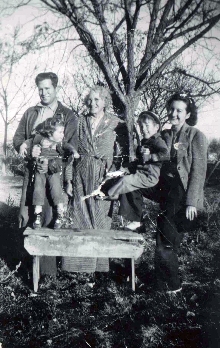
|
Chet, Marsha, Armelda, |
He suffered much from the results of war because of malaria, jungle rot and battle fatigue. He married Faye Peck and they had one son named Daniel.
My brothers Joe and Chet joined The Civilian Conservation Corps (CCC) in the depression years around 1932 and 1933. My brothers went to the CCC Camps up on Mt. Graham and worked all week on roads and building camps so they could earn a little money so we could eat. We were all so glad to see them come home on the weekends. I copied the following article from a magazine while on an airplane a few years ago that explains the CCC.
THE LEGACY OF THE SOIL SOLDERS.
A half century ago, the nation was at the bottom of the Great Depression. Within a few years, Americas gross national product plummeted from eight-seven billion to forty-one billion dollars. One third of America’s work force was unemployed or under-employed. Of that percentage, most were without jobs, and close to flat broke. Unmarried youth couldn’t beg steady employment anywhere.
Working wasn’t much better. Master machinists, at the peak of their skills, earned seventy three cents an hour. Farm workers were lucky to earn $1.60 a week and board. College graduates sold apples on street corners. Destitutes fled cities to sleep in the barns of farm relatives. Even the wealthy were not immune. Many were wiped out financially overnight caused many suicides to follow.
President Franklin Delano Roosevelt took office March 4, 1933. The Civilian Conservation Corps, his first federal
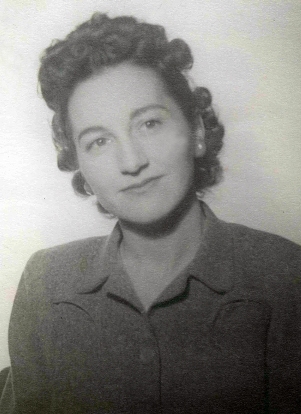 recovery program, went into effect before the month was out. By July 4th the CCC was a full authorized strength of 300,000 enrollees in camps. Mainly in the West. City boys, some as young as sixteen, abruptly landed in forest camps, desert camps, suburban camps. It was called the “Tree Army--The Soil Soldiers.”
recovery program, went into effect before the month was out. By July 4th the CCC was a full authorized strength of 300,000 enrollees in camps. Mainly in the West. City boys, some as young as sixteen, abruptly landed in forest camps, desert camps, suburban camps. It was called the “Tree Army--The Soil Soldiers.”
I worked in a restaurant in Safford during this time and some of the young men from the Bronks in New York City would come in and order food on their weekend leave. They spoke so differently that I could hardly understand them. They were sure a lonesome bunch of kids. My brothers didn’t like the camps either, but we needed the money and at least they got to go to their homes during the weekends. Lots of girls would go to the Safford Armory where they held a big dance every Saturday night and many found their husbands there from these camps.
When World War II broke out everyone in the Arizona National Guard was sent to defend their country until other boys could be trained. This took my brother Chet as soon as war was declared. Joe was too old. Chet belonged to the Arizona Bushmasters Unit.
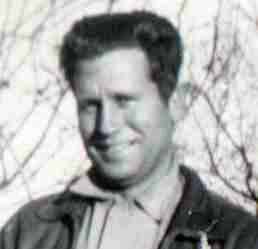
|
Chet Damron 1945 |
There unit was named after a very deadly and aggressive snake. Here is an article by Mark Monday published in a local news paper a few years back about them.
PACIFIC CAMPAIGN RELIVED BY 100 BUSHMASTERS
The 158th regimental combat team-the Bushmasters-relived the battles of New Guinea’s Owen Stanley Mountains, Mine Bay, the Philippines and the “march across the Pacific” yesterday.
About 100 Bushmasters showed up at the Phoenix National Guard ramada to meet again the men with whom they ate, slept and fought on the march from Australia to Japan in World War II.
The Bushmasters--4,000 Arizona National Guard troops federalized in 1940--fought throughout the Pacific in World War II. They were instrumental in securing beachheads on the Philippine Islands.
Of them, General Douglas MacArthur said, “No greater combat team was ever deployed for battle.”
The colors of the 158th have been retired. The unit has been removed from the U.S. order of battle. And its men have begun to show creases as hard as a military press in their faces.
Though its men have grown older, they have not lost the zeal of the young for the flag or the nation.
The men who survived the jungle war also talked about today’s
youth.
Jacob Ramon was in F Company during the war. Today he lives in Phoenix. A Papago Indian, Ramon was one of the men who confounded Japanese intelligence by speaking in an Indian dialect over the unit’s radio network. They were called the Code Talkers.
“I really don’t understand what the problem is today,” he said, then added in a voice slowed by emotion,
I fought for my country. Let’s put it that way. If anyone doesn’t like that, let them kill me.”
Ramon talked about the war--a broadcast by Tokyo Rose accusing the 158th of being barbarians.
But most of the conversation between Ramon and Leo Medigovich of Nogales--with K Company of the Bushmasters--started with one phrase,
“
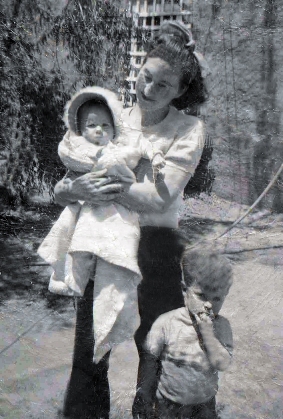
|
Marsha, Hester & Ricky Brimhall 1945 |
Whatever became of .......”
JACK
My youngest brother, Jack (John Henry Damron) was born on the 25th of March 1923 in Thatcher, Arizona.
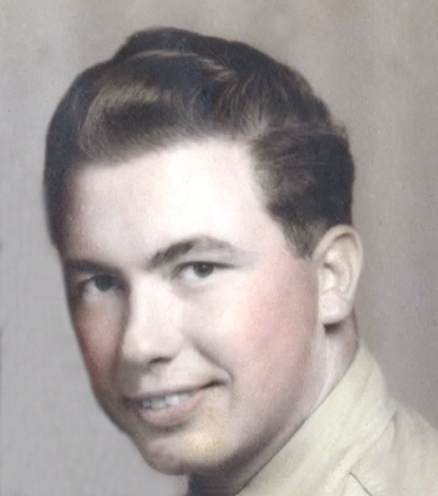 He was short like me and was a very fast runner. He was a star in every sport he entered. He had dark brown hair, hazel eyes and big strong white teeth. We were close as we grew up and really enjoyed and loved each other. He married Betty Garvin from Oregon and they have six children. When Jack signed up for the service in World War II, they thought he was kidding when he signed his name as John Henry because the recruiter had said “... put your “John Henry right here.”
He was short like me and was a very fast runner. He was a star in every sport he entered. He had dark brown hair, hazel eyes and big strong white teeth. We were close as we grew up and really enjoyed and loved each other. He married Betty Garvin from Oregon and they have six children. When Jack signed up for the service in World War II, they thought he was kidding when he signed his name as John Henry because the recruiter had said “... put your “John Henry right here.”
BETTIE LOU
My youngest sister, Bettie Lou Damron, was born on the 7th of May 1926 in Thatcher, Arizona.
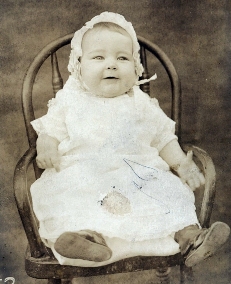 She was such a sweet baby. Our whole family knelt at sorrows feet when she passed away a few days over a year old from whooping cough.
She was such a sweet baby. Our whole family knelt at sorrows feet when she passed away a few days over a year old from whooping cough.
HOME ALONE
My older sisters, Annie and Armelda, left home in their teens. I can hardly even remember them living at home. Annie left before she even graduated from High School to live and work in Safford. Armelda and Joe went to California to work and my husband was away at this time in World War II. Also my brother Jack was in the Air Force and Chet was in the National Guard from Arizona. He served in the 158th Infantry during World War II and Jack was a tail gunner on a B-24 bomber in the European Theater. Most of the war I was without my brothers and sisters.
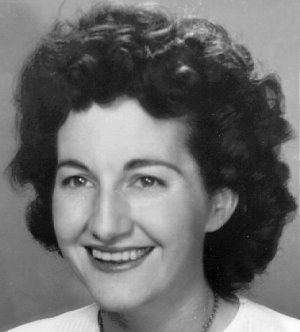
|
|
CHAPTER 5: HOME LIFE WHILE GROWING UP
DAD AND KILLING ANIMALS
Each year we’d raise a pig or two and when it came hog kill’en time in the fall the whole family would get involved. It was an exciting time! Poor Dad, he was so tender hearted he could never kill anything. He couldn’t even wring a chicken’s neck. The only time I saw him be the least bit mean was when he would kick the mating chickens so us kids would stay pure. I recall he would take the broom and even gently sweep the cat off from his work bench. When it came time for the butchering of pigs, rabbits, chickens or cows he would go in the house and stay until the killing was over. Out he would come then with all the knives sharpened and help butcher the meat. We always had to hire someone to come and do the killing of the larger animals. My Mother would kill the chickens and rabbits until the boys got older, and then they did it. Soon a big barrel of water was put onto heat over an open fire pit. Usually they’d shoot the pig in the head and then cut it’s throat. It would hang from a tree to bleed awhile. Next the body would be taken down by the men folks and dumped into the barrel of boiling water. They would thrash it up and down several times. After hanging it up again they’d scrape all the hair off and wash it down until it was a clean, shiny pink color. Then it was spread apart and cut with a big sharp knife down it’s belly. All the entrails and guts and all that stuff would come roll'en out. It sure was yucky. All of us kids just loved to watch. We’d squeal and jump around like children do.
BLADDER BALLS
There was another reason why we’d stand and watch so long. We never had any balls except rolled up rag balls. When an animal was killed we’d get the bladder, wash it real good, fill it full of water and tie it off with a string. This made an excellent ball that we could throw back and forth to each other and have a good ole’ time.
WHITE CORN
Butchering the larger animals was done in the fall and that was also when we had to shuck the white field corn. We loved it, but when I married Von his family called it hog corn because they fed it to their hogs to fatten them up. They ate sweet corn. We NEVER fed it to our hogs cause we ate it ourselves and loved it. Soon we’d have buckets of shelled corn sitting all over the kitchen. My Mother and Dad would get a big tub of water and put it on the wood stove. Then it would be filled to the top with the corn. Mama would pour lye in it and then it would sit on the stove for several days. Soon all the husk of the corn would fall off and just the good part was left. That’s how you make hominy and that’s how I learned to love it. I’d come home from playing with my friends and I’d just be starved to death and there would be that tub of hominy on the stove. If it had lye in it or not, us kids would ram our hand down in and get a handful. We’d wash it off and run outside to eat it. It sure was tasty. We'd take some of this corn that we'd shelled and feed it to the chickens, the ducks, the geese, the turkeys, the game hens and the fighting cocks that my brothers had. They loved this ole’ field corn, just like we did.
JACK AND I PLAYING IN THE CORN STALKS
Sometimes Jack and I would build a little hide-a-way in the corn field. We’d pick some of the new little ears of corn with silkiest tops and we’d pretend they were our dolls. Their little houses were made of leaves and sticks we wove together and we were very bossy to them. We would make them lay down and take naps, but soon they had to get up so we could feed them and comb their silken yellow hair. What fun we had whiling away those warm summer days and looked forward to their welcome arrival each year. Always the wild morning glory flowers grew up the corn stalks. They were so pretty. Mostly blue of color. but sometimes there would be pink and white. They made the field look like a flower decorated fairy land. One time I went out to pick me a beautiful bouquet. I ran from one row to the next gathering these gay, little, wild flowers. When I started back to the house, I couldn’t find my way and searched and searched for a familiar landmark. Soon I felt scared and lost in this now vast, strange field. Fear rolled over me and I could imagine all kinds of strange and menacing creatures lurking behind each cornstalk. I began to cry and started hollering in between sobs as loud as I could. “Mama, Mama come and get me.” It wasn’t long until my brother, Chet, came crashing in to save me (my hero) and led me out of the cornfield to the safety of our home.
MOM AND HEAD CHEESE
I recall seeing my Mother with the pig’s head in a big bucket of hot, hot water. She’d wash it several times and then would take a sharp knife and scrape it, and clean out the nose, jaws, where the teeth were and the ears until it was spanking clean. Same with the feet, but she usually roasted them in the fireplace. After she had boiled the head on the wood stove for a long time, she’d peel all the skin off and remove the meat. This was mixed with ground up chili and several kinds of herbs and spices. Through the hand grinder it went until it was the right texture. Now this mixture was put into a greased bowl and a big plate over the top and a heavy flat iron on top of that for weight. This sat for several days before she would turn the bowl upside down and out would come this delicious head cheese. Actually it was what we call lunch meat now. It had a good flavor and made delicious sandwiches. We also fried thick slices of it for breakfast and it was so good!
WHAT OUR FAMILY ATE CUSH, PIG WEED, ETC.
In the summer time we mostly lived on vegetables we raised in our garden and pig meat, if we still had some. Every meal we had corn on the cob or fried corn along with home made cottage cheese and homemade bread with butter and honey and lots of whole cows milk. How we loved our Mother’s cornbread with her home churned butter and fresh molasses syrup. If there was any cornbread left over we had it for breakfast in the morning with mama’s own invention called cush. She made it by frying fresh pork slices and with the dripping made a gravy. Then she’d crumble up the cornbread in it and cooked it until it was sort’a dry. We’d gobble this up with salt and pepper on it. We just loved cush! My mouth just waters right now thinking about how good it tasted. When my sister, Melda, was dying of cancer she yearned for some cush, so Annie made her some and she did appreciate and enjoy it. We even ate things that grew wild. Among our tall corn stalks would grow a beautiful plant that we called pig weed. It was very green on the top and red on the underside. When the leaves were young they made nutritious greens. We’d run out and gather an arm load of these weeds and take them to Mama in the kitchen. She’d have water boiling and cook them in just a few minutes. We’d all sit down and put vinegar on them which made them taste better than ever. Sometimes she'd pour bacon grease on them, and that would make them taste better. We also gathered sour-dock and asparagus which grew wild on the ditch banks and ate them.
GET-RICH MEAL/PEARLS
In the winter time we’d have a favorite meal, if we could rake up the money. As Dad and I walked to town I’d skip along holding his hand. We’d visit on the way to the Thatcher Meat Market. There, we’d buy a can of oysters, some longhorn cheese and soda crackers, and then hurry home with our mouths watering. All the kids would get excited knowing we were going to have oyster soup for supper. The main reason we were all excited is ‘cuz we had heard about people who had been eating oysters and had found a real pearl. They became millionaires. So we could hardly wait to get our bowl of soup so we could find that ever, elusive pearl. The meal was always charged with wonder and excitement not knowing which one of us would be rich by the end of it. Of course, it never happened but we kept thinking it would anyway. The family hunted faithfully through the very last spoonful.
STREAKED GREASE
My Mother cooked southern and one of our favorites was called “streaked grease.” She would fry some fresh pork and with the left overs in the frying pan, she’d pour in hot milk and stir it around. The grease would streak a beautiful brown and then she would pour this over homemade bread and butter for us to eat for our breakfast or supper. It had a wonderful flavor and we thought it was the most delicious thing we ever tasted.
OUR SNACKS
We didn’t have junk food in our time. Our snacks were very different. If we came home from school hungry, we’d run out to the cellar. In our root cellar we stored turnips as big as grapefruits. They made a wonderful, healthful snack. Onion sandwiches were good, if they were made from the sweet ones. We also gnawed on raw potatoes and big hunks of fresh green cabbage from our garden. A real treat always came from the cooler door that held the raw milk. We would skim the yellow cream off the top and spread it over bread. To top it off we’d sprinkle sugar and cinnamon over the cream. It tasted just like cinnamon rolls.
CONSTIPATION
The only time we saw orange juice was when we were constipated. Dad would go to the grocery store and bring back a few oranges. Mama would squeeze all the juice out of them and mix it with caster oil. Then we would have to drink it. Boy! Was it ever nasty. It was a good laxative, but I still don’t care for orange juice or caster oil. I shudder again just thinking of the taste it left in my mouth.
DE-WORMING
Ah! Ha! the live'en end. Every spring we were de-wormed along with the cats and dogs with a sulphur and molasses mixture. This was supposed to purify our blood, keep us worm free and it did the trick.
STOMACH ACHES
If we had a stomach ache, we’d go to the ditch bank again and pick the wild spearmint. Mama would make a tea for us. It did sooth our stomachs. Instead of running for the doctor, we ran to the ditch bank for herbs.
LIVING CONDITION/WATER and POWER
Conditions in those days were very different from now. Electricity was not a part of life in most of America’s small towns. We were one of the unfortunate people who did not have electricity or water piped into the house until I was in High School. Without electricity there could be no refrigeration, washing machines, etc. Most of the hauling of the water was done by women, and so much water was needed! On an average a farm family used 200 gallons or 4/5 of a ton of water each day. We used to lift a full bucket, some weighing 30 pounds and we’d have to haul it from the outdoor faucet into the house, and then set it on a wide window sill for drinking. We did a lot of hauling of wood for the wood stove and fireplace. We hated our wood stove because it was so hard to start up and because it was so dirty. Most of all, we disliked it because it made the room so hot. When this big iron monster was lit, the whole huge mass of metal was almost glowing. In the winter the heat was welcome, but in the summer it was just terrible. No matter how hot the day, the stove had to be fired up. Much of the time not only for meals, but for baking and canning as well.
CANNING ON THE HOT STOVE
Far from stores and often short of cash during these depression years, most families lived through the winter largely on vegetables and fruit picked in the summer and preserved in jars or dried on the roofs of the houses. Since there was no refrigeration, vegetables and fruit had to be canned the very day they became ripe. From June through September something was coming ripe everyday it seemed. On a single peach tree the fruit on different branches would come ripe on different days. After the peaches, the other vegetables and fruit would come on. Then the tomatoes, the okra and the squash and finally the corn. Canning required constant attention to the stove. We would have to spend all day in a little room with the sun beating down on the hot roof. We’d stand hour after hour in front of the hot, iron, wood stove. Every time the heat in that infernal stove died down, even a little bit, we’d have to make it hotter again to be able can the fruit. It would get so hot that we couldn’t stay in the house. We’d take turns running outside to sit under the shade trees by the ditch bank. We’d fan ourselves with a page from a catalogue, hope'n for an illusive cool breeze. However, you couldn’t stay out very long because you had to stir fruit on the stove or you had to watch and tend to the fire. When the cold winter came and fresh food was scarce, oh! how beautiful and delicious was the food we preserved during the summer months.
WASH AND IRONING DAYS
Once a week, all year long, on Monday was wash day. A huge pot of boiling water would be put outside on an open fire. Near it three large metal wash tubs and a dish pan would be placed on a bench. The clothes would be scrubbed on a washboard over the first big galvanized tub. We would then wring out each piece of clothing and put it in the big pot of boiling water containing home-made lye soap. Then we’d try to get the rest of the dirt out by punching the clothes in the pot while standing over the boiling water. We would do this for ten or fifteen minutes using a broom stick to stir the clothes through the water and press them against the bottom and the sides in a human imitation of a washing machine agitator. Then the clothes were lifted out of the big pot on the end of the broom stick. We held them up for a few minutes while the dirty water dripped out and then they were dropped into a rinse tub. We rinsed by swishing each item through the water. We then wrung the clothes out and placed them in the third tub which contained bluing and swished them around some more. The bluing was to make the clothes look whiter. Then we repeated the same process in the dish pan that was filled with starch. At this point one load of wash would be done. A week’s wash for the typical farm family took eight loads. For each load the water in each of the three tubs had to be hauled and changed. I remember when people started talking to us about electric washing machines; a machine that washed. I just couldn't picture that at all. Washday was every Monday, and Tuesday was ironing.
IRONING CHORES
In the 1930's an iron was a heavy iron wedge weighing up to 7 pounds. It had to be heated on the wood stove and it retained heat for only a few minutes. A woman would own three or four of these heavy irons so that several could be heating while one was working. An iron with a detachable wooden handle cost two dollars more than one without the handle. In our house we only had one handle, and we'd have to transfer this one wooden handle from one iron to another so we would protect our hands with a thick pot-holder.
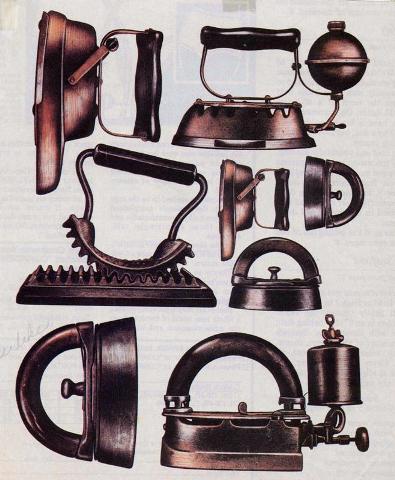
COW CHAIN STORY
I can remember one day when I was helping my brother Chet herd the cows. We had two cows, and we had to take them out into the streets. There were just dirt lanes in Thatcher. The cows would eat the weeds off from the ditch banks, and we had to watch them. We tied them up, but when they had eaten the grass we had to move them. This time when we moved the cows, one cow had a big, long chain around its neck that we would tie around a tree. My brother Chet was starting to move the cow. I was little and must have been about six or seven years old. I had started back to the house, because I was tired, thirsty and wanted to go back home. He got mad at the cow, so he picked up a stick from the ditch bank and started to hit the cow. It upset the cow and she started to run. I didn't notice that she was running towards me at first, but then I turned around. As I turned around, she knocked me down and jumped over me. The chain she was pulling went right under my nose and almost cut my nose off. I had a scar underneath my nose all of the time that I was in high school. In fact, I still have it, but you can hardly see it any more. I always looked like I had a dirty nose. I was really self-conscious about it.
DITCH BROKEN ARM STORY
Another time a friend of mine, Kathleen Curtis, and I were playing on the ditch bank. There were lots of Cottonwood trees there. We would grab a limb that was hanging down that had lots of leaves. We would wad up several thin limbs so we could use them to swing on. Then we would swing over the ditch, let go and land on the other side. We were just having a gay ole’ time doing this. It was my turn, so I got real far back, and I was really going to show off for Kathleen. I ran and I jumped from my side of the ditch. I was supposed to land on the other side. Instead the leaves came off from the limbs making my hold slippery. I fell down into the ditch and broke my arm as I landed on a rock. I can remember that Kathleen got so excited that she ran home to tell my Mother. I was climbing out of the ditch, bawling and going home. I must have been about 5 years old at the time. I remember my Mother, tall and sort of "raw boned," running down the road towards me. She had her apron on and the dishtowel in her hand. She was just wringing that dishtowel. She was so upset. My arm had what they called a "green break." My bones were so limber at that time that they didn't break, they just bent. The “green break” started at the wrist and bent way down and then came up at the elbow. We had to have the doctor come. He pressed it and moved it around and kind of straightened it out. I had to wear my arm in a sling for a long, long time until it healed.
SCREEN PORCH SCARED STORY
The house that I was born and raised in, in Thatcher, Arizona was an adobe house. As I have mentioned, it had a living room, a kitchen/dining room combined and one bedroom. When I was about ten years old, we added on a screened porch where most of the children slept. I remember when they were building the porch. Just the floor and the beams were up on it when Jack and I decided that we were going to sleep out there. We were really brave for about two hours. We finally got scared and ran and got into bed with our Mother and Dad. We thought that somebody was walking around out there.
BUILT HATCHING HOUSE STORY
I don't remember our adobe home being built after Ray burned down our first home, but I do remember when we built the adobe hatching house out in back. Jack, Chet and I all had to get into the mud-box to mix up the adobes. There was straw, sand, dirt and water in this mud-box. We had to get in there with our bare feet, wade around tromping the straw down and mix all this up real good to make adobes. When we'd get it mixed up real good, my older brothers and my Dad would shovel it into adobe molds. When it dried a little bit, they'd turn these molds upside down, and there they were -- adobes. We built the hatch’en house out of those adobes.
PLAYING BOTTLE HORSES STORY
My brother Jack and I were really good pals. We did a lot of things together. We used to play horses all the time. We'd take a pop bottle and tie a string around the neck. Then we'd make corrals for them and barns out of dirt and sticks. We'd pull up the grass and make hay for them to eat, and we'd water them and pull them all over down the roads. We'd even fight Indians with the bottle horses. We had a real exciting time. I used to make Jack so mad. I’d say I was going to go in the house and take a little nap or something. I’d do this so I could sneak back out to watch him because he always talked out-loud to himself. As he played with the bottled horses he’d tell them, "Oh, this is a beautiful day, and we are going to ride down to the river, and we're just going to have a wonderful time." Then I'd break out laughing because he was talking to the old bottles. He'd get so mad that he'd go into the house and tattle on me.
WILLIE MCRAE STORY
Willie McRae was my brother's dearest friend. He was crippled as was my brother, Ray, and so they got along really well together. Willie had an electric cart, one of first that was ever in the valley. The town of Thatcher went together and bought him this cart so he could get around because he couldn't walk very well. He had sort of club feet. He'd come and get my brother and they'd ride around in that cart all over Thatcher. They had the best time together. Whenever I took the kids down to visit Mama, why Willie would come in his cart and take all the kids for a ride. He was cheerful and jolly and the kids just loved to ride with him.
CARPENTER TELESCOPE STORY
Frequent visitors in our home were Brother and Sister Ezra Curtis and their daughter Kathleen, who was one of my best friends. Brother and Sister Joe Carpenter, who were our neighbors right straight across the street from us, were also good friends of ours. They had a big pecan orchard, and they would always give us pecans. One time when their son Joe was home he had a big telescope and he had all of the kids come over. He explained to us about the stars, the moon and all of the different planets. He gave all of us a good time looking through the telescope.
OUR THATCHER NEIGHBORS
I remember Brother and Sister Mickelson. Brother Mickelson was our Patriarch. Jack and Bula Daily lived across from us. They were really good to Mama all of the time. They were such good neighbors. I remember Sister Bazard and the Staffords, the Martinsons, George and Zena Frank, and Norman, and Joan Claussen and her daughter Margaret, and Brother and Sister George Eccles. These were just a few of our neighbors and friends when I was growing up.
GAMES WE PLAYED
Two of the games that we played as we were growing up were Kick The Can and Annie Aye Over. Annie Aye Over was played by two persons, each standing on opposite sides of the house and throwing the ball over the house. You would have to catch it when it rolled down the roof. If you caught it, you could run around the house and hit the other person with the ball. This was how you won the game and then you would start over again. We also played lots of hop-scotch and land marbles. Every year we would have a marble contest in the elementary school. We also played jacks and would have contests at school. One year I almost won.
TARZAN MOVIE STORY
We had a movie in Thatcher when I was kid growing up, but it was a silent movie. It was in black and white. Somebody played the piano live while the action was going on. They would hire a girl in town to play the piano. Willie McRae had a pop corn machine out in front, and we could buy popcorn from him. My favorite movie was Tarzan of The Apes. I remember one time how upset I was. These were continuous shows, or serials as we called them, and they left you hanging in suspense until the next Saturday to get you to buy another ticket for the next episode. This time Tarzan got up in the tree, grabbed hold of one of those big vines and started swinging through the air. His hands started to slip and right down beneath him was a pit full of snakes. This was how the movie ended. I remember thinking all week long, "How could he hang there all week long until the next Saturday when I would get to go see him?" I really laugh about it now.
MY JOBS
My jobs at home were that I was supposed to make my bed every morning and once a week I had to dust the furniture. Once in awhile my Mother would also make me do the dishes. I was kind of spoiled. I also had to turn the eggs in the big tub that I told about before. I had to wash the dirty socks on a scrub board and run errands. I usually had to help take the clothes off from the line, help fold them and put them away. I also set the table for our meals.
DESCRIPTION OF OUR HOME
I started to describe our home but got sidetracked, so I would like to continue here. The living room was rather large. It had a fireplace in it and a single bed against the wall under the west window. The home faced north and there were two big window in front and another window on the west side. The front door was also on the north. The windows sills were wide enough that you could sit in them. I remember that I used to sit in them and pluck my eyebrows or eat and watch the birds outside.
There was only linoleum on the floor, and we had a chiffonier, a dresser and a mirror with a small table where we all combed our hair. We had sort of a little library desk. We had a lot of rocking chairs and an organ that sure was real tall. It was made of a very dark wood, probably walnut.
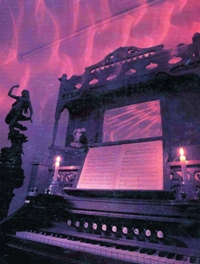 It had a beveled mirror up high with lots of scrolls and hand carving on it. On each side of the mirror was sort of a little stand where you could put flowers and statues or things like that. Then it had the keyboard and underneath were the pedals that you had to pump so that the organ would work. It had a round stool that would screw up and down. I have that stool in my home now. It has beautiful, carved eagle claws gripping glass balls for feet.
It had a beveled mirror up high with lots of scrolls and hand carving on it. On each side of the mirror was sort of a little stand where you could put flowers and statues or things like that. Then it had the keyboard and underneath were the pedals that you had to pump so that the organ would work. It had a round stool that would screw up and down. I have that stool in my home now. It has beautiful, carved eagle claws gripping glass balls for feet.
Most of our family's activities and life went on in this living room, except when we ate. I think that was because the fireplace was in there and it was warm. My Father always kept a fire going.
OUR KITCHEN
Our kitchen was large. It was longer than it was wide. In it was a wood cook stove, and not until I was in high school did we even have a kitchen sink. We did the dishes in a pan on the big, long, wide table. We rinsed them in another pan, dried them and put them into a cupboard.
We had a big can of flour and a big can of sugar in the back part of the kitchen beside the cooler door that I mentioned before. In one of the deep window sills in this kitchen we had pails of water that we would bring from the outside. We didn't have water piped into the house and we didn't have electricity either. I can remember having to go haul the water in from the faucet from outside. We had a dipper and everybody drank out of the same dipper. I'm sure that we passed our germs around.
I sat on the bench on the back part of the table at meals. There were chairs all of the rest of the way around the table. My Father ate bread and milk every night for supper as long as I can remember, except when we would have something special like cheese and crackers or oyster soup. I still have the bowl he used. Every morning he had hot cereal. We had plenty of food. We never did go hungry. My Mother saw to that. She said that it was the horror of her life to see the flour barrel empty, so she worked really hard. She was a great organizer and we always had plenty to eat. It wasn't fancy, but we never did go hungry. Our food was plain, but it was nutritious.
JELLO STORY
I'll never forget the miracle of jello. We had heard about this fantastic food called jello. The next time my Father went to Safford in the buggy to get the groceries, he brought back home a package of strawberry jello. We were all so excited that we all crowded around my Mother. She boiled a cup of water, put it into a dish and then poured these beautiful colored granules down into the water and stirred and stirred. When the granules had melted she put a cup of cold water into it. Then she set it in our cooler door. It was summertime. I can remember that every few minutes I would go and check on that jello. It took all night long for that jello to set up. I can remember sticking my finger in it and oh, it was so good! I still love strawberry jello to this day. It was so neat when it set up. It just shook, and it looked just like Santa Claus' belly when he laughed. I just thought that it was so neat!
JOE ARKANSAS PROJECT
Some of the family projects that we had that I can remember are as follows. I remember one time that my brother Joe had married a girl from Arkansas. They had gone back there thinking that maybe he could find work.
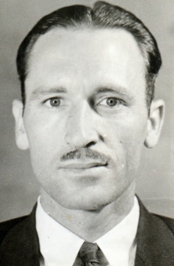 The Depression was on and nobody could find work. After they got back to Arkansas, they couldn't find any work. Joe wrote and asked the family if we would all go together and try to save up sixty-two dollars so that he and his wife could come back to Arizona. It took us nine months to save up sixty two dollars. I remember this well. Everybody put in every penny that they could to get Joe and Josephene out of Arkansas. We finally made it and they returned home.
The Depression was on and nobody could find work. After they got back to Arkansas, they couldn't find any work. Joe wrote and asked the family if we would all go together and try to save up sixty-two dollars so that he and his wife could come back to Arizona. It took us nine months to save up sixty two dollars. I remember this well. Everybody put in every penny that they could to get Joe and Josephene out of Arkansas. We finally made it and they returned home.
LINOLEUM PROJECT
Another project that I remember is that our linoleum on our kitchen wore out and had big holes in it. Underneath the linoleum we always put newspaper for padding. I remember the newspaper working out of the holes and how hard it was to mop the floor because part was wood and part was newspaper where the holes were. We decided to do the same thing; to have a family saving project. I can remember how exciting it was when the new linoleum came from Sears and Roebuck. We brought it in and rolled it out. Jack and I were so excited! I can remember that we would run and slide on the floor. We would sit down and slide or we would turn on our sides and slide. We just thought that was the neatest thing. The linoleum in our kitchen was the most beautiful thing that we had ever seen.
CREAM SEPARATOR STORY
Another thing that I can remember is that my Mother wanted a cream separator so badly. We saved and saved and finally we got this cream separator. I never could figure out how that thing worked. It had so many parts. You would pour the new milk right from milking the cow into the top of this cream separator. It was all made out of stainless steel. Then you would turn the handle and the milk would go out of one spout and the cream would go out of another spout. It was the most exciting thing that had happened to us in a long time. We loved that cream separator, but didn't like to wash it, because it had too many parts.
EASTER EGG HUNT STORY
Our financial condition was always very poor. We never had enough money, and we had to wear hand-me-downs. Mama wasn't too good of a seamstress. She tried to sew things, but they never did turn out very well. We were always pretty desperate for clothes. Our family never moved from the house I lived in as a girl. I never went on a vacation that I can remember with our family. The only special thing that I can remember was on Easter. We always had plenty of eggs. We had eggs everywhere. When my girl friends would come to visit there would always be a bowl of boiled eggs sitting on the table. They just loved to eat those boiled eggs, but I hardly ever ate any. At Easter-time we would color the eggs. We always had plenty of green grass and we always had a big Easter egg hunt. That was always really fun.
THANKSGIVING CAKE STORY
I remember only one Thanksgiving, and that's when we went down to Uncle Elzy Damron's and Aunt Emma's. All of the relatives were there. They lived in a little tiny house compared to ours. It only had one little room in the front and then sort of a little lean-to kitchen and a communal bedroom. It was a poor house, but we had Thanksgiving there. All us cousins got together and just had the best time. Somebody had brought a white cake, and they had whipped a lot of cream that we put all over the cake and coconut as well. I loved coconut so I took my finger and ran it clear across the cake when no one was looking and licked it off. Boy, did I get in dutch for doing that! That's all that I can remember about that Thanksgiving. I was always getting in dutch (trouble) for things like that.
OUR CHRISTMAS
Our Christmases were never exciting because we were very poor. We never had a Christmas tree, except when my uncle over in Klondike, Arizona, once in a while would bring us a Christmas tree. We would set it up on the table. We never did have any decorations except what us kids made at school. I can remember one Christmas I got a slip and that is all I got for Christmas. Sometimes we would get an orange or an apple and maybe a little bit of hard tack candy in our stocking. Our folks just couldn't afford to give us anything else.
PRESIDENT KIMBALL
I was born and raised in the same town, Thatcher, Arizona, in which President Spencer W. Kimball was raised. I know where his house is. It was just a couple of blocks away from our house. When I was married, he was my Stake President. I can remember all of the quartets he sang in at Conferences and stake meetings and what a great Stake President that he was. We all knew that he was going to go places because he was such a wonderful person. Even to this day whenever he sees my husband Vaughn, he remembers him going to college in Thatcher. He always tells Vaughn that he ought to shave off his mustache. We always laugh because we remember that President Kimball used to wear a mustache when he was a younger man.
PARENTAL CHURCH ACTIVITY
My Father wasn't an active
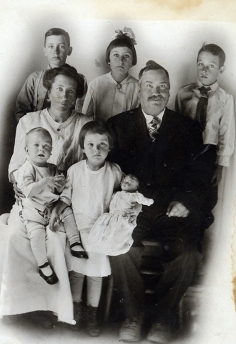 member of the Church. I think that more than anything, that he was just shy. He believed in it and encouraged us all to go, but he never went. The only time I ever saw my Dad dressed up or in the Church was when he would go for funerals. He always wore this grey stripped suit made of wool and he always looked so uncomfortable in it. He would just sweat and sweat every time he put it on. I can't remember that we ever had the blessing on the food and I can't ever remember having evening family prayer. My Mother attended Relief Society and Church and that is just about all. I remember that I used to want her to come to PTA, but she always said that she didn't have good enough clothes and that she didn't want me to be ashamed of her.
member of the Church. I think that more than anything, that he was just shy. He believed in it and encouraged us all to go, but he never went. The only time I ever saw my Dad dressed up or in the Church was when he would go for funerals. He always wore this grey stripped suit made of wool and he always looked so uncomfortable in it. He would just sweat and sweat every time he put it on. I can't remember that we ever had the blessing on the food and I can't ever remember having evening family prayer. My Mother attended Relief Society and Church and that is just about all. I remember that I used to want her to come to PTA, but she always said that she didn't have good enough clothes and that she didn't want me to be ashamed of her.
JAKE SUICIDE STORY
I would like to tell a little bit about my Aunt Mary, my Mother's sister. She had black hair and blue eyes. She was a beautiful fifteen or sixteen year old young girl when she met this handsome young man who was in the sheep business. She wanted to get married, but her Dad didn't approve, so she ran away and married him anyway. His name was Jake Weathersby. They moved south west of Thatcher to Airavaipa Canyon where he ran a sheep operation. He also had horses and all kinds of cattle. It was a real treat for us kids when we got to visit with Aunt Mary and Uncle Jake. We always considered them the rich relatives. I can remember one time when I got to go over to their place and stay with them for a few days. My Aunt Mary told me that I could pick out anything that I wanted for dinner that day. I thought that we were going to go to a store, but instead we went into the storage room, sort of like a cellar. It was just like a store. I picked out a can of pineapple because we didn't ever have it and I loved pineapple.
Every-time Aunt Mary and Uncle Jake would come to our house, they would want Mama to give them my sister Annie. They just fell in love with her. She was such a pretty child. Uncle Jake would beg Mama to let them have Annie, but she would never let them take her, of course. However, she would let Annie go and stay with them all summer. One time when Annie was there she was with her cousin Newell. They were out on the range gathering up the goats as they raised Angora Goats. They got off from their horses and sat down to rest. Newell had a gun and holster on. In those days they were still having the range wars with the cattlemen, so he wore a gun all of the time. Annie was sitting on this log and all of a sudden Newell said to her, "Annie, don't move one bit! There is a rattlesnake right behind you." She said, "Oh, you're kidding." He took out his gun and shot and killed the rattlesnake hitting it right in the head.
Uncle Jake was a handsome man, but he had a terrible temper. I can remember one time when I was there my Aunt set a cup on the table for breakfast that didn't have a handle on it or it was cracked, I can't remember which. When Uncle Jake picked up that cup and saw that it was cracked, he just slammed it onto the table and broke it all to pieces and yelled at her, "Don't you ever set a cup on like that again." It just scared me to death. I had never seen anybody do anything like that. But he was good to my Aunt in lots and lots of other ways. It was just that he had a fiery temper.
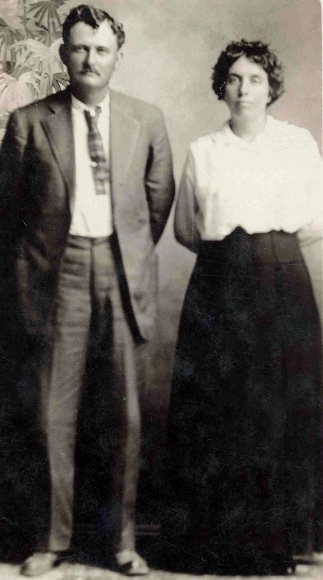
I can remember in my early teens when a man came by and told my Mother and Father that Uncle Jake Weathersby was in the jail in Safford for murder. He had got in an argument with a cattleman. The cattleman threatened to shoot him if he let his sheep on his range. Uncle Jake said the range belonged to him and this man said it didn't. The war went on for a long time between the sheepmen and the cattlemen. One day Uncle Jake had come upon this same man. The man threatened to kill his sheep, so Uncle Jake in defense of his sheep pulled out his gun. He lost his temper and killed the cattleman. He went straight to Safford and turned himself in for murder. I can remember how upset my parents were because this would be just terrible for them. Everything they had worked for would go down the drain in order to pay for a trial for him. In those days they took all the possessions away from people, especially people who turned themselves in for murder, and so my Dad got in the buggy and went up to Safford to visit Uncle Jake. Uncle Jake was very, very depressed. About two days later in the middle of the night, somebody came and knocked on my Mother and Father's bedroom window. I slept on the screen porch right next to them and I heard the man say, "I am sorry to tell you this, but Jake Weathersby committed suicide." He took a pocketknife and cut his throat because he knew that if he had to go to trial it would take all of their money and leave his wife and extended family destitute. It was a real tragedy, and I can remember my Mother crying and crying.
I remember that after this happened that Aunt Mary used to come and visit. She would always have to go to bed in Mama's bed. Mama would sit by the side of the bed and visit. Aunt Mary had tuberculosis. I don't know how we never did get it because we were exposed to it time and time again. I can remember her laying in bed coughing. She would have to have a rag to spit into, and then she would drop the rags into this sack. Mother would take them out in the back and burn them. So, maybe they did what was right. It was a real tragedy, and Aunt Mary didn't live long after Uncle Jake died. My mother grieved so after she was gone as it left her just one sister, Laura, and one brother, Henry.
SACRAMENT MEETING STORIES
I had a hundred percent attendance at all of my Church meetings. I remember that one time I wasn't very good. My girlfriend and I got the giggles during the Sacrament meeting when they were passing the sacrament. I remember that my Mother really frowned on me and I had to get up and go and sit with her. I can remember everyone drinking from one sacrament cup and then how wonderful we all felt when we finally got trays with tiny glasses to drink from individually.
I remember my Aunt Lula Cluff Damron standing up and bearing her testimony in Sacrament meeting, and how embarrassed I would be because she would take almost all of the meeting up. The Bishop would have to get up and ask her to sit down so that others could bear their testimony. She swore that she had visions and revelations. When she died my Mother helped go through her things. Mother said that she had written lots of beautiful poetry and that she (my Mother) had saved much of it which she enjoyed reading. Aunt Lula was married to my Uncle John who had a bad leg and was crippled.
FAST OFFERINGS IN KIND
Things were so scarce in those days when the boys came around to collect the fast offerings, my Mother would pay in butter, eggs, dried corn and bottled fruit. She'd also pay sometimes in head cheese and garden produce. The Bishop would then pass these products on to the people who were more needy than we were. We were glad that we were able to donate and help in this way.
MONKEY BILL MOODY
There was an interesting fellow in our town named, Monkey Bill Moody. He was related to Janice Stewart, one of my best friends here in Winslow.
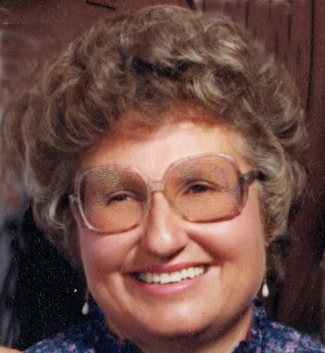
|
Janice Stewart 1985 |
He was a real character in our town. He always hung out at the pool hall. We had a pool hall right next to our grocery store; The Thatcher Market. Next to it was a drug store, the post office, and two service stations. That's about all there was of a business district in the town. I remember that Monkey Bill Moody was famous because they told the story that he was a black panther hunter. There used to be black panthers in the Graham Mountains just south of our town. He hunted them until almost all of the black panthers were gone. They were killing the cattle, so he became quite famous. However, the reason he was famous to us kids was because he could charm warts away. Whenever we got a wart, we'd run down to the pool hall and we'd ask somebody who had either come out or was going in if they'd ask Monkey Bill Moody to come out. We would explain that we had a wart and we wanted him to cure it. Pretty soon he'd come out, take our hand and look at it. He'd talk to us a little bit about it and rub it while mumbling something. Then he'd give us a nickel and in those days a nickel was really something! The amazing thing was that within a few days the warts would disappear. I don't know how it happened, but it's the truth. The best part about the cure was that he would always give us a nickel before he went back into the pool hall.
HORSEBACK RIDING WITH KITTY CURTIS
As I was growing up I loved to dance, I loved to act, I love to read and I still love to read. My next door neighbor was Kathleen (Kitty) Curtis, and she had an old brown horse named Brownie. He only had one eye, and in the summertime we used to go horseback riding all the time. I remember one time I was riding behind her as we went over to Ole’ Tom Roses' place on an errand for Kathleen's mother. There were quaking asp trees all up and down this sidewalk. We were riding on the sidewalk and I was behind Kathleen. As we were riding there was a limb that was really low. She was in front of me so I couldn't see it. When we came to this limb she ducked and forgot to tell me about it. It hit me on my forehead and knocked me off the horse and almost knocked me coo-coo. I finally came to and had to climb on the fence to be able get back on the horse because I was so dizzy. We had more fun on that horse. We'd just ride it all day long in the summertime.
DITCH AND BEE STING
We used to go on a lot of picnics and we used to run a lot. I was a fast runner, and I used to love to run. We also used to wade in the ditches. I remember one time when my Mother told me not to go up to Grandpa's. I went anyway because it was hot and I wanted to go up there and see them. My Aunt Jane, who was my Grandpa's wife, always gave me a big ole’ piece of bread with jelly on it. I was hungry that day, so this was another reason why I wanted to go up there. There was a little, tiny stream running along beside the sidewalk on the way to Grandpa's, so I decided that I would wade in this stream. It was in the summertime and I was bare footed. I was wading in this stream when I noticed there were little white flowers that grew close to the ground on each side of the stream almost making a carpet. When I decided to get out of the ditch, I stepped on these little flowers and one had a bee in it that stung me right on my big toe. I knew that I had deserved what happened because I hadn't minded my Mother.
MEXICAN FAMILY
There was a Mexican family who lived up above the ditch from us. They'd come to our house to get water at our faucet in the yard. They had a little girl named Bertha. Her daddy was a sheepherder and herded sheep all week long until he come home on weekends. Whenever he came home he gave Bertha money and she'd come down and get me and we'd go to town and buy candy. Sometimes she'd eat dinner with me and other times I'd go up to her house and eat dinner. I can remember sitting by their stove watching her grandmother flopping the tortillas back and forth. She'd put them on top of the wood stove and cook them on one side, then turn them over and put them on the other side. Bertha lived with her grandmother because her mother had died. We'd eat those fresh tortillas that came off the stove and they sure were good.
UNCLE GENE AND AUNT HATTIES’ HAY BARN
I remember going to my cousin's to spend the day. My Uncle Gene and Aunt Hattie lived on a big farm near the graveyard in Safford. I can remember going up there and playing in their barn. There were all kinds of hay in the barn. There was loose hay and baled hay. We used to get a big ole’ rope and tie it up onto the beams of the barn. Then we'd climb clear to the top of the baled hay and jump off swinging way out on the rope and fall in the loose hay. We had so much fun. Then we'd take bales of hay, move them around and build rooms, houses and tunnels. We just had the best time playing. It was usually on Saturday when I stayed with my cousin so we would take a bath in the No. 2 galvanized, big, round tub. We'd wash our hair and then Aunt Hattie would put our hair up in rags and we'd sleep in them all night. The next morning she'd untie the rags and we'd have the bounciest curls. They would be just like springs hanging from our heads. We'd just dance and they'd just bounce all around. It felt so good! I can remember I used to put them on Marsha, Brenda, Jody, and Amber and they looked so pretty with those curls.
RECORD PLAYER AND RADIO
We used to have a wind up record player and I used to play all the records. My brothers had cowboy records like "Down in the Valley, The Valley so Low," "Root'in Toot'in Cowboy Joe," and a lot of other old Cowboy records. As we’d play those records, we'd turn and turn and turn the crank to keep it wound up. Then we’d stop and go play for a little while. We'd come back and have to turn the handle some more to wind up the spring on the record payer. Finally we got a radio. We really thought we were up town when we had a radio. I enjoyed our family life around the fireplace and the closeness that we had when we sat around and listened to my Mother read to us.
ROASTING & EATING DOVES
Wild doves used to come in to eat the corn in our field by the side of our house. My brothers would go outside and stand in the yard and shoot the doves. Then we’d clean them and bring them into the house. We'd sit around the fireplace and roast the doves on sticks with a lot of salt and pepper holding them over the fire. Sometimes we burned them a little, but they sure were good. That was the best tasting meat ever! While we'd do this, we'd usually rake the coals back in the fireplace and put a potato in and covered it up with the coals. We'd have roast dove and baked potatoes for our supper that night. That was one of our favorites.
FAVORITE FOODS
Some of the favorite foods we had that I remember as were growing up were corn and string beans. Mother would cut fresh corn off the cob and cook it with the string beans. We really did like that. Then she'd make a great, big dish-full of custard with hot tamale pies made from the rabbits we raised. We'd go out on the pomegranate trees and climb clear to the top and pick great big pomegranates as big as grapefruit. Then I’d sit under the pomegranate trees and eat them with my brothers and my sisters.
HONEY & BEEHIVES
I can remember every year my Mother would go with my grandfather out to where he had land and his beehives. They'd take the honey out of the beehives and extract it. I can remember that she'd come home with her lips all swollen up with bee stings all over her, but I never heard her complain. I can remember all of us being so excited to get fresh honey. We thought that the honey comb was very delicious. We'd chew it like gum until we got all the honey out of it before we'd spit it out.
TUBING IN THE BIG DITCH
I learned to swim/dog paddle pretty good in the old canal that was up above our house. I can remember one time Jack and I got some number 3 tubs and took them up to the ditch. We bathed in these tubs. I think that my brother Chet was with us too. We put them into the water, climbed in and floated down the ditch. We just thought that was the biggest adventure ever. When we'd come to the bridges, we'd just lay down in the tub as far as we could so we’d barely scrape under the bridges. After we had gone down quite a ways, we'd have to get out of the ditch and carry the tub home.
SNEAK SWIMMING
In the summertime we used to sneak away from home and go up and swim in the canal, which we weren’t supposed to do. When we'd come home our Mother would say, "How come you went swimming, you didn't ask me." And we'd say, "Oh, we didn't go swimming." She'd say, "Oh, yes you did. I can see." We were all so dumb we didn't realize that our hair was still sopp'en wet.
CHET & SCHOOL
My brother Chet had a real hard time learning to read. I think that he had a form of dyslexia, but they didn't recognize it in those times. He was older than I was, but he was held back so many times that finally he and I were in the same grade. It was a very nerve-racking thing for me because I'd have to sit by him and help him. We had to do it in sort of a sneaky way. I'd have to whisper to him when he had to stand up and read so that he wouldn't get into so much trouble with the teachers. I can remember one time he asked the teacher if he could go to the bathroom and she told him no. He got up and went to the bathroom anyway. They took him down to the Principal's office and whipped him with a big wooden paddle. Chet quit school and never returned.
PATRIARCHAL BLESSING
I received my Patriarchal Blessing in Thatcher. It was given to me by John F. Nash. I remember that his wife was the scribe. To enter their house you had to go through a grape arbor. I had to go by myself and I was frightened to be around the Patriarch of the Church. The thing that I can remember was that his stomach growled so much as he was giving me my blessing that I could hardly hear what he said. It has been an invaluable tool and wonderful guide throughout all of my life.
BAPTISM FOR THE DEAD
Just one time in all the time that I was growing up in Thatcher did I get to go to the Mesa Temple and be baptized for the dead. I can remember how frightened we were and how we felt so out of place because we came from such a small town. Mesa seemed like it was so big. I can remember that it seems like I was baptized for about 62 people. There were just a few of us there. The Mesa Temple was beautiful! One thing I remember too is that as soon as we got out of the baptismal font, one of the girls started running and she slipped and fell. It made a big knot on her head.
CHILDHOOD SICKNESS
Some six weeks after my birth, I came down with whooping cough. To this day, if the bed covers fall over my face I come up fighting for air. My Mother said that it must have come from her having me sleep with my parents during the time I was ill. I would cough until I'd either bring up phlegm or I'd throw up. She would cover my face in the dark with a rag to catch it as we only had coal oil lamps and she didn't have a lamp burning all night. My baby sister, Bettie Lou, died with whooping cough and my brother Milton died when he was about three weeks old with diphtheria. My brother Ray was shot in the leg when he was in his early teens and I had my tonsils out in my youth.
TRIALS IN MY LIFE: DAD’S DEATH & WORLD WAR II
Some of the tragedies and trials in my life started when my Father died at sixty-five years old. My Mother was only fifty-five at the time. I loved my Father. As a general rule he was soft spoken and very good to us children in his own gentle way. His passing brought us all deep sorrow. The next major trial that I had to go through was living through the eighteen months that Vaughn served in the Pacific in World War II. We had two children, Ricky was two years old, and Marsha who was eleven months old. Vaughn moved us to Thatcher and rented an apartment from Mr. Harless who was President of Gila Junior College. It was located just two and a half blocks from where my Mother and Ray lived.
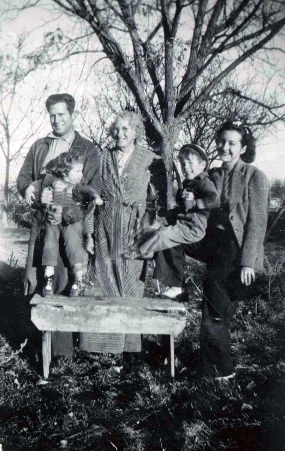
I wrote Vaughn a letter every day he was gone to the service. The only sickness we had while he was overseas were colds, sinus infections and Ricky getting bitten by a spider or something. We thought it was a scorpion.
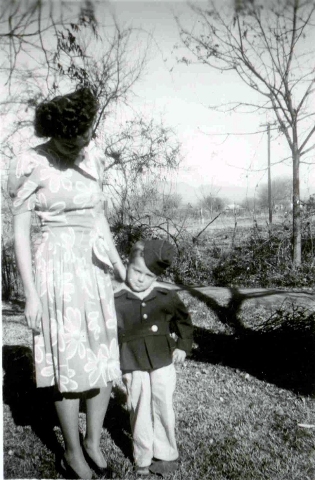
|
Hester & Ricky Brimhall 1945 |
My brother, Ray, baby-sat a lot for me, and so did my Mother. This allowed me some time to get away and do a few things. I paid a full tithing and attended all my church meetings. I visited Vaughn's family in Taylor during the summer and at Christmas time. I associated with some of my college and high school chums and my cousin Irene and I visited other cousins such as Ollie Damron Godfrey, Ellen Damron Allred, Ralph and Orene Damron, my Aunt Hattie Damron, Ollie Webster and her daughters, Olla Claridge, and Prudence Fyffe.
READING BY LAMP LIGHT
No electricity also meant that people were also denied entertainment as we know it today at night such as the movies and the radio. They would have made our drudgery more bearable. Even reading was hard. Only during the evenings did we have time to read and we read by the light of kerosene lamps. They provided uncertain illumination.
MOM’S FLOWERS & OUR TRICK
My Mother had what were called cabbage roses and they lined our sidewalk. I can remember one time my brother Jack and I decided we would play a trick on all our relatives and friends. We always had lots of visitors. We took the pepper can and went outside to the flowers. We shook pepper on every one of the roses. Every time anyone would come to visit us they always loved to smell Mama’s roses because they had a beautiful smell. We would stand at the window and watch these people smell the roses. They would just sneeze and sneeze and wonder why they would sneeze so much. We laughed so hard and thought that it was the best trick!
MAKING SOAP, WASHING SOCKS, RAISING CHICKENS
We saved all our grease that we would take off our animals like the hogs, the chickens or any other leftover grease. Then about twice a year my Mother would make lye soap. It was really interesting to watch her make it. I really don't recall how she did it, but then we would store the soap and that was all we'd use to wash our clothes. We washed our clothes by hand in a galvanized tub with a scrub board. I can remember my Mother would always leave the socks for me to scrub. I would come home from school, or it would be on a Saturday sometimes, and I would have to stand over that wash tub and scrub the socks. We raised chickens. We had a chicken hatchery and my Mother was the major candler of the eggs that came out of these incubators.
DANGER OF COTTON WAGON
We would get so bored that sometimes we would have a dangerous sport. We'd go and play in the cotton wagons. When the cotton pickers got their sacks full they took them to the cotton wagon to have them weighed. They would keep track of how much cotton you would pick everyday and pay you at the end of the week. They would take these sacks full of cotton and dump them into a big wagon that had high sides on it. Then they'd give the sacks back to the pickers so they could return to the fields. The children would get tired of playing around. It was always hot this time of year and the leaves of the cotton stalks were dry. Pieces would get down your neck and underneath your clothes. It would itch and itch more and so we would try to find diversions like playing in the cotton wagon. They didn't like us to do that because it was a dangerous sport. Lots of children would play in the cotton wagon and sometimes they would get down too deep in the cotton, lose their way and smother to death. Or they'd jump into a big, deep, full cotton wagon and they'd sink down into the cotton where they'd smother because they wouldn't be able to get out. Many children were lost this way. Another thing that we did that was dangerous was when we'd go and play under the shade trees by the irrigation ditch. When we didn't think our Mother was looking, we’d play in the deep, running, swift water in the ditch because it was so hot.
CHAPTER 6: EDUCATION
ELEMENTARY SCHOOL FAVORITE TEACHERS
I attended Thatcher Elementary School, Thatcher Junior High, Thatcher High School, and Gila Junior College, which is now Eastern Arizona College. When I was in Elementary School, my favorite teachers were Mrs. Fillerup from Snowflake, Arizona, and Mr. and Mrs. Mangram. Mrs. Mangram taught and so did he. He was also the principal. I remember Mrs. Ida Skousen, who taught English and Rhoda Foster who taught Home Economics. I was her grocery girl buyer. I'd have to go to the grocery store and buy the food that we were supposed to cook that day in class. While she gave a boring lesson I was buying and when I got back I'd get to help with the cooking. All these teachers came from B.Y.U. Norman Freestone taught speech and Willard Rosswell also taught speech and was the pep squad leader. There was Arlene D. Borquist from the University of Arizona who came into High School and taught physical education and dance. She was the one who made a great difference in my life because I learned to tap dance and all of my basic dancing from her. Dancing has been a major influence throughout my life.
TRIPS GROWING UP
The only trips I ever took until after I graduated from High School were to to Klondike and Airavaipa Canyon and a time or two and to Mesa, Arizona. My sister, Armelda and her boyfriend, Wesley West, took me poppy hunting across the river once and I really enjoyed that. Then after Annie got married to Lowell Waddell, I got to go to Clifton and stay a week with them one time. There was also the one temple excursion to the Mesa, Arizona Temple to be baptized for the dead. Another time I got to travel around Southern Arizona and go to a drama festival in Mesa, Arizona representing the Gila Valley.
FRIENDS AND DATING
I began dating in my high school years. Some of the girls whom I really admired were Claudia and LaRee Foster (these girls were older than I), Frankie McBride, Gina Allred, and Dorothy McRae. Irene Jamison and Lavina Altman were two of my best friends. Some of the best times of my youth were when we would go on corn roasts and watermelon busts. In high school I competed a lot. I used to go to lots of the dances at the Safford Armory, which was where they trained the boys who belonged to the National Guard. It was a big building and there was always a good, live orchestra. We'd go there every Saturday night and dance. In the summertime it would get too hot inside and so we'd dance on open-air pavilions all over the Gila Valley. That was a lot of fun.
HIGH SCHOOL
I would like to tell a little bit about my high school days. My cousins who attended High School with me were Ollie, LaVita, and Ellen Damron. I was the reporter in the Journalism class for the school paper "The Eagle." I was a drum majorette.
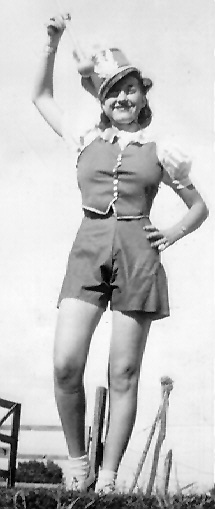 Our high school band took first place in most all of the Christmas Parades. We had first place in l935, 1936, and during this time I tap danced in programs as well. I was also in our high school plays and on the sophomore hockey team. I was on the track team going out for broad-jump, relays and the dash.
Our high school band took first place in most all of the Christmas Parades. We had first place in l935, 1936, and during this time I tap danced in programs as well. I was also in our high school plays and on the sophomore hockey team. I was on the track team going out for broad-jump, relays and the dash.
I was president of the pep squad and was a head cheerleader in high school. In one of those years, we decided in our high school that we would build a swimming pool. For three days they let all the High School out and all the kids went into the fields and picked cotton to earn enough money to build a swimming pool. I learned to swim in this swimming pool. I had already learned to dog paddle in the canal. I used to sing with Lavina Altman. One time she and I sang for the drama club called the Mask Club. I was president of the girls club, and in 1937 and 1938 received the Star Award for Outstanding Achievement. I was on the soccer and hockey teams in 1937.
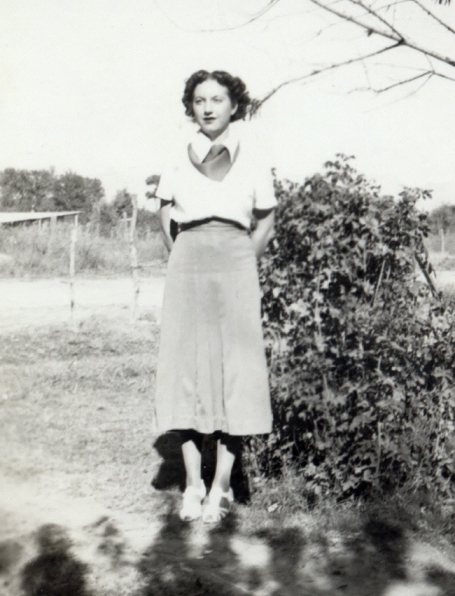
One of my high school teachers, Arlene D. Borquist, graduated from the University of Arizona in P.E. and dance. She was a very important person in my life. She started me in my dance career, and she taught me how to swim. I remember I took tap dancing from her and ballet and other types of dancing. I was especially good in tap. She turned her ankle and sprained it so badly that she couldn't walk on it, so she let me teach her tap dance class. That is how I got started in my dancing/teaching career.
FRIENDS IN HIGH SCHOOL
Some of my best friends in High School were Madge Foster,
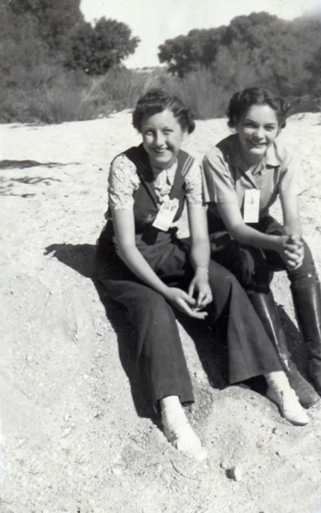
|
Hester Brimhall & Madge Foster 1937 |
Irene Jamison, Marjory Phillips, Elaine Allred (who was my greatest competitor), Florence Posey, Lavina Altman, Maureen Curtis, Mickey McBride, Adison Udall (who became a doctor and is inactive in the Church), Sims Phillips who was my boyfriend, Emmett and Elvy Hawkins, Kathleen Curtis, and Merrill Tyler. Merrill Tyler was like a midget. He played the bass drum in the band and you could only see the bass drum walking down the street when we had our parades. I was the Sophomore Class President in 1936, and on the student council for four years and loved it. I was a drum majorette all four years that I was in High School and I was the first drum majorette that the Gila Valley ever had. My counselors that year were Scott Busby and Ella Petersen. Katie Ruth Rollo and Walter Haywood were good friends of mine also.
HOW I EARNED MONEY IN HIGH SCHOOL
The way I earned my money when I was growing up was to baby-sit for the Principal of the High School. His name was Mr. Gutteau. I'd baby-sit three kids all day long, take care of them, do her washing and ironing and clean her house for fifty cents a day. I worked at the courthouse one summer as a secretary in the Welfare Department in Safford. I went to San Diego one summer and worked in Mrs. Litus' Cafe and earned quite a bit of money. I worked as a janitor at the school in the NYA Program. This was a program set up by Franklin Delano Roosevelt during his time as President of the United States. It was a Youth Assistance Program. I worked just helping the janitor at the school. I used to sell butter and fresh farm eggs, gather asparagus in the ditch banks and sell that. We used to pick figs and other fruit and sell them to our neighbors and friends. I also taught ballroom dancing at Gila Junior College to girls and to football players on the NYA Program.
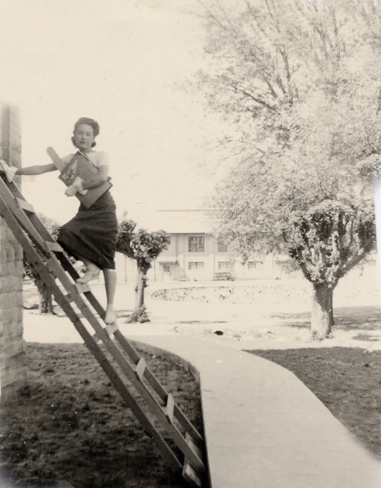
HS FRESHMAN YEAR
In my Freshman year the leaders in our class were Velma Hancock, Scott Busby and Madge Foster. In our Sophomore year we were very proud when we entered the new high school building in the year of 1932-33. We were going forth in search of broader knowledge than we then had. In the fall we went on a picnic near Thorpe's pond and we rode on a hayrack, which some of the boys had furnished. The Sophomores took a large part in the operetta. Four companions were Velma Hancock, Hester Damron, Walter Haywood, and Emmert Hawkins, who took main parts while most of the others took part in the chorus and the dance. We gave a Sophomore assembly in the spring and Mr. Norman Freeman and some of our companions gave a short play. This play was entitled, "The Lost Sons Pay the Mortgage." It was a comic scene with the setting in a broadcasting studio, and everyone enjoyed it.
HS SOPHOMORE YR.
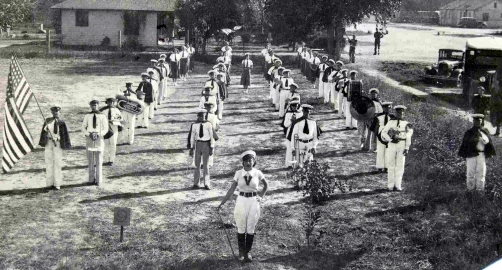
|
|
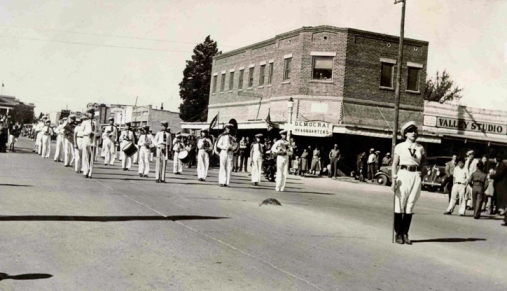
At the beginning of our Sophomore year we elected as our officers, Adison Udall, Scott Busby and Madge Foster. We went on horses and in cars up to the potholes. We were accompanied by an advisor/teacher. Our hockey team this year consisted of Hester Damron
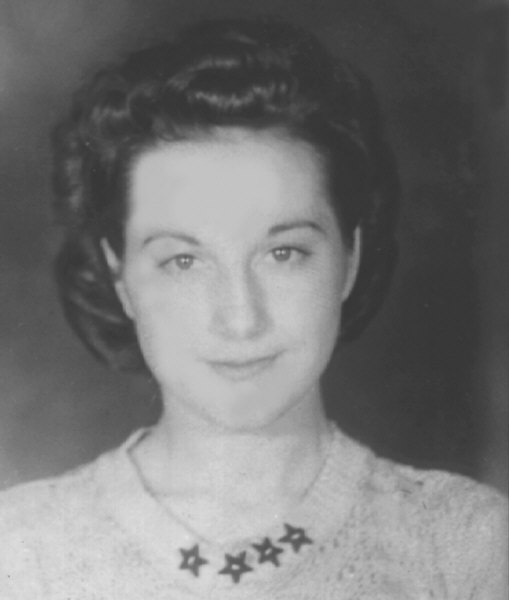
, Olive Green, Madge Foster, Elaine Allred, Florina Watson and Velma Hancock. Our class had more girls on the team than any other grade in high school. On October the 12th we conducted an assembly honoring the discovery of America. It is doubtful if Columbus's crew was any more frightened than those taking part in the play. In January we journeyed up to the snow on the Mt. Grahams and enjoyed a picnic there. Mr. Evans Madison accompanied us.
HS JUNIOR YR.
1935-1936 began with our leaders as Junior Class President, Hester Damron, Vice President Scott Busby and Secretary Ella Petersen. Our first class affair was a wiener and marshmallow roast up at the sand wash. We went on a second outing and had a corn roast at the river. In March we went on a picnic down to the Indian Hot Springs. We all took lunch and ate after we swam for awhile. We went in cars which some of the students furnished.
 & Friends 1936.jpg)
|
Hester Damron 1937 (Far Right) |
“So we bring to a close our fourth year of searching in our dear old Valley High School and we hope to be as successful next year as we have been in the past.” This was taken from the Valley High School Eagle paper.
HS DRUM MAJORETTE
My favorite subjects in High School were English, typing, journalism, speech, drama, P.E. and dance. Evan A. Madison came from B.Y.U. to teach music in Thatcher High School. He made a great difference in my life. He announced that he was going to form a band and that there was going to be a drum major in it.
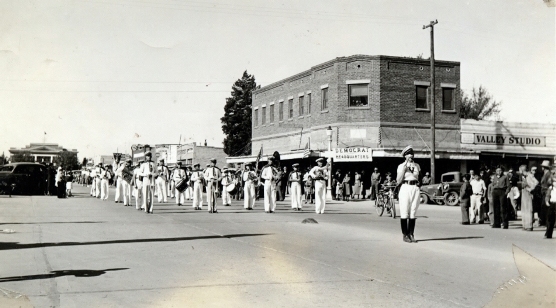
|
|
Anybody who wanted to could try out for drum major. Well, I hardly knew what a drum major was, but when he explained it to me I made up my mind that I was going to be the drum major. When he saw me walk he told me that there was no way that I could get it unless I could straighten up my walk. I was pigeon-toed and knock-kneed half the time. So, I walked on the lines on the sidewalk to and from school and corrected my walk. I worked and worked and worked with the baton until I learned to twirl it. He taught me. When try-outs came I won and became the drum majorette for Thatcher High School which continued through my Sophomore, Junior, and Senior years. Our band was so good that we took first place in the Gila Valley Christmas Parade every year.
HS PEPPERETTE CLUB
When I was in High School we formed what was called the Pepperette Club. The teacher or sponsor of it was Mr. Rosswell Willard. The club was organized late in September with Hester Damron as Captain and Head Cheerleader, with Alona Fuller and Katie Ruth Rollow as the other Cheerleaders.
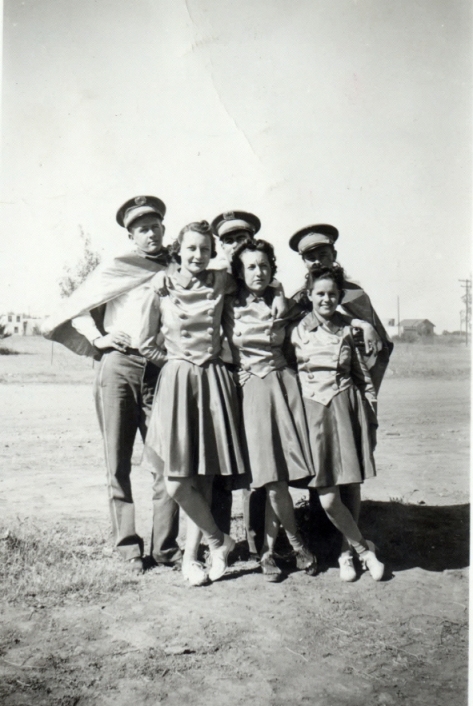
|
Hester Damron 1938 (Center) |
Our uniforms were green and white, the school colors. They were made of snowflake tweed skirts, eggshell silk blouses, white moccasin toe shoes, white anklets and we had white gloves. We performed for all the football and basketball games, for the special programs like assemblies and got everybody pepped up. We also traveled with the teams to Duncan, Miami, and other places.
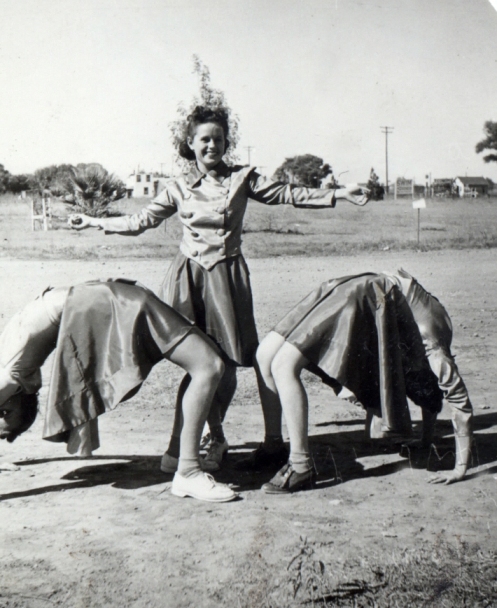
|
Irene Damron 1938 (Center) |
HS PLAYS
I loved drama and speech. I was in the operetta every year for the four years that I was in High School. I wasn’t chosen because I could sing well, but because I was a good actress and loved to perform. I also belonged to the drama club and was in all the plays in my Sophomore, Junior, and Senior years. One of the plays that I was in was "South in Sonora." Allen Allred and I did a Spanish dance in this play. Then I was in the "Playbill," where I played the part of Prudence Darling. My cousin Irene's husband, Marvin,
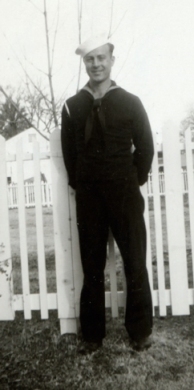
|
Marvin Owens 1945 |
still calls me Prudence Darling whenever I go to visit them because he said that part was of a flirt and the part fit me to a tee.
HS OFFICES
In 1937 and 1938 I was elected President of the Girls Club of Thatcher High School. The Vice-president was Gloria Rogers and Secretary was Nelda Hoops. The big bash of the year was the girls club annual dance and I was in charge of it this year because I was the President. We held it February 4, 1938. Fifty-eight couples danced to the orchestra that I'd engaged called the Arcadian. This orchestra was famous all over the Gila Valley for their music. The auditorium was beautifully decorated with palms, flowers, and a glowing moon in a blue ceiling. We served the refreshments out of a straw hat. We had a wonderful time. I went with the Student Body President, Ewart Lee, who’s father later was my Mother's Bishop for many years. Ewart was so bashful and didn't know how to dance, but we got out there and walked around and had a real good time anyway.
I was elected President of the Sophomore Class with Elaine Allred as vice-president and the Secretary was Marge Kempten. Our Senior president was Emert Hawkins, our Junior President was Harold Tate, our Sophomore president was Mattie Franks and Freshman president was Gerald Eccoles. I was the Girls Club President and Walt Hayward was the Boys’ Club President. We worked a lot together.
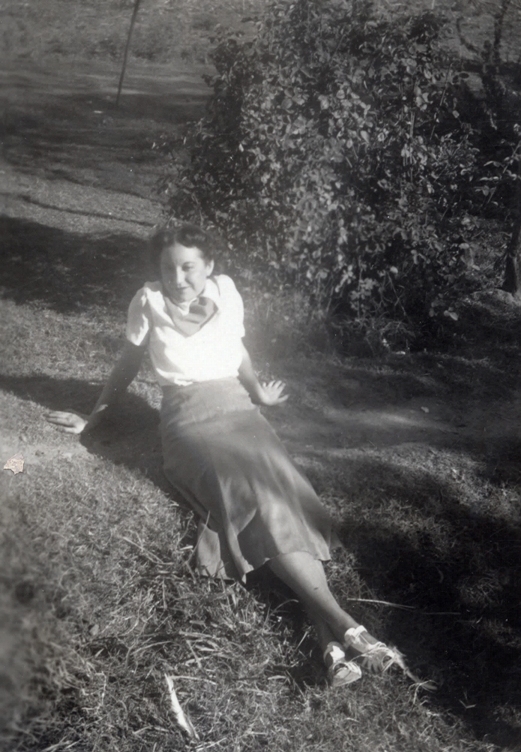
|
Hester Damron 1938 |
When we were Seniors there were only 28 Seniors in our class. We were the first students to graduate from Thatcher High School. In my Junior year I received what was called the Star Achievement Award, which was a really good award that everybody tried to accomplish. I got this award along with Elaine Allred, Walter Haywood, and Madge Foster.
JR. COLLEGE
I attended Gila Junior College one and one fourth years. I attended Northland Pioneer College the spring and fall of 1981 and 1982, and I took classes in swimming and auto mechanics in 1984. In 1983 and 1984 I took swimming, microwave cooking, and oil painting and since then I have taken many other classes over the years.

COLLEGE MAJORETTE
After I graduated from high school and I went on to college, I tried out to be the head drum majorette, but I didn't make it. My boyfriend, Nile Clifford from Safford who was an excellent drum major, won the head drum major. He was really good. Mamie Layton and I were chosen as the girls who stood on each side of him, twirled our batons and marched in all the college band functions for the football games and the parades all over the country. We really had a good time.
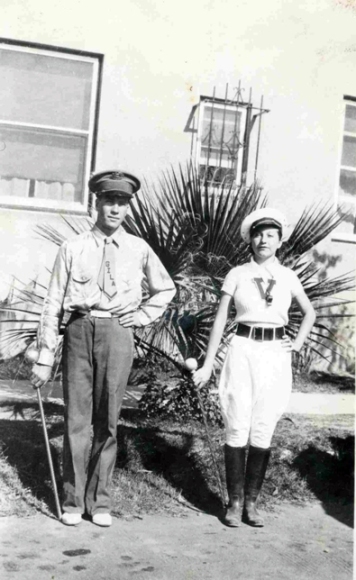
|
Howard Madison & Hester Damron |
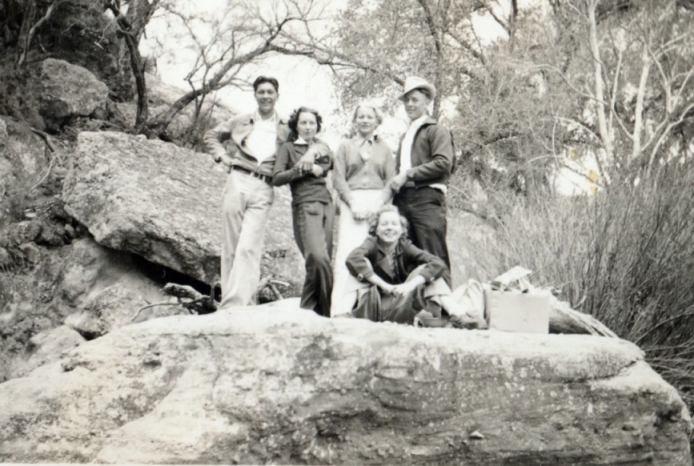
|
Nile Clifford, Hester Damron, Irene Damron, Marvin Owens & Unknown 1938 |
<
CHAPTER 7: MARRIAGE AND LIFE WITH VAUGHN LORENZO BRIMHALL
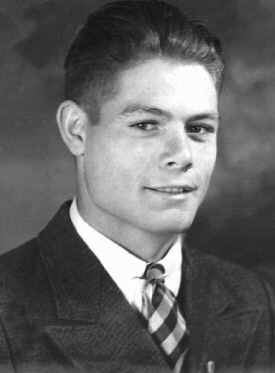
MEETING VLB
I met my husband Vaughn Lorenzo Brimhall when I was eighteen years old while I was living at home in Thatcher.
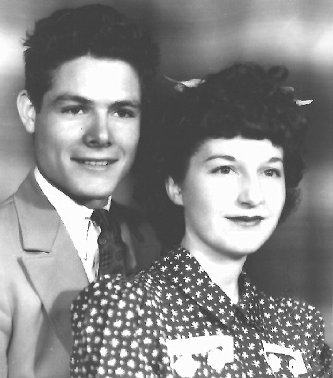 I was first attracted to him because he was from another town, good looking, bashful, built-well and went to Church. He was a good singer, a good dancer and boxer/football player at our college. The first date we ever had was when we were both in the same play at the college. We walked home together. He said he was attracted to me because I was a high-stepping drum majorette in high school and college. We were married November the 25, 1939 in Pima County Tucson, Arizona by LeRoy B. Pepper, President of the LDS Tucson Branch. The witnesses were my cousin Irene Damron Owens and her husband James Marvin Owens.
I was first attracted to him because he was from another town, good looking, bashful, built-well and went to Church. He was a good singer, a good dancer and boxer/football player at our college. The first date we ever had was when we were both in the same play at the college. We walked home together. He said he was attracted to me because I was a high-stepping drum majorette in high school and college. We were married November the 25, 1939 in Pima County Tucson, Arizona by LeRoy B. Pepper, President of the LDS Tucson Branch. The witnesses were my cousin Irene Damron Owens and her husband James Marvin Owens.
We spent the night at my Uncle Georges and then went to Clifton, Arizona the next day. Our honeymoon was in Tucson and Clifton, Arizona. We rented a house in Clifton as as a surveyor. Vaughn was working for Phelps Dodge, a copper mining company.
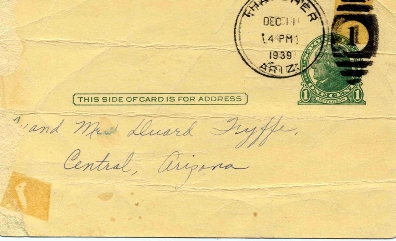
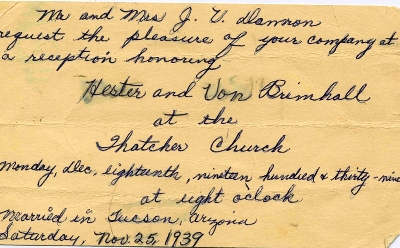
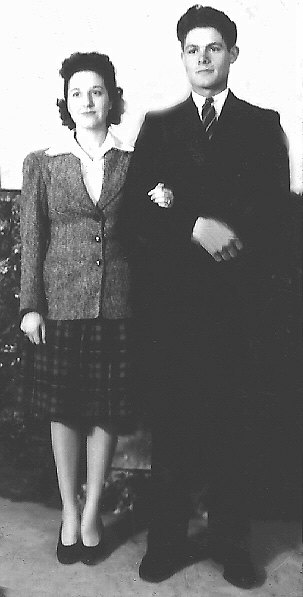
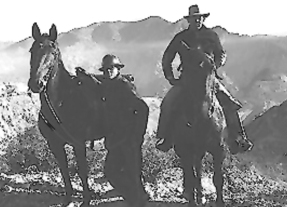
|
Von Brimhall (Left) |
Later we moved to Morenci in an area named Stores to be nearer to his work. Three months later we moved to Winslow, Arizona where Vaughn hired out on the Santa Fe Railroad. We were endowed in the Mesa, Arizona Temple on the 27th of October 1942 by Charles V. Pugh. The witnesses were W. B. Maxwell and George A Martineau. When we left the temple that day, it was as though Vaughn left a stamp of his being and image upon my heart forevermore! Our goals and plans for the future were to get along, to have a family, to bring them up in the Gospel, to have them develop their talents, get married in the Temple and to go to college.
VLB AND JUMPING THE DITCH
When Vaughn started courting me, my cousin, Irene Damron, was living with our family and going to college with me. We were dating these neat guys from Taylor, Arizona. I was going with Von and she was dating Vincent Lewis. Every time they were supposed to come and pick us up they were always late. We could never get them to
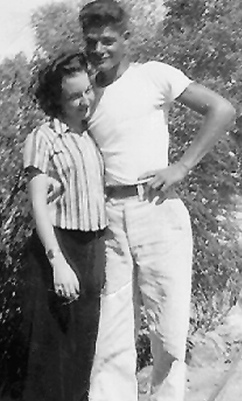
tell us why until one day we coaxed and coaxed and they finally told us. They said that they always got ready to come by washing and ironing their white shirts and did everything to get all “dooded” up before leaving. They would always come to the house by way of the big ditch (the irrigation canal) and one would always challenge the other to try to jump it.
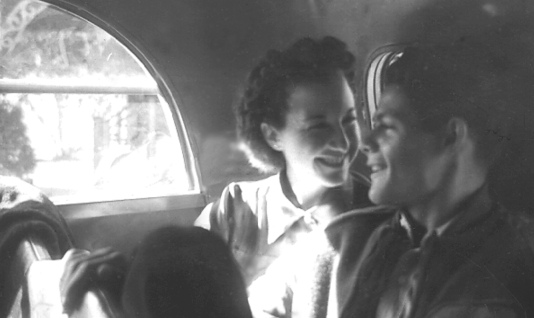
It was about 18 feet wide and so they always both tried and always fell short into the muddy water. They had to go back home and change their clothes. Neither of them ever successfully made the jump across the ditch.
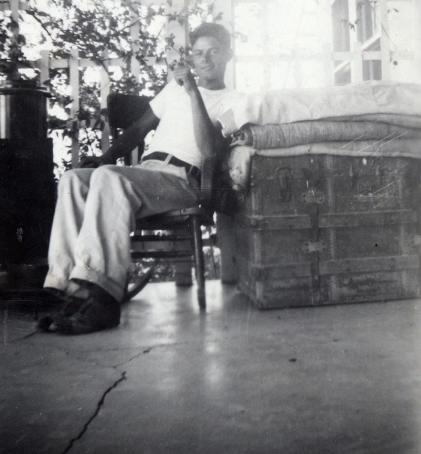
|
|
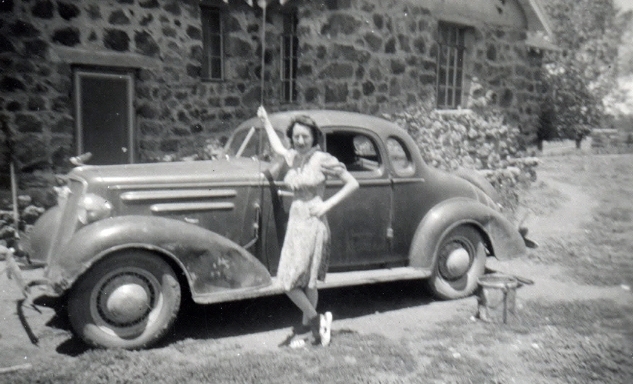
HOSPITAL BLESSING
I had to have a hysterectomy after I had been married for several years. When I was recovering in the hospital sleeping one night, I had this horrible nightmare. I dreamed that I was in a racial war between coloreds and white people and that I was trying to drag all the tubes that were going into my body along with me as I tried to get away from the colored people who were after me. When I woke up I started crying and I rang for the nurse because I was almost hysterical. I told her that I needed my husband to come and give me a blessing and that he was at the Green and Gold Ball at the Church. I asked her to call the Church. She said, "It's about midnight, and I don't think I'll call your husband." And I told her, "Well, If I was a Catholic would she call the Father?" She said yes she would. I said, "It's just the same thing. I want my husband and Tom Whipple to give me a blessing." So she called him. I was still crying when they came. I told them that I'd had a nightmare and that I needed a blessing to calm me down. They laid their hands upon my head, gave me a blessing and I calmed right down. This was a very inspirational experience for me. It left me with a calm, peaceful feeling. I was able to start
on my way to recovery after that.
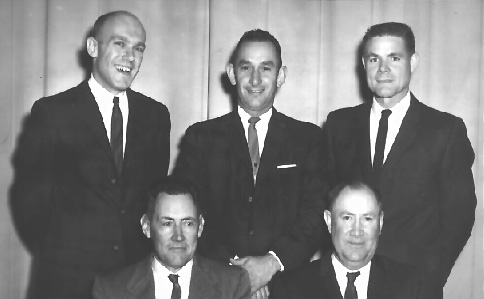
|
Winslow Ward Bishopric |
VAUGHN’S HEART ATTACK & BLESSING
In fall of 1972 we were truly blessed when Vaughn had a heart attack in Provo, Utah while leaving our daughter, Amber, at BYU. One of Amber's boyfriends was with us when this happened and we were only two blocks away from the Utah Valley Regional Medical Center. He and Don Thompson, my daughter Brenda’s husband, gave Vaughn a blessing. Vaughn said that as soon as they laid their hands on his head and gave him the blessing he felt such a calm feeling. For all the next three months of recovery he was the best patient and just knew that he was going to get well. I think that's why he did so well all the time that he was recovering from his heart attack. The blessing he received gave him a tremendous testimony of the truthfulness of the laying on of hands.
MY HUSBAND
As time passed there were many things I grew to admire in my husband and my tribute to him is that he never gives up. He has a good outlook on life. He handles his role in life as a husband, as a father and as a grandfather with excellence. He has a true trust in God and is always faithful to family and Church. He is a very clean person who bathes often, smells good and looks nice. He has much endurance.
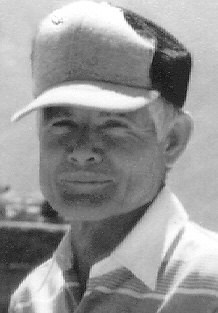
|
Vaughn Lorenzo Brimhall |
He had admirable goals for each of our children and held two jobs to provide for us well so that they could develop their talents. He is friendly and remembers people and their names and they like him. He has always been patriotic towards his country and served it well in World War II. His calmness and bravery during his illness of congestive heart failure and trust in God I know helped him. He started a new business at age 53 as a Masonry Contractor and retired when he was 63. He worked on the Santa Fe Railroad as a fireman/engineer and ran a masonry business on the side for 29 years before establishing his masonry business full-time. The following is a tribute I wrote about him in 2004, some 18 years after he had passed away in 1986.
TRIBUTE TO MY HUSBAND
“Tribute to My Husband
By Hester Elizabeth Brimhall
These few paragraphs are about a man who learned that living each day honorably with faith in God and a selfless concern for others can make for a truly wonderful rewarding life.
An ordinary fellow who thought he hadn’t accomplished much in his lifetime but his many kindnesses to acquaintances, friends, neighbors, widows, strangers, relatives and loved ones have changed the lives of innumerable people.
The ripples of his loving ways have spread wherever he went helping make this world a better and a more peaceful place to live. On his headstone is inscribed, “The Peacemaker” because of the never tiring efforts he put forth to keep harmony among his thirteen brothers and sisters.
Von loved the family ranch and shouldered his responsibilities there admirably, whatever the job entailed. He had the feel of the worthiness of this family venture, as his father before him exhibited. He could see the great uniting qualities it had in bringing family members closer to the softening of our hearts to each other and to our Father In Heaven.
A test, if you will: One of his brothers said, “If we can pull together in this lifetime project and remain united, we have a much better chance of gaining the same unity in the heavens above.”
Most everywhere I gaze when I am there I see his hand and foot prints everywhere offered to all through his devoted labors and love.
It should be considered a joy and a blessing to all of you who have any of the blood of this good man flowing through your veins. Hopefully you also can have that jaw-thrust-forward-look which meets life like a plow and think you can accomplish anything you want and need too, as he did.
Being a man of many facets and all turned on, he struggled with heroic problems and often came out the winner. But if not, he rarely gave up the fight. His unspoken motto could have been, “Success is a ladder that cannot be climbed with your hand in your pockets .”
MAMA LIVED WITH US
One of the trials that really affected me was that I felt a great responsibility when I took over the care of my Mother when she was ninety-two years old and came to live with us. She stayed with us for five years. Years before, in the 1950s, Vaughn had paid for and built with his own hands, a new home for Mama where she resided for many years with my brother Ray until he died. The new home is located right in front of where our old adobe home in which I grew up used to stand in Thatcher. Mother was able to care for herself until she reached 92. I will always be grateful to Vaughn for caring so for my Mother.
THE WRECK
“The Wreck
By Hester Elizabeth Damron
Without warning the car careened out of control after hitting black ice. I breathed an, Oh! No! as it floated out and off from the road. As we went down the embankment the right tire hit a large rock at 55 miles per hour and turned us completely around. The rear of the car hit a tall, dirt embankment and came to a grinding, crashing halt.
Von was lying on the back seat and luckily had no injuries. I was in the drivers seat in my seat-belt. He raised up and said, “What happened?” I told him, and as the engine had died upon impact, all I could think of was trying to get back on the road, so I tried to start the engine. He quickly said, “No don’t, we may have a ruptured gas tank!” I got out to look around and it was such a miserable sight of mud and snow all churned together that I started crying.
I knew I couldn’t get Von out of the car as it was a two door and sitting at a weird angle. After 13 years Von had recently suffered a second heart attack and we were on our way to Salt Lake where he was receiving monthly treatments. He was weak and I was so afraid that the trauma of the accident would cause his heart to stop beating.
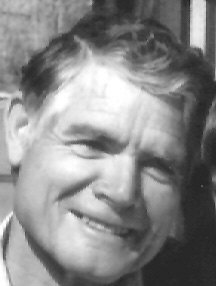
Soon a couple of scroungy looking young men came by and seeing we were in trouble offered to help us. The wind was blowing snow and hail and it was so cold. I told them Von was ill and I couldn’t get him out of the car, so they assisted him and told me to go sit in their warm pickup truck.
They struggled and finally got the car on the road again. I can still see Von standing in the mud and snow, watching helplessly as they did all they could to correct our problem. The right tire was bent sideways, but Von drove us into Page to a garage and the young men followed us just in case. Von paid them $20.00. They had come from Kanab to Page to pick up a hot water heater.
My brother Jack’s two sons, Gary and Jody, came and helped us and we finally got into a motel where Von became very ill and started vomiting. The next day we flew to Salt Lake City and went by taxi to the University of Utah Medical Center.
I related to the Doctors what had happened, but they went ahead with the tests that were scheduled even though he had just gone through a traumatic experience. Von was part of their experiment concerning a new heart drug. He did very poorly and went down hill form then on. We finally had to enter him into the University Hospital where he stayed for several days.
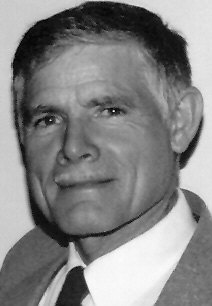
To really believe that one is about to die is hard. Hospital patients, ill beyond cure as he was, criminals walking to the gallows, sailors on sinking ships all cling to a secret hope that some retreiving word will lift the nightmare. Each have their private hope and think that they might be the exception and survive, and Von was no different. On April Fools Day 1986, while resting in the bed of my little granddaughters, Alicia and Christina, he turned his face to the bed room wall and breathed no more. All our heads were bent in sorrow at his passing!
CHAPTER 8: OUR CHILDREN AND HOME
CHILDREN
Ricky (Richard Logan Brimhall) was quiet spoken, very talented, a wonderful brother, reckless, and a kind son.
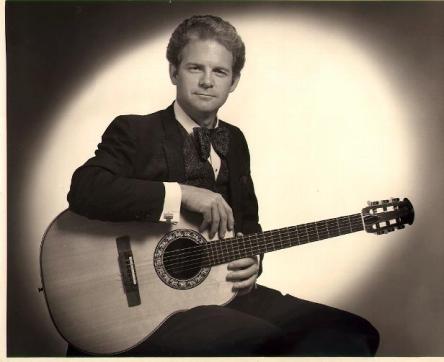
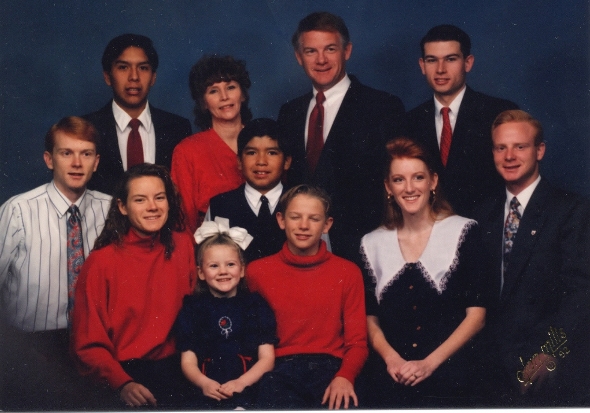 |
The Richard & LaPriel Burnett Brimhall Family 2001 |
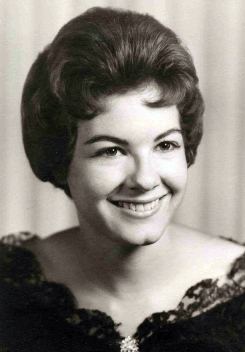 Marsha (Marsha Evonne Brimhall Phelps) was sweet, patient, talented, and a very good person.
Marsha (Marsha Evonne Brimhall Phelps) was sweet, patient, talented, and a very good person.
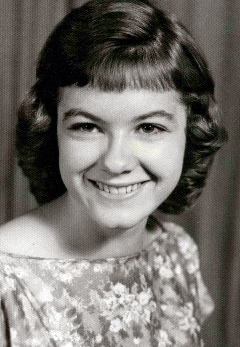
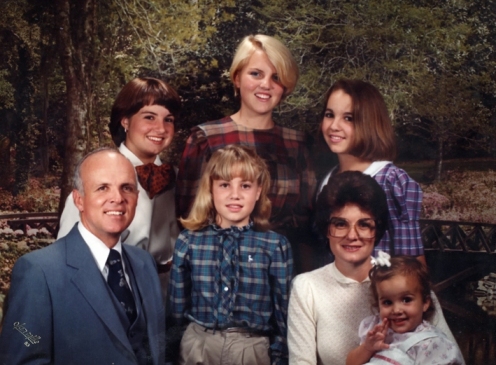
|
The Doug & Marsha Brimhall Phelps Family 1975 |
DeeDee (Brenda Dee Brimhall Thompson) was our post-war baby, difficult until about eleven years old and stubborn, but did things well
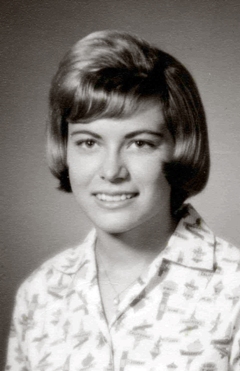 when she wanted to. She disciplined herself well and was
when she wanted to. She disciplined herself well and was
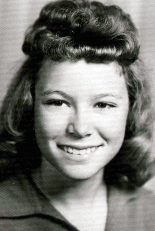
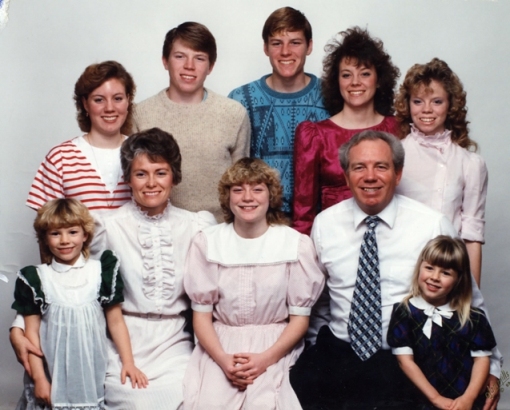
|
The Don & Brenda Brimhall Thompson Family 1992 |
Jody (Sylvia Ann Brimhall Nielsen) was next. Vaughn said she was born with a sweet spirit, easy to manage, patient in manner and modest in dress, talented in dance and could work well with her hands.
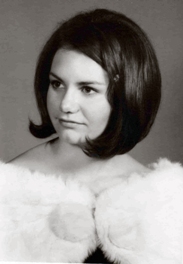
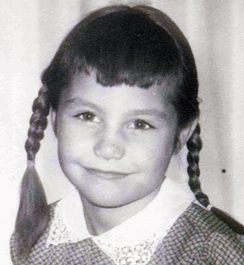
.
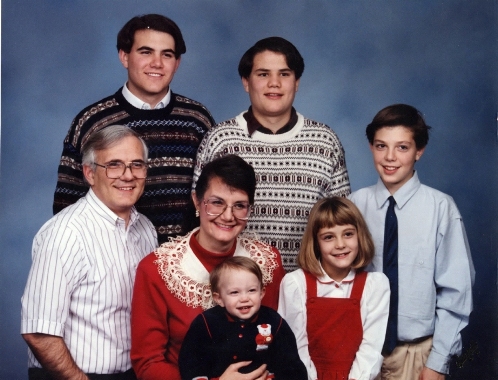
|
The Jim & Jody Brimhall Nielsen Family 1993 |
Amber (Amber Brimhall Smith), our baby, was our ray of sunshine in our lives.
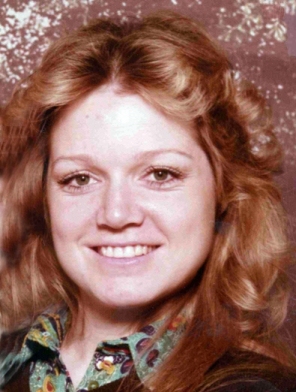 Loving, spirited, talented, friendly, generous, and naive to a point where she believed anything anyone told her.
Loving, spirited, talented, friendly, generous, and naive to a point where she believed anything anyone told her.
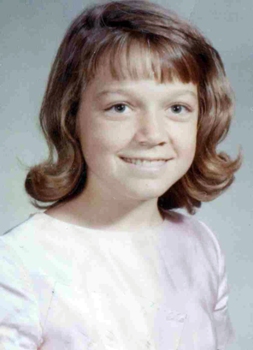
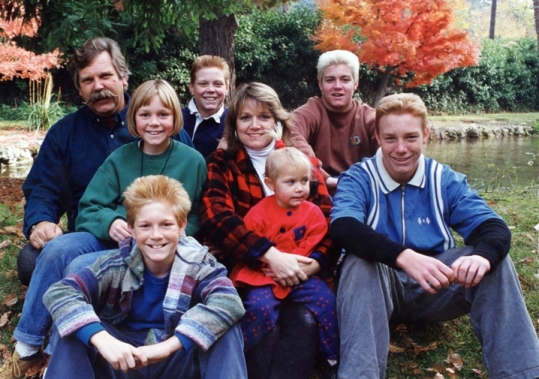
|
The Dave & Amber Brimhall Smith Family 1993 |

|
The Vaughn & Hester Damron Brimhall Family 1965 |
HUMOROUS EPISODES IN OUR LIVES
Amber walked at 8 months, but didn’t have any teeth at even 9 months. We got the best dog we ever had at the same time she was born. His name was Boots because he was brown with 4 white feet. He was such a neat dog! Von would talk baby baby talk to him and he would just whine and bark and wag his tail a mile a minute. Amber and he grew up together.
When Amber was little she would run away to visit the Cardon’s and the Tanner’s chicken and rabbit pens. One day when I was looking for her, I would call and all I could hear was her grunting sound. I finally found her and our dog, Boots, in one of the rabbit pens. Both were eating rabbit pellets and having the best time. They had been locked in from the outside so I suspect Jody and Sandra Manker (Jody’s friend) had a hand in it.
When Ricky was 11 years old he woke up in the middle of the night all choked up with the croup. When I went into care for him he said, “Mama, (pant, pant) do I have polio of the iron lung?” I couldn’t help but laugh and finally convinced him that he just had the croup. This was at the beginning of the 1950s and polio was a dreaded disease that he saw talked about in the shorts at the Rialto Theater in our town every saturday afternoon matinee. In fact, they took up collections in the theater every week for the kids who were confined to the monstrous iron lungs.
On June 1st 1953 we went to Thatcher to start building my mother a new small two bedroom house, as the one I was born in was falling down because the adobes were washing away in a corner of the kitchen. We took out a second mortgage on our home in Winslow to do this and went at it with vim and vigor. We poured the foundations first and then the floors. This part took us four days. Those helping were Annie, Casey, Nancy, Clark, Chet, Ray, Grant and our children. Amber was four months old at this time. Everyone wore out on this part of the job, so I helped Von screed off the concrete, etc. and we finally finished at midnight the fourth day. Ray, Ricky and Grant were digging the cesspool and Ricky got tired, (he was 11 years old) so he stopped to rest. Grant told him if he didn’t get busy he was going to kick his hind-end. Ricky stood right up to him and told him to just go ahead and try. Uncle Grant wisely backed down trying a smoother approach which worked and got Ricky up and working again. Ray loved to tell this story again and again about how Ricky stood up to his uncle. We all finally got so tired that we went back to Winslow until Von’s vacation time came in July. We returned on July first and worked 12 to 14 hours a day through the 23rd and moved Mama and Ray in on that day. Von and I slept on the concrete floor of the new house on a cotton mattress and would get up at daylight and work until midnight most nights. Marsha did a lot of baby sitting with little Amber and Mama and the other girls helped so that I could work with Von. Ann and Casey had to go home, but they left Clark and Nancy with us and Marsha, Jody and Clark all had the three-day measles during this time.
Marsha, Brenda and Jody worked all one morning setting a paste board box trap with grapes in it for bait to catch some birds. Late in the afternoon they ran to the fallen box with great excitement and found that they had trapped one of Grandma’s old red hens. Another day they made a teeter-totter out of a saw horse and a wide board. Jody was riding in the middle and caught her hand between the board and the saw horse. Marsha rushed up to rescue her and while lifting Jody up lost her balance and fell over backward with Jody on top of her. They both opened their mouths at the same time to cry and Jody’s big wad of bubble gum fell into Marsha’s mouth. It was such a shock that they both quit crying and started laughing. At this time, August 25, Amber was seven months old and weighed 14 pounds and 6 ounces and Ricky was 11, Marsha 9, Brenda 6 and Jody was 2.
When we got home from building Mama’s new house the kids had the measles so to give Marsha something to do and keep her in the house, I taught her how to make honey taffy. She made it almost every day and Ricky loved to tease her when she was busy. She finally took all of him that she could and became so mad that she dumped a gallon bucket of honey over his head. Honey dripped and splashed everywhere. Of course, he had to get even so he smeared honey all over her long ringlets and they had a regular honey jamboree. That same evening as I was making sandwiches Jody was in her usual spot sitting on the drain-board with her bare feet in the sink while watching me work. I had a tuna mix in a large bowl sitting in the sink and turned to go to the refrigerator. I soon heard her just giggling and having the best time. When I turned around there she was with her dirty feet in the bowl squishing the tuna up between her toes. What a life! What a lot of fun!
The next day Marsha, Brenda, Nancy, Clark and Ricky were to go on the train to San Diego. We called Annie to tell her Clark was all broken out with the measles and to ask if we should send him or not. She said yes, so we put a pair of dark glasses on him and away they went. They had a great time and arrived safe and sound.
June 16, 1953 Last night when we were ready to say the blessing at dinner, Von kept telling Jody to close her eyes. Finally she looked up at him with her big brown innocent eyes and said, “Daddy, I won’t sneak noth’en!”
In October 1954
Von was working on the trains at the Grand Canyon.
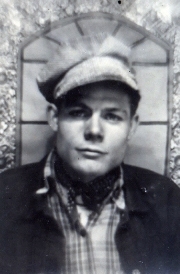 He called and said that he was lonesome and for me to get the kids into the station wagon and come up. We were so thrilled to see him that we just about floored him with hugs and kisses. We stayed at a cabin and the kids were so impressed and we had such a happy time. The next morning, real early, the kids got dressed and rushed over to see the canyon. Brenda came rushing back and took hold of my hand and said, “Mama, hurry, hurry and come and see the big ditch! It’s all froggy inside!” We ate our meals at the Bright Angel Lodge and hunted and picked piñons. We really had a good time together.
He called and said that he was lonesome and for me to get the kids into the station wagon and come up. We were so thrilled to see him that we just about floored him with hugs and kisses. We stayed at a cabin and the kids were so impressed and we had such a happy time. The next morning, real early, the kids got dressed and rushed over to see the canyon. Brenda came rushing back and took hold of my hand and said, “Mama, hurry, hurry and come and see the big ditch! It’s all froggy inside!” We ate our meals at the Bright Angel Lodge and hunted and picked piñons. We really had a good time together.
When Ricky was about 12 years old we went to San Diego to visit Aunt Ann and Uncle Casey and to go deep sea fishing. When we got there Ricky and I started taking sea-sick pills preparing for the fishing trip on the ocean, but Von didn’t think that he would need any. When we got out to sea the boat started rocking back and forth and pretty soon I noticed that Von wasn’t with his fishing rod any more. I looked along the side of the boat and he was laying there with his head hanging over throwing up. To make it worse, every time he would throw up the the effort would produce a big windy. He soon got better, returned to fishing and caught the biggest albacore of the day and won the $36.00 money pool he had entered which made him feel better about the whole affair. Ricky and Clark had a great time stuffing firecrackers and cherry bombs down the gullets of the bait fish and throwing them to the seagulls trailing the fishing boat. They would really squawk when they exploded.
In January 1954 Von, Brenda and I went to the movie. The main actor was always getting in trouble. Brenda leaned over to me and said, “His name should be Dutch.” I said, “But why?” She responded, “He is always getting into Dutch so they should of named him that.” We thought that was pretty smart thinking for a six year old.
When RIcky was 12 years old he gave a talk in Church on January 24 1954. He told the story of how Granddad Brimhall got lost in a place called The Devil’s Box Canyon while hunting for his family’s cow that had strayed. For three days he searched wandering up and down the canyon and lived on spit and pine gum. He was lost and prayed a lot that Heavenly Father would help him find the way out of the canyon and He did. At the ending of the talk he said, “It is my blessing that we will all be prayerful and have faith such as this. In the name of Jesus Christ. Amen.” We were proud of him.
On the 26th of January 1954 we had been hearing our three year old Jody singing parts of little songs she had been listening to on the phonograph (record player). Sitting on Ricky’s bed one day we heard her sing, “Skip, skip to my Lou, What’s my Heavenly Father gonn’a do? Skip, skip to my Lou, Skip to my Lou you darling.”
When Jody’s third birthday came we invited 10 of her little girl friends to come and they all dressed up like Mamas and brought their dolls. They had so much fun having a tea party for their dolls, playing London Bridges Falling Down and having a parade. When the party was over with, and their Mothers came to get them they all cried because they didn’t want to go home.
At one General Conference of the Church Apostle Kimball warned us that our children would marry the girls and boys they dated. He encouraged us to have them date members of the Church. So, we encouraged Ricky to date only Mormon girls. He wanted to take Helen Kay Peterson swimming so I said that he could. When he called her she said that she had lost part of her swimming suit so she couldn’t go. So I coaxed him into calling Mary Lou Shreeve, a Mormon. She said yes and then the other girl called back and said she had borrowed a suit and could go. Ricky was frantic and asked me if he could go with both of them. I told him to invite her for the next day, which he did and it worked out fine. He wanted to take Mary Lou to a movie after swimming, but we didn’t have any money.
When Sylvia Ann was about two years old, Von took her to the Valley National Bank with him.
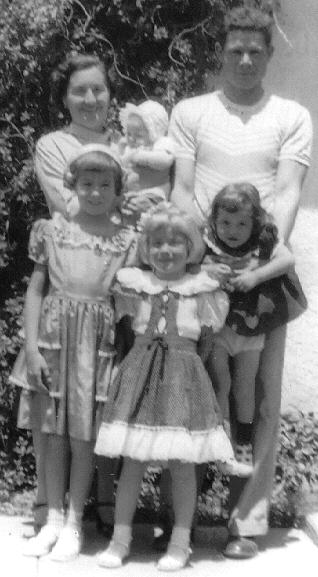
|
Vaughn & Hester Damron Brimhall Family 1953 |
They stayed quite awhile and it was near closing time when he looked down and saw that she had messed her pants and that much had fallen out of her diaper onto the floor. It looked like sheep droppings. An old colored janitor was cleaning the floor. He only had one eye and couldn’t see very well. He had started picking up the droppings with his hand and putting them into a waste basket. Von walked over to him and said, “Hey, Don’t do that!” The old man answered, “Oh, it’s OK, dis is only chocolate drops.” Von responded, “Chocolate drops, man those are baby mess.” The old man really started hopping around and he dropped what he had in his hand.
That same week Von took Amber to Babbitt’s Department Store and she messed down both legs. He swooped her up trying to balance her back and forth so it wouldn’t run of from one leg or the other onto the floor as he headed for the door, but it was too late. By the time he came back in from cleaning her up in the car, they had already cleaned up the mess.
At different times Amber climbed upon the kitchen table and got into everything. The first time it was mustard. She had it in her hair, all over her face and down her legs. It was even all over her feet as she had stuck them into the jar. The next time was right after breakfast. She got on the table and mixed sugar in a half gallon can of honey, then poured it into the peanut butter and then back and forth and smashed in all over the place. What a mess!
When Jody was little and couldn’t talk yet, she’d get a little gun and point it at us and exclaim, “pee-urn, pee-urn!” That was the best she could do for bang bang.
One day Marsha was outside on the grass and called to Amber. “Come and see the lady bugs.” Amber who was 5 came running out and squatted down and looked closely to study them. Then she asked, “Marsha, Where are the men bugs?”
In 1959 Amber was losing a lot of her baby teeth. She would put them under her pillow and the Good Fairy would come, take each tooth and leave her money. From this experience, she must have thought that the Good Fairy transplanted all of these teeth into her own mouth because of what happened next. As she was watching TV one evening a woman singer was really going at it.
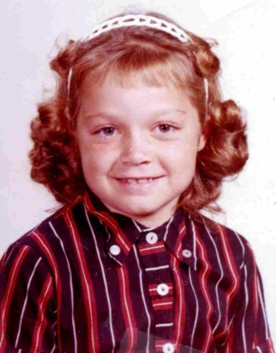 She had a huge mouth full of shinny, white teeth. Amber got really excited and yelled, “Look, look, Mama, That must be the Good Fairy. Look at all the toothus in her mouth!”
She had a huge mouth full of shinny, white teeth. Amber got really excited and yelled, “Look, look, Mama, That must be the Good Fairy. Look at all the toothus in her mouth!”
Feb. 7, 1959 was Amber’s birthday and my Mother sent her a dollar, so she went to the Rex Guilt’s Triangle Grocery Store and bought a kite. They didn’t put the roll of string and the tail into a sack so she put the kite in her mouth and the other items in her hands and began walking home. She had just about made it home when a big collie dog came running up and grabbed the kite right out of her teeth into his and began running away with it. She just about died. She dropped the string and the tail and came running in the house screaming bloody murder! I came out of the house on a run and chased that dog all over the place, but he never let go of the kite in his mouth. Finally our little dog, Boots, got brave enough and caught up with the collie. He clamped his teeth onto the big collie’s neck until he dropped the kite. I grabbed it and we both ran home. Boy! Was Boots our hero!
Several years later we were living at the home Vaughn built for us at 200 East Gilmore in Winslow. Boots was snoozing on the rug in front of the fireplace where it was warm and cozy. I was talking on the telephone and was facing him. He opened his eyes and looked out the sliding glass door just as the neighbor’s cat, who he didn’t like, walked across outside. Boots immediately jumped up and ran at the cat slamming into the glass of the sliding glass door. It knocked him a winding and he lay stunned, out cold on the floor for a few minutes before waking up. For a long time after that, every time he would pass by the sliding glass door he would snarl, growl and flinch away from the door.
We had this mean cat named Dinky. We got her as a kitten and she must of been born mischievous. One day Von was sitting on the couch reading the newspaper. I glanced up and saw Dinky stalking him creeping up on the back of the couch. The cat crept closer and closer until it was right behind Von’s head. Then it leaped right onto the top of Von’s head. The man came to life in a hurry and we almost lost our pet cat right then and there!
Mr Arthur, the high school music teacher, was a bachelor so I made a deal with him that I would fix a good dinner for him every Thursday night if he would come and give Ricky a voice lesson. The piano was in our sunken living room which was divided from our family room and kitchen combo by a see-through fireplace. On this evening when they had finished the lesson, I called them to come and eat. As Mr. Arthur put his right leg up to the second step coming out of the sunken living room, Dinky leapt from the fireplace clamping all four paws and their sharp claws around this wandering leg. What a dance this man did yelling all the while! It was terrible, but we all just about died laughing! Poor Mr. Arthur!
One day it rained and rained and the next morning Marsha came running in the house so excited because there were little frogs everywhere. She got the little red wagon and the kids filled it full of frogs and pulled them around the neighborhood the rest of the day. They had the best time playing with them. I have never again seen so many frogs in Winslow.
Amber walked when she was 8 months old because she wanted to keep up with all the kids in the neighborhood. She was so cute, short and chunky and could get out and travel in a hurry. I just couldn’t keep track of her so I coaxed Von to build a white picket fence around the front yard to keep her in. We couldn’t afford the $100 for materials, but we decided to do it anyway. It took Von about a week’s work to complete it. It was so pretty! On the day it was finished I got Amber all cleaned up and put her out on the front lawn in the sunshine feeling so secure now that we had a fence. Ten minutes later I decided to check on her and both she and the dog were gone. She had climbed over the fence and I could just see her little body moving through the spaces between the pickets as fast as she could go with the dog. She and Boots had such fun together. They would run and play and she’d always try to ride him, but he was such a tiny dog she’d just smash him to the ground. He’d just lay there until she was ready to get off.
Amber was so quick that you really had to watch her. Once when my sister Melda was visiting, she opened the fridge door and Amber sneaked around her grabbing a cube of butter. She took off running and had opened it and eaten half of it before Melda caught up with her. We laughed and laughed about this for years.
Amber was naughty one day and her Daddy spatted her seat. She was mad and feeling hurt and the other kids laughing at her didn’t help. She was so frustrated that she didn’t know what to do. She spied Boots sleeping peacefully on the floor, so she ran over and kicked him. Then she really got in trouble!
For Amber’s first piano recital she practiced and practiced. The big day came and all the family went including Ricky’s friend, Gervase Hale, who was like one of the family. We suffered through about 20 numbers of beginners and finally here came our Amber. She played the whole number just beautiful and then she had a run at the end requiring that she cross her left hand over her right to hit the last crowning note. She missed and it actually jarred the senses. To her and to her teacher, Mrs. McNelly, it was a tragedy, but we all laughed about it and told her she would do better next time. She came dragging home all down in the dumps. As we arrived at our door step, there was a big box of chocolates in a beautiful box addressed to Amber from Gervase, who had to go to work right after her number finished. There was a card congratulating her on her first big recital. It just made her day!
Ricky was the best brother ever and took really good care of all four girls, but he just loved to tease them. Once when we had just purchased a new deep freeze, he took Amber and put her inside to make the rest of the girls bawl and then took her right out. Amber didn’t care, but the rest of the girls thought that she had been frozen solid so they really tattled on Ricky. Ricky always challenged all four of the girls to wrestle him at the same time.
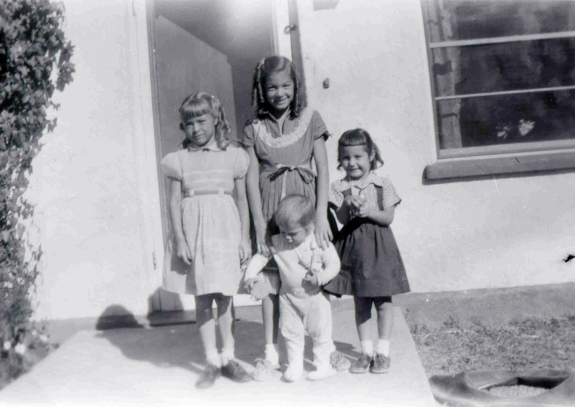 They would do their darndest, but he would always over come them until they got a little bigger. He would end up sitting on them and they would squeal their heads off. Then one time they finally got him down and gave him a bloody nose. This was about the time they were becoming teenagers, so it all stopped, but they loved it!
They would do their darndest, but he would always over come them until they got a little bigger. He would end up sitting on them and they would squeal their heads off. Then one time they finally got him down and gave him a bloody nose. This was about the time they were becoming teenagers, so it all stopped, but they loved it!
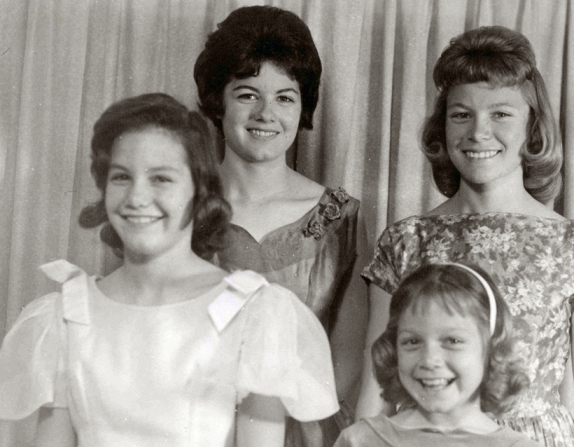
I guess you could say that Ricky invented pie throwing in our family. For lunch this day, I made two blackberry pies and they were still warm from the oven when the kids got home. He started teasing Marsha about something and she said something that he didn’t like. He picked up a pie and put it right in her face. She really did cry, but I think it hurt her feelings worse than the warmth of the pie. Many things happened on that big snack bar in our home on 200 East Gilmore.
One day during lunch hour I was out of sugar so I told Brenda to go to the Mitchells and borrow some.
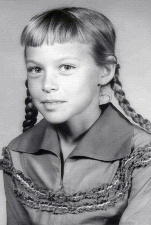 She didn’t want to go, but I made her and Ricky made a smart remark as she went out the door. She was obeying me, but she walked as slow as possible putting one foot right in front of the other. To hurry her up, I opened the door and threw a cup of water on her. I didn’t say anything and she didn’t turn around to see who had done it. Pretty soon she came moseying back, walked over to the sink, filled a big glass of water and walked up to where Ricky was eating and threw it right in his face. Boy, did he come out of it as he told her that he hadn’t thrown the water on her, but that I had. We all had a good laugh.
She didn’t want to go, but I made her and Ricky made a smart remark as she went out the door. She was obeying me, but she walked as slow as possible putting one foot right in front of the other. To hurry her up, I opened the door and threw a cup of water on her. I didn’t say anything and she didn’t turn around to see who had done it. Pretty soon she came moseying back, walked over to the sink, filled a big glass of water and walked up to where Ricky was eating and threw it right in his face. Boy, did he come out of it as he told her that he hadn’t thrown the water on her, but that I had. We all had a good laugh.
When Ricky was in elementary school, during one Halloween he wanted us to make him up as Frankenstein. We got a lot of cardboard boxes and with his ideas and his parent’s work we came up with a neat affair. The only thing was that the boxes on his legs and arms didn’t bend and he had a heck of a time walking the 8 blocks to school. However, when he finally got there he was the hit of the party. This same year I made a couple of the girls pumpkin costumes out of orange crepe paper on the sewing machine. They won first prize for the best costumes.
Ricky did all the mopping of the floors at our house when I was pregnant with Amber even though he didn’t like to. I remember sitting in the doorway between the dining room and the kitchen with a fly-swatter in my hand and every time he would complain or quit working, I’d give him a swat. This worked out to be a pretty good system and I got a very clean floor.
When we lived on Mahoney, Marsha and Brenda were in their teens. They had a nice room with twin beds and one night when they knelt down to pray Marsha said she thought she’d given a pretty good prayer as she crawled in bed. However, Brenda kept kneeling and kneeling. Marsha began to think how much more spiritual Brenda was than she was. After more time passed, Marsha finally whispered to Brenda, “Dede, what are you doing?” and she answered, “I’m picking the toe jam out from between my toes.”
We bought the kids a goat one year and it was just a baby. It had diarrhea so the kids named him “Runny” because he did it all over everywhere. Early one morning Jody got all ready for school. She was always so fussy about her appearance. She decided to go out in the garage and visit the batch of baby kittens. When she got in the back yard the goat followed her into the garage. She crawled under an old chair around some boxes to the kitten’s nest and was laying there talking to them and petting them. All of a sudden she felt something warm running all over he back. She came running in the house screaming and crying. Runny had stood over her and relieved himself on her clean school clothes. We calmed her down, got her clothes changed and got her off to school. The last straw was when Runny got up on Von’s new pickup and ruined the paint on the hood and roof with his sharp hooves. We finally had enough with Runny as he was growing horns, butting the kids and messing all over the trampoline. We gave him back to the people we had gotten him from.
On one occasion I took Amber along with the other kids to the grocery store. We put her in the basket seat. It took us a long time to get everything with each of the kids wanting this or that. Finally, we checked out and got about half way home when Marsha said, “Mama, where is Amber?” When we got back to the store, there was Amber with tears rolling down her cheeks with all of the clerks trying to console her since her mother had left her. I felt just awful!
My cousin Zola Claridge came by to see us on their way home from the Wool Grower Convention in Salt Lake. She encouraged me to go home with them so that I could visit my Mother and Von could come and pick us up later. So I took baby Sylvia with me and we had a really nice visit until we started our descent into the steep Salt River Canyon. We were descending at a nice clip as we approached a curve when Zola started to apply the brakes and there weren’t any. We literally almost flew down the canyon finally coming to a stop at the bottom by rolling up a slight hill. Luckily there was a service station there and when we came in we had to put rocks under the wheels to stop the car from rolling back. I always think of this experience with fear and trembling when we drive this road.
When Ricky and LaPriel’s oldest son, VonLogan, was a baby and just beginning to walk, Ricky and Von went to the Ranch to work and took him with them. In the cab of the truck both men became aware that he didn’t smell very good, but neither said a word because they didn’t want to change him.
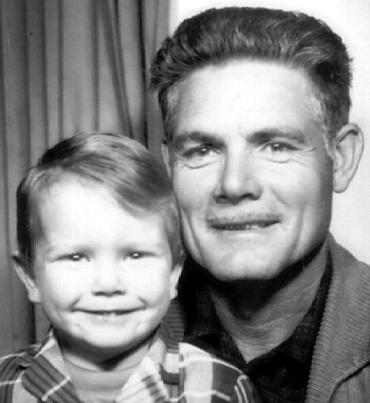
|
VonLogan & Von Brimhall 1970 |
When they got to the Ranch they forgot about the unpleasant task and went about their work. Finally VonLogan started crying and walking straddle legged. The men didn’t have any water with them, but they had a big can of Donald Duck Orange Juice so they went to work on the poor kid. This canned orange juice was so acidic that it burned VonLogan’s raw little bottom with every dab. Today whenever I see his beautiful orange hair I think that maybe the orange juice went straight to his head.
One day Von started walking funny and I said to him, “What is the matter with you?” He responded, “I’m not sure, but for a couple of days I’ve felt like I’ve had a blowout.” I didn’t understand what he was talking about at first. It was his first experience with hemorrhoids. I got him medicine and in a couple of days he was on the mend.
Another time we were buying items for our years supply and Von said that we had better get a case of “fanny fodder” and I didn’t know what he meant. As he loaded a box into the car he explained that this was slang in Taylor for toilet paper.
One day Von had an upset stomach and ask where the Alka-seltzer was so I told him. Pretty soon he came down stairs and said, “That sure was a good pill. It just fizzed right up and really did me good.” I then asked what bottle he had taken it from. He had taken one of my denture cleaner tablets instead. He didn’t care and he said that it had really helped him.
Brenda started taking dancing Sept 9, 1963. She was a beautiful child with large blue eyes and a round face with lovely blond, barley-colored, curly, long curls. After a few months of lessons she tapped danced in an Indian Day Program for the city to Turkey In the Straw with three other little girls; Lynn Piper, Norma Lynn Collingsworth and Jane Ann Combs. Soon after this was the Brimhall January reunion at Falcon Field at Aunt Tezza’s home in Mesa where she danced a ballet and an Indian Hoop Dance. She did very well. Marsha played the piano to accompany her dance. Jody was all dressed up in her Chinese costume and we had taught our little three year old darling a little dance also, but she got so frightened she just went out and stood there and bawled and wouldn’t dance a step.
Coming from a visit in Thatcher on our way back to Winslow that summer we were climbing out of Salt River Canyon when Brenda spotted an old mine shaft with tailings spilling out of it and she said, “What’s that stuff on the side of the mountain, Daddy?” Jody spoke right up and said, “It’s slobbers.
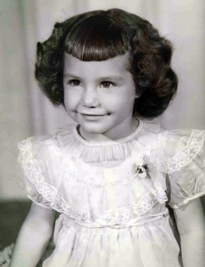
|
"Jody" Sylvia Ann Brimhall |
The mountain is slobbering.” It surely looked like it was.
Ricky and Phillip Bruchman found a cave full of bat manure out to Jack’s Canyon about 10 miles south of town and came home all excited. They were going to make a lot of money collecting the manure (guano) and selling it to everyone in WInslow. They talked me into taking them out there with a lot of boxes. They filled several boxes full and then tried to sell them. People wouldn’t buy it from them because they thought it was rat droppings. I finally paid them .50 cents a box and threw it away when they weren’t around.
Ricky has many Kenny Lyman stories that tell of a little neighbor boy and The Black Cat Club that are found on our family web site listed as “Pudgy Perkins and The Black Cat Club” at www.b13family.com . One day Jack Lyman, Kenny Lyman’s father, sent Ricky home to ask his dad if cockleburs weren’t porcupine eggs. Von had to set him straight. Later he came home from Boy Scout camp and said that some of the boys were trading “porcupine eggs” to other boys for knives, scarfs, food, etc. Later we heard of a man in Texas that sold them to tourists at .50 cents each under the same title.
One time I was in the bathroom and Von asked me to bring him one of his heart pills, so I got it out of the bottle and then got busy doing something else. I got a glass of water and then not thinking about what I was doing I took his heart pill. When I realized what I had done I went running into the bedroom screaming that I had taken his pill and that it was going to kill me. He assured me that it wouldn’t and I am still around all these years later.
We frequently visited my sister Annie and her family as we had free passes for our entire family on the railroad because that is where Von worked. At the end of one of these visits we stopped at a pet shop and Ricky bought a hamster. We knew we’d have a time carrying it all the way home on the train, but we got a shoe box and poked little holes in it so it could breath and boarded the train. By the time we got to Fullerton, where we had to change trains and had a layover of a couple of hours, the hamster had chewed holes all over in the box. We went to a five and dime store and bought a metal lunch bucket with holes in it. We went to the park and got grass for it to eat and nest in. That night as we were traveling over the rails I was half asleep. I could hear the kids whispering and then I felt someone under my legs. It was Marsha crawling on the floor of the passenger car. I asked her what she was doing and she said Ricky was making her help him hunt for the hamster. He had opened the lid so it could breath better and it had gotten out. I was so mad at him because it was around three in the morning and we shouldn’t have had an animal in the passenger car anyway. About that time there was an unearthly scream that came from the restroom as out flew this woman with her panties down. She was hopping around screaming that there was a big rat in the restroom. The conductor, brakeman and porter finally got her calmed down and then they started talking about it. They just died laughing as every knows rats and mice don’t get on trains. They went on talking and laughing about this for almost a half hour. Then all the kids started crawling up and down the aisles again and Ricky kept trying to get Marsha to go into the ladies restroom to find the hamster. She finally did, but came out empty handed and we thought that was the end of the hamster story. About 20 years later Von was visiting with a bunch of his fellow railroaders and a conductor started telling about an incident that happened much further down the line on his train with a hamster, of all things. Von told him the real story.
When Amber was to be married, Jody came home for the wedding with her first baby, Greg, who was nursing. Marsha’s daughter, Elise, was fascinated with the nursing bit and watched and watched. Greg would bite ever now and then and Jody would whack him so he’d let go. Later Elise was sitting by Doug on the couch and she lifted up her blouse and put her doll up to her chest and the yelled, “Ouch!” and whacked her doll. Doug was flabbergasted and checked up with Marsha on just where Elise had learned such a thing.
The day of Amber’s wedding we were at Dave’s parent’s home in San Jose, California hurrying around trying to get ready. Amber was in the bathtub and Jody was changing Greg and he wet all over himself so she hollered at Amber and ask her to rinse him off in the tub. She said that she would and was proceeding to do the job. She washed him off in front and then turned him facing her when all of a sudden she started yelling for Jody to come and get her darn kid because he had started nursing her. Poor Amber on her wedding day!
LESSONS LEARNED WITH CHILDREN
Some of the things I learned as a mother was that it pays to be honest with your children and never teach them to lie by your doing so. Show them respect and admiration and they'll do the same for you. You must have patience and teach them to be honest by your being honest too. You must be dependable. We wanted our children to know that we loved them and still do. We wanted our children to have good self-esteem and be faithful to each other and stay close and strengthen their brother and sister ties. We want them to strengthen their testimony in the Gospel and to be good and loving companions in marriage. We would desire for our children to be loyal to their mates, family, friends and also to their country. We would desire for them to have compassion for everyone and to develop faith in the Lord Jesus Christ and be good parents and spouses. The principles that I learned as a wife were to trust in my husband in major decisions, to strive always to communicate and to keep the lines open to where we could talk. I had to learn to practice patience and to learn to give in. I learned to trust in the Lord, to have faith and to have faith in my husband and in my children. I tried to be understanding and I want them to be understanding. I want them to learn to share together. I'd love for them to organize, schedule and make good use of their time. I'd love for them to show faith, love, trust in God, keep his commandments and respect authority in the home and the Church.
PLACES WE LIVED

|
Hester, Dede, Armelda, Ricky Marsha Mahoney House 1951 |
The places we have lived since our marriage are Clifton, Morenci, Thatcher and Winslow, Arizona in eight different homes.
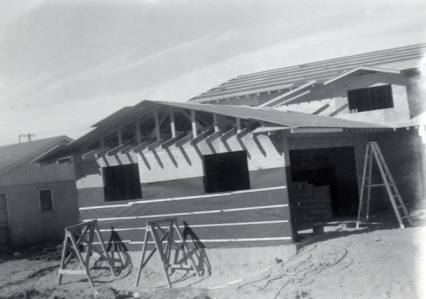
|
216 E. Gilmore |
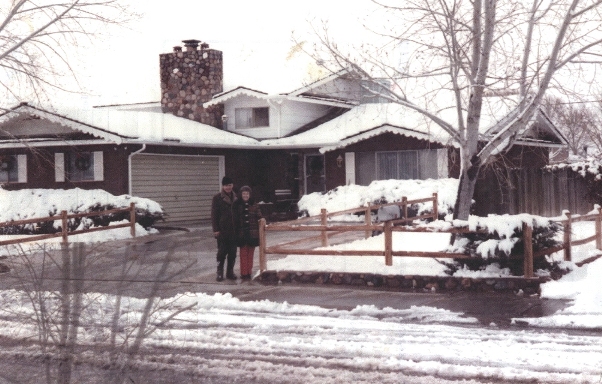
ADULT FRIENDS
Some of the friends who have influenced my life and dotted it for good are Ida Smithson in Flagstaff, Fontella Randall, Noma Donaldson, Ruth Palmer, Ida Hunt, Rosemary Kutch, Daisy Higby, Katie Lee, Helen Campbell, Mary Pearl Turley, Ada Rhoton, Mayola Carden, Hazel Bruchman, and Betty Whipple.
BETTY WHIPPLE
Betty Whipple and I shared our lives through a close friendship much like that found only between a mother and daughter. She needed an older person who she could talk to and she took the place of my daughters when they left home. We both raised gardens and we would exchange produce from our gardens. She taught me how to make really good canned beets. She would always give me cucumbers and I'd make pickles from her cucumbers. We exchanged tomatoes and chilis and helped each other in any way we could. Vaughn and I had gone to California on a vacation in July one year and when we came back, Betty and Roxanne (Betty’s little daughter) came over to visit us. While walking the one block back to their home Roxanne was hit by a car and killed. In just three days, she would have been eight years old. It was one of the most traumatic things that had ever happened to all of us. When Rory and Burke were born I went over and helped her, bathed the babies and took care of them. Then when we brought Marc Samuel Brimhall
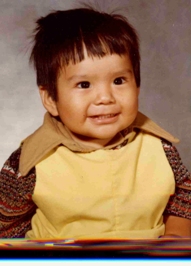 home from the Indian Hospital at three days old for Ricky and LaPriel (their adopted Hopi Indian son), Betty and I bathed him and got him ready for Vaughn to take down to Gilbert to Ricky and LaPriel.
home from the Indian Hospital at three days old for Ricky and LaPriel (their adopted Hopi Indian son), Betty and I bathed him and got him ready for Vaughn to take down to Gilbert to Ricky and LaPriel.
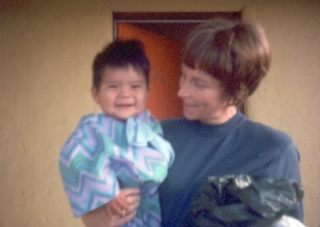
REXBURG WOMEN’S WEEK SUITCASES
One time I wanted to go to Rexburg for Brenda's Women's Week and so Betty, Fontella Randall and Rayola Sorensen went with me. Vaughn tied our suitcases on top of the car and when we got between Page and Fredonia, I happened to look back and there were suitcases flying all over out in the desert. Our underwear and everything else was flapping around on the tumbleweeds. We got out and chased things all over the country and finally got everything back in. The next thing that happened was that Fontella and Rayola both got stuck in the back seat of our station wagon. We got to laughing so hard we liked to never got them out.
LEARNING FROM OTHER WOMEN
Betty taught me to organize and prepare ahead of time. This was one of the most valuable things that anyone has ever taught me. Helen Campbell helped me learn to make my bed as soon as I got out of it in the morning and to do the dishes and clean the kitchen just as soon as the food had been eaten. Once the beds are made and the kitchen is cleaned up, a house looks almost ready to go everyday.
BETTY & TEMPLE SLIP
Betty and I attended many temple sessions together, and it seemed like something really funny happened every time we went to the temple. One time in the Idaho Falls Temple, they gave me a slip that was too tight for me and I made the mistake of squeezing into it. I whispered to Betty that she had better come and help me. She jerked me all over that dressing room trying to get that slip off from me. Then we got the giggles and the Matron had to come and tell us to be quiet.
BETTY SHARING JOYS & SORROWS
We were a daily sounding board to each other. She always told me her problems and I told her mine, and that way we could get our frustrations and problems out in the open and look at them better. We shared the births of my grandchildren, our children's joys, sorrows and the tragedies that came to both of us.
BETTY CARING FOR THE HOUSE
Whenever Vaughn and I would leave town Betty took the role of a daughter. She'd come and water my plants, bring in the mail and check the house to see that nothing was broken. I didn't even need to tell her. She had a key to my house and she'd take care of everything. We used to go over to the south side of town and gather wood together. We went piñon picking and picnicking on many occasions. Tom and Betty were our home teachers one year and we just enjoyed having them so much. Tom was our Stake President also. One time Tom bought us a plant for Christmas. I still have that plant and it's been about six years at this writing. We learned to love one another in a special way. Everyday about three o'clock Betty would call me and we'd go get a drink someplace and just visit. Everyday at three o'clock I am still waiting for her call even though she has moved away. We used to go on volleyball trips together and played together for many years. We really had a good time doing that. I learned to love Betty's mother too, Roxie White from Phoenix. She just became like one of our family.
WHAT HAPPENED TO BETTY AND TOM WHIPPLE
Betty and Tom were victims of the economy in 1983 and they lost all their holdings which were their three women’s clothing stores; one in Holbrook, one in Winslow and the one in Show Low. They also lost their home, so they moved to Phoenix last year and Tom went back to school. He is just graduating now from International Marketing from Thunderbird Business School and is still hunting for work. Their boy Rory is on a mission in Tennessee. Tom and Betty later moved to Denver. Betty became ill and eventually died of cancer. Her two sons grew up to be fine young men, fulfilling missions and are now successful providers, husbands and fathers.
CHAPTER 9: THE YEARS OF WORLD WAR II
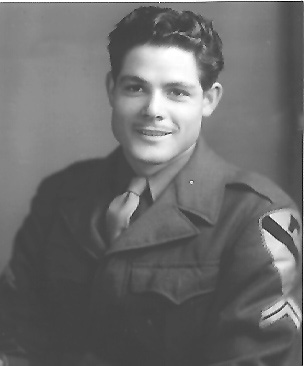
CALLED TO WAR
Von was called to report for service in World War II by a letter beginning with, “Greetings from the President of the United States” and reported for his physical exam in Phoenix, Arizona on May 12, 1944 for formal induction into the Fifth Calvary of the United States Army. In our family during World War II Uncle Vern Brimhall was in the navy, Uncle Chet Damron was in the 158th Infantry, Uncle Jack Damron was a tail gunner on a B-24 Bomber, Uncle Doc Savage was a chief cook in the navy, Uncle Kirk Brimhall was in the navy and Uncle Merrill Brimhall was also. They all came home when
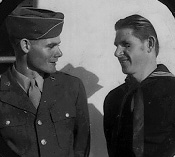 many men didn’t.
many men didn’t.
Von (He used both spellings of his name, Vaughn and Von) sent letters
and little wooden sandals to both the kids from the Philippine Islands. They were purchased in Manila. Marsha and Ricky were both just crazy about them, but they were mostly used to hit each other over the head. Marsha loved the picture of her Daddy that he sent her and carried it around a lot.
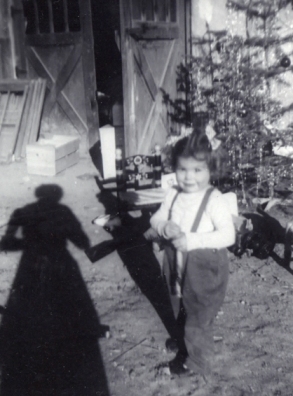
|
Marsha Brimhall 1944 |
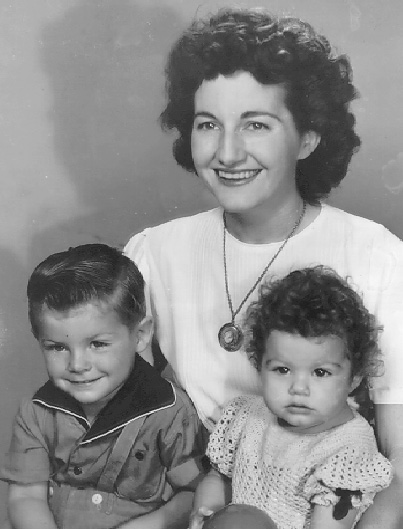
|
Ricky, Hester & Marsha Brimhall 1945 |
She showed it to everyone who came to the house and wanted them to kiss the picture. A few weeks after Japan surrendered in 1945, Von was sent to Japan with the occupational forces on the ship U.S.S. Warren. He drove an ambulance in the medical corps just a few miles out of Tokyo, Japan.
Sixteen million one hundred thousand Americans served in World War II. Four hundred and fifty thousand of these were women. Millions of women, both single and married, went to
work in the factories to build the mighty war machine of the United States. Two hundred and ninety two thousand Americans were killed and six hundred and seventy one thousand U. S. Troops were wounded in battle.
BASIC TRAINING
After Vaughn entered basic training in Northern California, he wanted to see the children, so he called me and ask me to bring them out. I advertised for somebody to help me drive. We were living in Thatcher and a young Mexican fellow I knew, who’s family owned a store in town, was also in the service at that time. He needed to go to L.A and so he became the person to help drive us. We got in our old white station wagon and drove to L. A. and stayed the night there with Uncle George Brimhall. The next morning this young man checked in at his military base in Los Angeles and Uncle George got us going. He showed me how to get on the highway going north. From then on we were on our own. As we headed north, I would stop and pick up military men who were hitchhiking. They would drive for as far as they were going and then we would find someone else to do the same until we reached Fort Ord, California. This was common practice during the war and I felt safe doing it. Marsha and Ricky were both very good on the 2,000 mile trip.
It rained all the time that we were in Northern California. We first stayed in a motel where we paid $80 per month for a two bedroom unit with shower and kitchen.
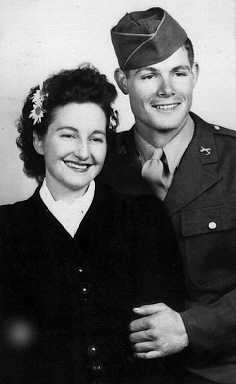 While we were in the motel, which was in Santa Margarita, California, Ricky had a brand new pair of cowboy boots.
While we were in the motel, which was in Santa Margarita, California, Ricky had a brand new pair of cowboy boots.
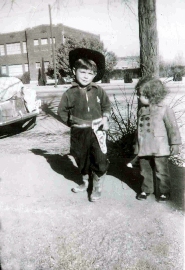 Workmen were resurfacing a roof at the motel and Ricky waded in a bucket of tar. I had to throw his new cowboy boots into the garbage.
Workmen were resurfacing a roof at the motel and Ricky waded in a bucket of tar. I had to throw his new cowboy boots into the garbage.
During all the month of March in 1944 Vaughn was a trainee at Camp Roberts, California. During this time we stayed in motels at Paso Robles, California. Towards the end we stayed with one of Vaughn’s relatives and I tended their children while she went to L.A. to do some genealogy work. I next rented another motel back in Santa Margarita. I moved five times during this month trying to find a place where we could cook and sleep. Everything was tied up tight because of so many other families trying to stay close to the training bases. I often spent days trying to find someplace to live.
During this time my brother Chester was in the army hospital in San Francisco. He had been sent back from the South Pacific. He had malaria and jungle rot. He was in bad shape and so they sent him home for treatment. I had called him so that he knew we were in Northern California. He was able to get leave from the hospital and rode a bus over to visit us. He was very ill and looked really bad, but it was so wonderful to see each other! He so loved the kids and had such a wonderful time with them. He cried the next morning when he had to leave us to return to the hospital. Within a short time he was fighting the Japs again deep in the malaria, infested jungles of the Pacific Theater.
We returned home to Thatcher and then some time later I returned to Fort Ord to bid my husband/soldier goodbye before shipping overseas. I left Ricky and Marsha in Taylor with Vaughn’s parents. While the kids were there, Marsha learned to fold her arms for family prayer and to do the hula as well. When we would try to get her to fold her arms to pray now, she started doing the hula instead. Ricky gets to giggling and we have nothing less than merry confusion all around.
LETTERS AND MORE SCORPIONS
I wrote Vaughn a letter everyday he was gone as he did to me also. One day he got eighteen letters and once I got eleven of his. This one night when the kids were asleep I sat at the little drop leaf table by the front window to write. When I had finished writing to Vaughn, I put my hand under the table and released the catch letting it fall down. The jar knocked a large scorpion out from underneath the bottom of the table. It fell off on the floor and before I could get something to kill it, it crawled under the mop-board. Another time I was lying on the couch reading which was my escape from reality. I got up to go to bed. It was hot summer weather. When my bare feet hit the floor, I stepped on a large scorpion and crushed it. It felt just like stepping on a huge grape. It scared me so badly that all I could think of was to get all of that mess off from my foot. I hopped all around and finally made it to the kitchen sink, put my foot up in it and ran water over it. It was a good thing that I was limber. The sink was very high and I am very short. Another time, I decided to clean all of the yards and decided that I would cut down a lot of scraggly ivy from the east wall of the house. When I pulled it off from the wall there were hundreds of scorpions under the vines. Another day I went out to the back lumber shed to rummage in a box of old clothes. When I threw out a dress to look at it, it was full of scorpions in all stages of development. One mother had seven attached to her back. I've heard that the babies eat the mother and are much more deadly than the larger ones. I guess it was a miracle that none of us were ever stung by one while we lived there. We were really blessed.
HOT WATER HEATER STEAM STORY
While we lived in this house, every time that I wanted hot water I had to light a gas heater in the lumber shed out in back and then turn it off when it got hot. One day after lighting the hot water heater, I went visiting most of the day. When I returned home and flushed the toilet, steaming hot water poured out into the tank and stool and broke them all to pieces. I had forgotten to turn off the heater. I had to turn on all of the taps and it seemed that the steam poured out for hours.
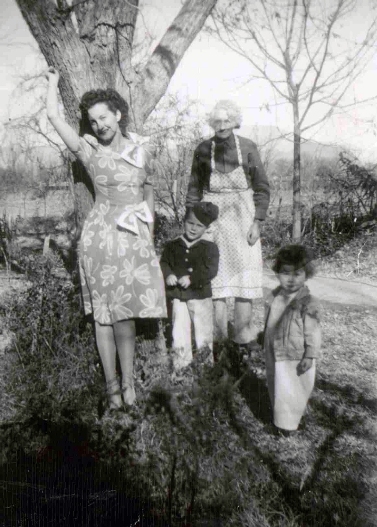
RICKY AND MARSHA W.W. II
During World War II when Von was on Luzon and then in Japan with the occupation forces we were living in Thatcher and Ricky was three years old. The boys next door had a basketball and they would go off to school and leave it lying in their yard which connected to ours. One day Ricky started playing with it and when the boys came home from school it was missing. We all got on Ricky to remember where their ball was. He thought for a long time, blinked a couple of times and finally said, “I was playing with it and I threw it way up in the sky and pretty quick Heavenly Father reached down and grabbed it!”
Another time he became very interested in the story of “The Three Little Pigs and The Big Bad Wolf.” Christmas time came and the story of the arrival of Santa Claus and his reindeers was frequently told. One day I was telling him this story and when I came to the part where Santa comes down the chimney I said, “And guess who jumped out?” Ricky said very earnestly, “The big bad wolf!” Boy, was I shocked.
During this same time period Ricky and Marsha were sitting on the sidewalk playing in the dirt. They were filling pop bottles with the dirt. Marsha got up and walked behind Ricky and staggering a little (she was only about 11 months old) very innocently whammed Ricky over the head with a loaded pop bottle. He went goggled eyed, stiffened up and then keeled over. I ran outside and thought sure he was dead, but he soon recovered.
One day Ricky walked a block and a half to Mamas to get a quart of milk. When he came home with it he said, “Mama, when I got up to Grandma’s the ditch was running clear full of water, and I remembered how Jesus walked on the water; I almost did too, but then I went over the bridge instead.” The Lord really must have been watching over us, as the ditch is deep and with many cement underground culverts over it where children easily drown. He would surely have died. He was so good to look out for Marsha and really loved her a lot.
VB + HB WORLD WAR II STORY
One day around sunset I came home from Safford with the kids. Marsha jumped out of the car and ran to play. I was really feeling blue. I hadn't heard from Vaughn in over three weeks and the war news wasn't good. I didn't know whether he was alive or dead. I knew that he was on Luzon in the Philippine Islands with the medical corps and was in the midst of heavy fighting. I started to lay my head down on the steering wheel of our old, blue Studabaker car.
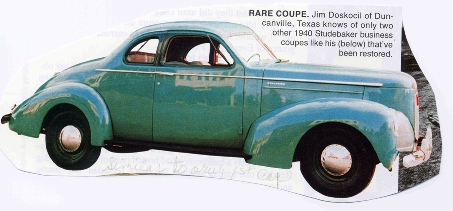 My eyes fell on the flat, black, horn and there scratched in with a nail were the initials V. B. + H. B. Now isn't that something! I knew that I hadn't done it. I figured that Vaughn must have, but it was like a message of love right to my heart
My eyes fell on the flat, black, horn and there scratched in with a nail were the initials V. B. + H. B. Now isn't that something! I knew that I hadn't done it. I figured that Vaughn must have, but it was like a message of love right to my heart
from him deep in jungles of Luzon. Vaughn was gone for eighteen months overseas. I was one of the lucky girls, as some of the husbands were gone for two or three years and many never returned. I paid a full tithing, was active in the Church, remained true to my husband and he remained true to me. Many wives and husbands didn't during these war years. It was a hard and trying time to live through.
MY COUSIN IRENE
My cousin Irene Damron Owen’s
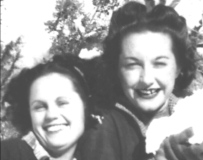 husband, Marvin, was stationed in San Diego in the Navy and worked in the postal department during the war. She and I ran around together a lot while our husbands were in the service.
husband, Marvin, was stationed in San Diego in the Navy and worked in the postal department during the war. She and I ran around together a lot while our husbands were in the service.
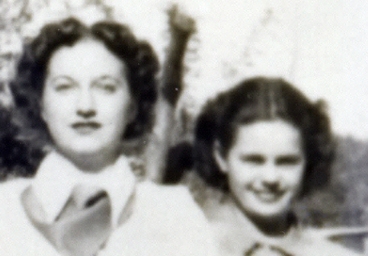 She had her second child, Jimmy, during this time and I took the place of her husband as a companion. I’ll never forget how miraculous it seemed to me when Jimmy was finally born. He came out a brand new baby straight from heaven.
She had her second child, Jimmy, during this time and I took the place of her husband as a companion. I’ll never forget how miraculous it seemed to me when Jimmy was finally born. He came out a brand new baby straight from heaven.
V-DAY (VICTORY)
I remember V-Day! Everyone got in their cars and rode up and down the streets yelling and screaming, honking their horns and holding the V-Day sign up. The kids and I sat on our car out in front of our house and watched everyone with thankfulness in our hearts. Right after that in five to ten day days, Vaughn went in with the occupation forces into Tokyo, Japan. They were among the first troops to land. Very few people were on the streets. Most everyone was hiding in their homes, their shops, around the corners and behind trees and bushes. They were frightened to death. They looked upon the Americans with intense hatred and fear was in their eyes as they knew not what to expect. They had been taught that the Americans were a terrible enemy.
VAUGHN COMES HOME
Vaughn stayed in Japan about six months, as he was only eligible to return home on a point basis determined by how many children he had, how long in the service, how many battles he had fought in, active service time, etc.
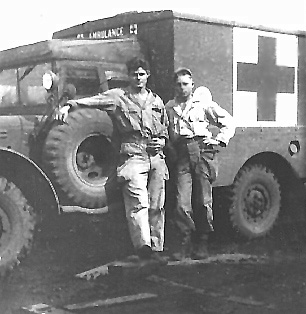 As he recalled, he had around 42 points before his name came up. The first ones to return had as high as 90 points. What a glorious and long-awaited day that was when I received a telegram from the service telling me when Vaughn would land in America. It took him ten days to come by ship and he was in a severe storm and tidal wave in route. This made him very ill, as it did most of the 5,000 men on board. They just laid in their bunks. He can remember it got so rough, he would be thrown clear to the top of his bunk and then slammed down again time after time. Everyone was seasick.
As he recalled, he had around 42 points before his name came up. The first ones to return had as high as 90 points. What a glorious and long-awaited day that was when I received a telegram from the service telling me when Vaughn would land in America. It took him ten days to come by ship and he was in a severe storm and tidal wave in route. This made him very ill, as it did most of the 5,000 men on board. They just laid in their bunks. He can remember it got so rough, he would be thrown clear to the top of his bunk and then slammed down again time after time. Everyone was seasick.
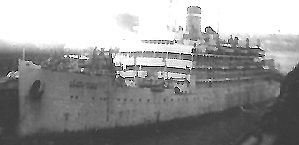
He landed in Seattle, Washington and then took a bus to Mesa where I met him. The dentists in the service wanted him to stay in Seattle for ten days so they could put a bridge in his mouth, but he was so anxious to get home, he didn’t stay. Mama and Ray tended the kids and I took a bus to Mesa where I had rented a hotel room. I took a leisurely bath and made up, and I remember that I wore my hair in the popular style. I pulled it up on top of my head to one side, then put a rubber band around it like a pony tail and then put a circular rat over that. Then I spread the hair out all over that and tucked it under. Then I put an artificial white and green gardenia in the middle. It looked very much like a hat perched on one side of the head. Everyone wore flowers in their hair and sometimes one on each side. I then walked to the bus station early, because I couldn’t wait any longer. I looked through a side window and saw this soldier in uniform leaning against the counter and he was so handsome.
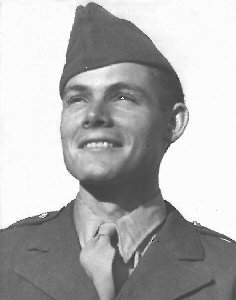 I just looked and it finally dawned on me that it was Vaughn. He looked so utterly handsome that it actually took my breath away! The window was open, so I called gently to him. He cocked his head to one side and looked around. Then I called again and he saw me and came running out.
I just looked and it finally dawned on me that it was Vaughn. He looked so utterly handsome that it actually took my breath away! The window was open, so I called gently to him. He cocked his head to one side and looked around. Then I called again and he saw me and came running out.
 We hugged and kissed, laughed and cried a lot with thanksgiving and happiness. That night we ate dinner by candlelight in the fancy hotel dining room. Jack and Norma Tidwell came in and visited with us for awhile and then we all went to a carnival. We were standing there watching the ferris wheel go around and I reached behind me and took hold of Von’s hands and wrapped them around me and leaned back very lovingly and looked up. It was Jack! Somehow he and Von had accidently changed places. We got a big laugh out of it.
We hugged and kissed, laughed and cried a lot with thanksgiving and happiness. That night we ate dinner by candlelight in the fancy hotel dining room. Jack and Norma Tidwell came in and visited with us for awhile and then we all went to a carnival. We were standing there watching the ferris wheel go around and I reached behind me and took hold of Von’s hands and wrapped them around me and leaned back very lovingly and looked up. It was Jack! Somehow he and Von had accidently changed places. We got a big laugh out of it.
The next day we went home to Thatcher. As the bus neared our house and braked to a stop on our front lawn, we could see Ray half lounging under a tree with the kids playing around waiting for their hero Daddy to return home from the war. It was a marvelous experience to be once
again united as a family! We soon got our old car overhauled and took off
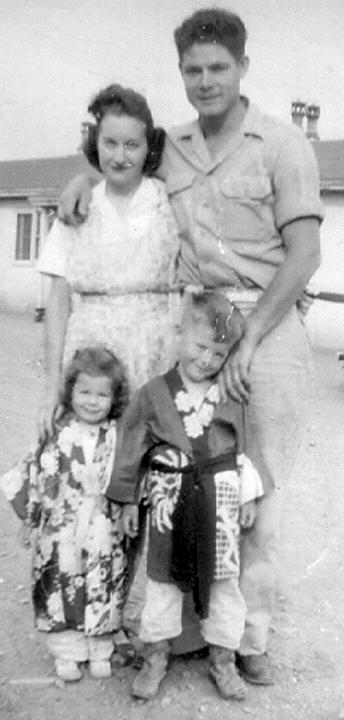
|
Together Again at Last! 1945 |
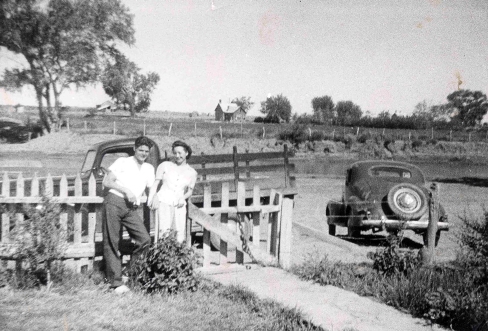
for Taylor to visit Von’s folks. Then we moved back to Winslow into some government units on the west side of town that are now the Indian dorms. Brenda was born there and then Von built a three bedroom home for us on Mahoney Street with a four thousand dollar G. I. Loan. He built us two more homes over the years, but this first house is still there and looks wonderful. He also built four three-bedroom homes that we rented out for many years.
CHAPTER 10: TALENTS AND COMMUNITY SERVICE
TALENTS
Among my interests and abilities was that of having quite a bit of empathy for people. I could feel the sorrow and the troubles that they had. Most of the time I was pretty cheerful and my school teachers called me the dancing girl because they said that I never did walk. I danced everywhere or skipped wherever I went. I consider myself friendly, and I guess one of my talents is that of a teacher of dance. I have taught thousands of people to ballroom dance. Vaughn and I worked for twenty-two years for the Church as District and Tri-Stake Dance Supervisors in the MIA (Mutual Improvement Association) Program. I taught thirteen years in my own private dance school. I taught tap, ballet, folk, novelty, acrobatics, tumbling and gymnastics.
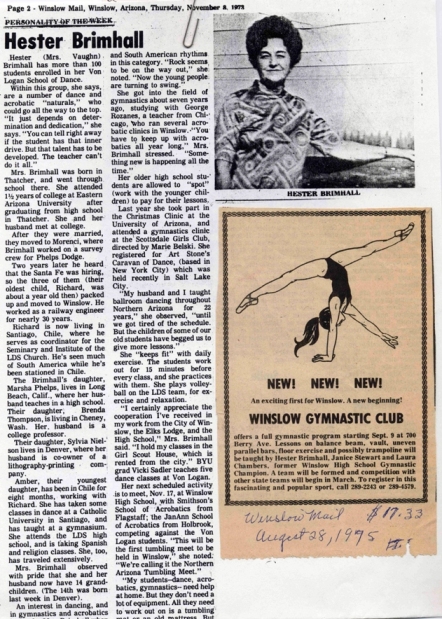
COMMUNITY SERVICE AND WORK
I have held and worked in several community positions. I worked for a year while Ricky was on his mission as a Society Editor
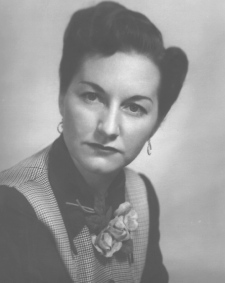
|
Hester Brimhall |
for the Winslow Mail. During the many years I taught dancing and had my own dance school we entered the Winslow Christmas Parade every year and gave time and effort to make that Parade better. We usually won first prize, especially for our Christmas floats. We started entering our dance school and usually won first prize there as well. I ran a public dance and tumbling school. It was the only dance school in the town for about ten years. I named it after my oldest grandson, VonLogan Brimhall.
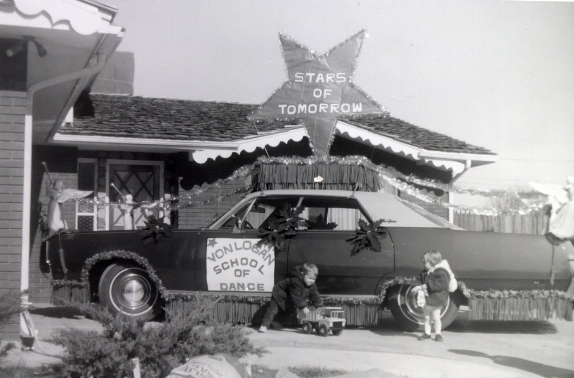
It was called The VonLogan School of Dance. I played on the city league for the L.D.S. Church volleyball team and I was the oldest woman playing and the only grandmother for a long, long time. I played until I was sixty-two years old. I also helped put on a play for the City of Winslow in the City Recreation Department along with Monreve Hardy.
CHAPTER 11: TRAVEL
PLACES TRAVELED TO
When the children were small we went to Palomar Observatory near San Diego, California, Bryce Canyon National Park, Zion National Park, Yellowstone National Park and Yosemite National Park. We went to Oregon, Washington, and other states. We also traveled to South America visiting Chile, Easter Island and Peru. We also visited Hawaii, the Church Historical spots here in U. S., the Statue of Liberty and Washington D. C. Over the last 18 years I have also traveled to Israel, Europe, Alaska, Mexico, the Caribbean and back to Hawaii.
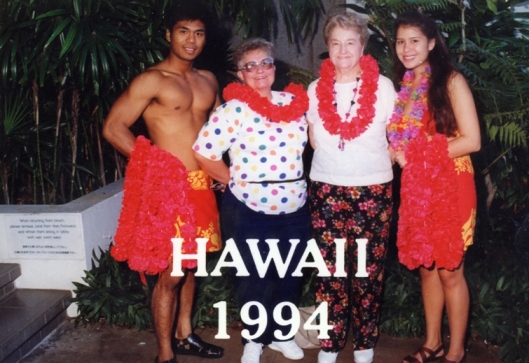
CHILE IN CONFLICT
The thing I enjoyed most about traveling to other countries was meeting new people. It was like opening a window in mind and memory, ever to be a part of the way I think and feel for the rest of my life. Arriving in Chile in 1973 to visit our son and his family, we flew into a country filled with internal strife. Ricky, LaPriel and their first five children were living in Santiago where Ricky served as the Area Administrator of the Church Education System.
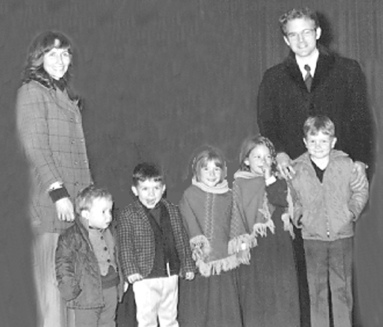
The country was ruled by a Marxist president, Salvador Allende, and the country was in great strife, almost at the point of civil war. It was so interesting to see how the people reacted to their situation. Most people we met were courageous members of the Church going about trying to live normally and do their best to keep the restored Church going even during a time of such great conflict. The Chileans were a very warm people and greeted us gringos with the traditional abrazo (hug) and a kiss on each side of our cheeks. At first we were shy about responding to this custom, but when we came back home we missed it a lot, and felt that we Americans had become cold and unemotional.
ARICA
Within a few days after returning from Easter Island, we went north, but it was like going to Florida (into a hotter climate). We stayed in Arica, Chile which is on the border with Peru for three or four days as Ricky had to meet with the leaders of the Arica Ward and LaPriel with the MIA Leaders. LaPriel was the President of the Young Women’s Organization of the Chilean Mission. We rented a lovely motel called the Azapa located at the mouth of the Lluta Valley. We rode from the airport in taxies and everywhere else all of the time that we were there. There were ten of us. There were Ricky & LaPriel, four of their five children, Cynthia who was a foster daughter, Amber, Vaughn and I. We flew from Santiago to Arica on Lan Chile Airlines. We rented three rooms which were wonderful facilities with nice baths and good beds; all single. We never saw a double bed in Chile except at Ricky and LaPriel’s home. All of the rooms had patios with french doors opening from the back part of the room onto beautiful lawns with flowers, trees and a stream running through the area. There was also a swimming pool and a big restaurant. We all cleaned up and ate dinner that first night at the restaurant. All ten of us had everything we wanted. We ordered filet minion, lobsters, etc. Ricky's family and Cynthia their Chilean girl, Amber and Vaughn and I, as I recall, it only cost 34 dollars. After that we ate all of our meals on the patios of our rooms on the table and chairs. Ricky did most of the cooking. There were no flies or bugs. We shopped in open street markets and bought all kinds of fruits, vegetables and meat--mostly chicken. Nothing was refrigerated. Meat was just in glass cases like 30 years ago in the United States. We visited clothing, leather, and tourist shops. I bought Annie and I both a Navy blue coat for 17 dollars each and Amber bought shoes. She bought a whole suitcase full of shoes to take home. She gave most of her U. S. clothes away to friends before leaving Chile. It is a rare thing for a Chilean to have something from America--especially Levis. I took Cynthia and Melba (Ricky and LaPriel’s foster daughters) a new pair of Levis as a gift from the United States when we went to Chile. In Arica we went to a ward beach party at the ocean and visited with members. Most spoke some English.
Ricky and LaPriel went skin-diving one day at the Yachtsman Club. Vaughn and I laid on the Beach and visited and rested. The sand was gray and very coarse. We watched people fish. I wore my winter coat everywhere as when I am near the ocean I am cold. Everyone thought I was kookie. All during the day and night cannons were shot off in celebration of the “War of the Pacific” from an old fort near the ocean where Chile defended herself against Peru and Bolivia. Many of the cars there were small cars called Citrons. The parts were shipped from Europe and the cars were assembled in Arica. The cars were then sent throughout the rest of the country.
We visited a church made of metal that was sent from Europe and bolted together in Arica. We went to a Museum in the country and bought jars, jugs, and replicas of native Inca Indian art. We saw llamas, alpacas, vicuñas, and guanacos in a field along with some cows. I wanted to get close to them and really look at them, so I walked through the field and jumped a ditch. They were on the other side of the ditch.
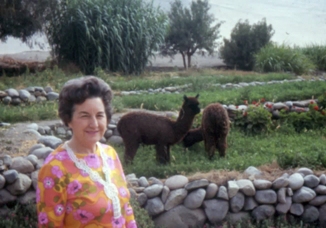 When I got close enough to a llama, he spit on me and it just scared me to death. We took lots of pictures. All of the roads around Arica were dirt except in the city and they were made of cobblestone. We bought our large, hand carved shark and chicken in downtown Arica for around six or seven dollars. We hauled them in our hands clear back to Santiago on the plane as well as to Peru, Mexico and then home.
When I got close enough to a llama, he spit on me and it just scared me to death. We took lots of pictures. All of the roads around Arica were dirt except in the city and they were made of cobblestone. We bought our large, hand carved shark and chicken in downtown Arica for around six or seven dollars. We hauled them in our hands clear back to Santiago on the plane as well as to Peru, Mexico and then home.
People in Arica were very friendly and especially the ward members. They had a scripture chase at MIA and the kids were super fast. They held seminary scripture chase tournaments all over the country of Chile competing against each other from many South American cities. Arica's boys and girls were the Champions. They served pastries and pop on a long table. Everyone stands around the table, which is the custom, and eats. Then they stuffed their purses full if there was anything left over. Everyone dresses nice and clean. Ricky called on Vaughn, Amber and me to bear our testimonies and Ricky translated. He is a very good translator and did so for one of the General Authorities at Buenos Aires, Argentina Area Conference when President Kimball came there to announce that a temple was to be built in Argentina.
Everywhere we went in South America we could see the extremes of the very rich and the very poor. The poor live in shacks of all descriptions and right next to them are skyscrapers made of steel and glass. Arica had a lovely fountain in the middle of their city with flowers and trees around it. Everyone was so friendly.
The kids went swimming in the motel pool everyday and got sunburned terribly, especially VonLogan and Christina (the redheads). We played volleyball on the lawn. There were beautiful flowers everywhere. Arica is a land where it never rains. Everything is watered by hose. We talked to our cab driver and he said that in the 17 years that he had lived there, he had seen it rain just once.
When we flew up to Arica, we followed the coast line nearly all of the way. The country looked barren. The airport was out of town and a Seminary man had a cab there to pick us up. He was a customs agent at the Airport. Ricky bought the kids two small parrots in a wire cage at one of the markets and they got them through customs because of this man’s influence. His name was Pedro Piaggio. The parrots kept getting out and flying away after we got home and so they gave them to Melba when she returned home to San Antonio for summer vacation.
One day we were riding in a taxi going to downtown Arica from our motel. LaPriel was always doing missionary work telling people about the gospel so she said to this man that was driving the taxi, "Have you every heard of a man named Joseph Smith? " He said, "Yes." LaPriel looked real surprised and said, "You have!" and he said, "Yes" and she said, "Where? " And he said, "Right here" and she said. "How come, who told you about him." "Well, nobody" he replied, "My name is Joseph Smith." We were just all flabbergasted. She asked if he had ever heard about a prophet named Joseph Smith who brought the gospel of Jesus Christ back to North America and South America. He said that he never had and she asked if he would like to hear all about him and what happened. He indicated that he really would. She said that she would send the missionaries to him. She gave the missionaries the referral but we never did follow-up on it to find out what happened, but we got a big laugh out of the coincidence.
EASTER ISLAND VISIT
Easter Island belongs to the country of Chile. While in Chile, we flew the 2,500 miles out into the Pacific to visit this Island. Easter Island is famous for their mammoth statues called Moais. As we arrived at the small airport, we were met by Rosa Cardineli and her husband Nico.
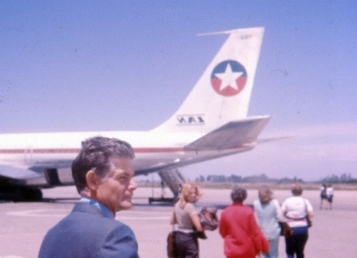 She was a native Rapanuian and he was of Italian/Rapanuian descent. They had turned their home into a guest house for tourists which is where we slept and ate there during our nine day visit. Her nephew, Alfonso, was our daytime guide, and we became very well-acquainted with them and their entire extended family. We talked of religion, country, friends and family. As we bid goodbye we left clothing, Vicks and other items that were scarce on the Island. They decorated our necks with shells and leis. What wonderful memories I have of this time and location.
She was a native Rapanuian and he was of Italian/Rapanuian descent. They had turned their home into a guest house for tourists which is where we slept and ate there during our nine day visit. Her nephew, Alfonso, was our daytime guide, and we became very well-acquainted with them and their entire extended family. We talked of religion, country, friends and family. As we bid goodbye we left clothing, Vicks and other items that were scarce on the Island. They decorated our necks with shells and leis. What wonderful memories I have of this time and location.
We had planned to fly to Easter Island, which is also called the center of the world by its inhabitants, when we came to Chile. On Dec. 13th, 1973 we got on a Lan Chile Airlines and flew to Easter Island. Nicolas and Rosa Cardineli rented rooms to us in their home. We ate and slept there. Each day Rosa’s nephew, who was a guide, came and picked us up in a Chevy pickup with seats built on the sides in the back. The islanders have their language which is Rapanui and almost everyone also speaks Spanish. Alfonso Rapu is the name of the guide today, the 14th of Dec. 1973, and he is Rosa’s nephew. We are riding in the first car ever owned by an Islander. He bought it in l967. Now there are a few more cars.
Rosa says that the people are brown, ugly and poor. She is a nice looking woman. The men are better looking than the women because the women lead such a hard life. They have few conveniences of the world. They have had electricity for only five years. It was misty and rainy when we landed, but all of the Islanders turned out to meet the plane as their income comes primarily from tourists. We were asked by two different men to stay in their home, but LaPriel had talked to a boy before boarding the plane whom she had met before in the Santiago airport. His name was Roberto Edmunds and he had directed us to the Cardinelli family. All of the clothing there was sour. The towels smelled and were never dry. Nothing ever got completely dry. The washer was like something that I have never seen before. It was a very small tub, no dasher, just an inside lever that would turn a little and then the clothes had to be rung out by hand. I noticed quite a few dogs and not very many beef cattle; just mostly horses. We ran into Ricardo on the cliffs one day. He was a hired sheep herder for the government. He said that it was a dull, cold, lonely life. He was only home one day a week and the other time he was with the sheep. Most of the men were small in stature and looked younger than the women. The women looked beautiful when young, but aged fast. Rosa was nice looking with naturally curly shoulder length hair, brown skin, good figure, and had a cheerful personality. Her husband, Nico, was of mixed Italian/Islander descent. He was quite skinny, had very dark hair and eyes and was a very nice appearing man. They were both in their early forties. He worked for the government and when the ship docked all of the men on the Island went on strike and wouldn't unload the ship because the wages were too low for the amount of labor involved. On the occasion when we were there, the men didn’t realize that they were under Marshal Law and couldn’t strike. So, Nico being a policeman had to throw his uncle, nephew, and his in-laws in the jail. They were still there when we left and everyone was upset.
LaPriel’s first meeting with Roberto had occurred several months previous while LaPriel was sitting in the Santiago airport waiting with Ricky to catch a plane. She met this Roberto as he was trying to converse in English with an American woman. LaPriel started translating for them. She took his name and when he said he was from Easter Island, she told him we were planning on going there soon. His father is head of the tourist trade on the island. As she started getting off the plane on Easter Island, he was seated in front of her and she recognized him and rekindled their friendship. He has been with us ever since. He found Rosa Cardineli for us, so we got in her truck just as the rain started to pour down. It was a very soft rain, but it fell for about 30 minutes. Finally Ricky and Vaughn got our luggage and we all piled into the pickup along with two german ladies and an older lady who is Rosas’ next door neighbor. When we landed on Easter Island, it was after a 5 hour flight in a 707 Boeing Lan Chile Jet. We flew 2500 miles from Santiago. This Island is small (9 miles long and 7 miles wide) with green hills everywhere. There are few trees and only 1,600 people at one time have lived here. The population here has been as low as 109 people. The people live off from the sea, the tourists, and little gardens of vegetables and fruits. This year they have had blight on all their plants and fowls. I saw chickens and ducks. Transportation is mostly by horse. The first horse was brought to the Island in l903 from Vina del Mar in Chile by an English concern. Every family has at least one horse and usually more. There are more horses than people on the island. A horse sells for 4000 Escudos which is around $4.00 U. S. This is sort of a joke, because even though you could buy the horse for $4.00, it would cost you a lot more to fly it out or send it out by boat. They are not very large horses and are skinny.
A thick, tough grass covers the hills and is rather hard to walk through as it comes to my knees and grows in large clumps. It is rather green at the bottom and yellow farther up. The animals feed on it and they are rather small and thin. Today we visited caves; the sleeping quarters of the ancients. We saw three very small islands (pinnacles of rock jutting out of the sea) about a distance of one mile from the caves.
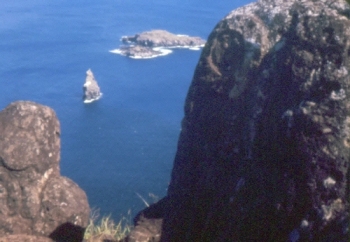 These caves which are lava tubes face the sea. The cave entrances were a little over knee high from the ground. The ancients came to this part of the Island only certain times of the year to wait for hundreds of different species of birds to come to the Island from the South American mainland to lay their eggs. At a certain spot facing the sea, the Chiefs of the 7 tribes had their lookout dwellings and could view the sea and the small islands to sea. They would choose a representative from each tribe to participate in a contest of swimming to the first Island. I think that the Island was about one mile out. The first man to return with an egg won for his tribe the right to rule over the other tribes for one year. Several men would be lost to sharks each year during the competition. If a family/tribe were mortal enemies to the winning tribe, they would flee to one of the numerous honeycombs of lava tubes running beneath the island. These hideouts were called “escondites.” They would lay low here during all of the coming year as they were not allowed to defend themselves.
These caves which are lava tubes face the sea. The cave entrances were a little over knee high from the ground. The ancients came to this part of the Island only certain times of the year to wait for hundreds of different species of birds to come to the Island from the South American mainland to lay their eggs. At a certain spot facing the sea, the Chiefs of the 7 tribes had their lookout dwellings and could view the sea and the small islands to sea. They would choose a representative from each tribe to participate in a contest of swimming to the first Island. I think that the Island was about one mile out. The first man to return with an egg won for his tribe the right to rule over the other tribes for one year. Several men would be lost to sharks each year during the competition. If a family/tribe were mortal enemies to the winning tribe, they would flee to one of the numerous honeycombs of lava tubes running beneath the island. These hideouts were called “escondites.” They would lay low here during all of the coming year as they were not allowed to defend themselves.
Some of the contestants drowned and others were attacked by sharks so it was a dangerous endeavor. We took pictures of where the leaders stood and commanded the best view of the event. It was a place of status where they were isolated from the common people. In this area are the many pictographs of the Birdmen
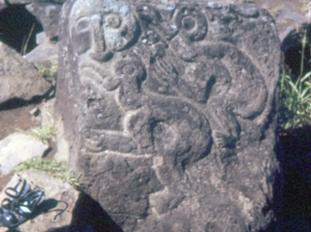 found carved in the stone walls. Our guide, Alfonso, Rosa’s Nephew, taught school six years here, but now grows corn, pineapples, bananas, etc. and is building his home to accommodate the tourist trade.
found carved in the stone walls. Our guide, Alfonso, Rosa’s Nephew, taught school six years here, but now grows corn, pineapples, bananas, etc. and is building his home to accommodate the tourist trade.
On Dec. 15th we awoke at 6 a.m. and got up around 7:20. We slept in single beds with hard mattresses. In the night I heard rats in the ceiling running around. For breakfast we had boiled hot milk, scrambled eggs, homemade bread, weak juice, and fresh pineapple slices. The pineapples grow very small but are non-acid being very sweet and delicious. Pineapple is the dessert served with every meal. Alfonso came and we visited the site of the Caves of the Ancients and then we went to another place where there were 6 statues all face down with the exception of two. We took pictures of Amber lying by one of them. Their stone hats had rolled off and Vaughn laid in one to show how large they were. They are made of lava rock carved from a mountain located across the Island where the stone is red in color. The big mystery is how the people were able to drag them so far. The hats are made of red lava, are shaped round and hollowed out a little so that they would fit onto the head.
The story told us is that these statues represent the burial tombs of each tribe. They think that the lower class was forced to make and transport the statues. They finally rebelled and killed off the upper class and knocked all of the statues face down so that they (the statues) couldn't see anymore. Thor Hyerdahl was the first man to stand a statue back up and sit it on its platform with his crew. Then an American expedition came in and set up many more of them before they ran out of money. There are many, many more still lying around face down in the earth. I counted while just driving around today at just several different locations 5 statues in one place, 14 in another place, 6 and several others lying alone without any platform or burial tombs underneath. They believe that these were en-route when the uprising occurred. They are everywhere on this island.
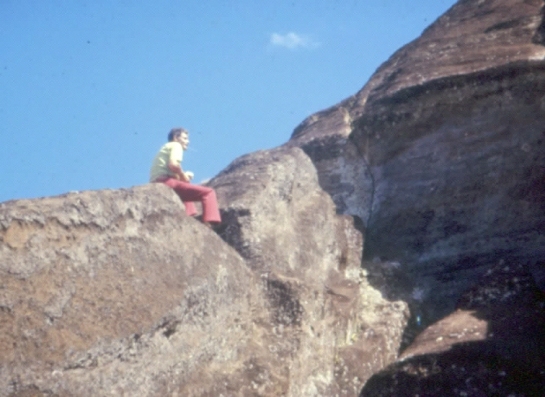
There are a few sheep on the island and there used to be many more. They belong to the government. There are men who work for the government who herd the sheep. Two young couples have been with us. One from Concepcion, Chile and one from Santiago. The young Easter Islander, Roberto Edwards, who was previously referred to, came through an English grandfather. His grandfather came to this island from England and married two women. He then traveled through all of the Islands of the South Pacific and married a woman at each one making many, many, Edwards. He brought the first Eucalyptus trees to this Island. Roberto is the same age as Amber and will be going to school at San Pedro, California in Los Angles this year. He took Amber skin diving twice today and spear fishing.
We will eat the fish that the men caught today for supper. They have been skin diving since about 5 p.m. and it is now 8:10 and the sun is just going down. Everyone is so sunburned. We saw a burial place today with many human bones in it. These burial places are ditches running in front of the statues. They are covered with flat stones which are easily lifted to observe the skeletal remains. Some of the group had their picture taken with human skulls.
Before Ricardo would go into the sea, he would stand facing the sea, hold his arms out towards it and would give a big yell that sounded just like the Tarzan yell. When we asked Alfonso what this meant, he said that he was paying respect to the sea from which they got their food. Ricardo just came out of the sea a while ago with three lobsters and he said that they were for Amber.
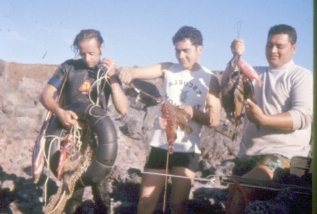 All together we caught around 14 fish that are simply beautiful. They were gray, brown, orange, purple, red and black and all edible. Rosa fixed the lobsters for us with chives and lemons and we ate them with sliced tomatoes and boiled eggs. Later we found out that we ate the lobsters raw (marinated in lemon juice), but they were good. We have had fresh tuna steaks every day and are about fished out. Vaughn had diarrhea this morning, but seems to be alright now.
All together we caught around 14 fish that are simply beautiful. They were gray, brown, orange, purple, red and black and all edible. Rosa fixed the lobsters for us with chives and lemons and we ate them with sliced tomatoes and boiled eggs. Later we found out that we ate the lobsters raw (marinated in lemon juice), but they were good. We have had fresh tuna steaks every day and are about fished out. Vaughn had diarrhea this morning, but seems to be alright now.
Americans are well liked here for a change, since several expeditions have come in here to restore the stone statues. Alfonso says that there are way over 8,000 statues here. When the Americans left here they gave the Islanders cars, trucks, tractors, road graders, etc. so they are appreciative of Americans. Also they left an electric generating plant and a water system that they had built. It is almost the only water equipment here. Last night we watched three tuna fisherman come in from the sea in small rickety wooden boats with just a small motor attached. They caught three tuna that were bigger than their boats and had them tied along side of the boats. Everyone on the Island came to buy a piece. One of the men butchered his right on the dock with a chain saw and weighed the huge steaks out with a scale he had. As he cut off a piece, another man collected the money from those buying. We had tuna filet for dinner that night at 12:30 a.m. Santiago time as we had a three hour time jump. We are drinking rain water and what everyone calls "Jugo," which is a weak punch. Fresh punch is served every meal. It is usually made from pineapples which are very small and sweet. We see familiar plants around such as chinaberry, eucalyptus, figs, caster beans, ferns, banana trees, pineapple, hibiscus, etc.
Dec. 16th: We got up at seven-twenty a.m. and ate a breakfast of guava jelly, fish, pineapple, bread and butter and hot milk. Amber went to the hotel with Roberto and some of his cousins last night. They recorded some their island songs for Roberto to take to California with him so he wouldn't get so homesick.
December 19th: We’re supposed to leave today, but Lan Chile canceled the flight and stranded about 126 people on Easter Island for five more days until Saturday. The plane broke down in Germany. The plane should come in here on Thursday on route to Tahiti and then return on Saturday. Hopefully we'll be able to get on it. We will miss our trip to Vina del Mar and the places we had planned to visit in the South of Chile. We were supposed to leave Chile the 22nd, but we won't be there, so we may not be able to see Mexico as planned, but we think it best to see Cuzco and Lima, Peru, as we will probably never return here in our life-time. Yesterday we spent the morning visiting caves where people who had lived here anciently had practiced human sacrifice and cremation. The caves were large, damp and unpleasant. Banana trees, figs and grape vines grow in the holes or at the entrances to the caves. In the volcanoes are all the trees and vines that grew here years ago, such as citrus, etc. Grasses of all kinds and reeds grow there now too. However, they don't do well because they don't get enough water and the constant exposure to wind is hard on the trees and plants. The bugs flourish here except there are no poisonous spiders or snakes. A real blessing is that there is much grass everywhere throughout the island.
The first day when we were skin diving in the ocean, Amber started talking to a couple of sheep herders who rode by on horses. One was named Ricardo and had worked with Thor Hyerdahl here on the island so he learned quite a bit of English.
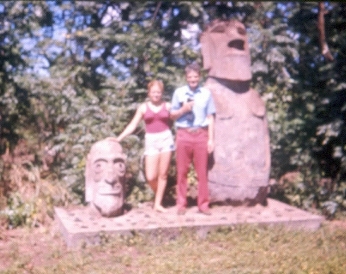 She told him she would like to stay here and he said he would like to go, so why didn't they change places. He really surprised and tickled Amber when he told her taking care of his sheep would be no sweat for her. He was very friendly and talked to all of us as these people like Americans. We went to the stone quarry, which is a huge volcanic mountain where there are many statues in different stages of being hewn out of the rock. We climbed all over them and took pictures. It is a fantastic sight that staggers the imagination. That such an engineering feat of this type could have been accomplished in such ancient times is hard to phantom.
She told him she would like to stay here and he said he would like to go, so why didn't they change places. He really surprised and tickled Amber when he told her taking care of his sheep would be no sweat for her. He was very friendly and talked to all of us as these people like Americans. We went to the stone quarry, which is a huge volcanic mountain where there are many statues in different stages of being hewn out of the rock. We climbed all over them and took pictures. It is a fantastic sight that staggers the imagination. That such an engineering feat of this type could have been accomplished in such ancient times is hard to phantom.
We have been reading several books such as “Kon Tiki” and “Aku Aku,” by Thor Hyerdahl and Father Sebatian Englert who spent most of his life here. Most of the stories about the island itself are similar, but all have their own theory, as there is no written record yet deciphered telling about these people. The red topknots or hats on top of the statues were made several miles away from the statue stone quarry and rolled to where they were put on top of the heads of the statues. The platforms on which the statues rest are often referred to as temples. The topknots were of red volcanic material, but the main statue quarry, and thus the statues themselves, are of dark grey volcanic stone. Roberto gave me one of the tools used to make the statues. It is of a black material similar to flint called obsidian.
Most of the statues are over 35 feet high. Many found abandoned at the bottom of the stone quarry are deeply buried in the tells. The largest one of the unfinished statues is still attached along the spine to the mountain. It is 65 feet long and must weigh hundreds of tons.
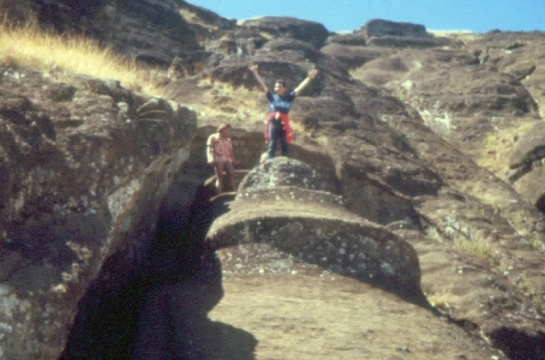
Most were carved statues face up in a horizontal or slightly sloping position. A channel large enough to accommodate the master carvers was chipped out around under each statue in such a manner as to leave it attached to the living rock only by a narrow keel along its back. We climbed in and around all of these statues. Amber and Vaughn both laid on the ears of these statues and neither of them was long enough to stretch from the top to bottom of just an ear.
After the statues were carved, they were detached from this keel along the spine and were slid down the outer slope of the volcano. The carvings and excavations were done with adzes of basalt which are called “tokis” by the islanders. In the vicinity of the quarry thousands of these tools are found just as they were discarded by the workmen who used them. One statue is different from the others. Amber laid in its arms. It has a special name which is “Tuku.” It seems likely this represents a Ru singer, who was accustomed to wearing a mask and goatee made of women's hair. The statue is in a kneeling position. His buttocks are resting on his heels and his hands extended along the sides of his thighs. His total height is slightly over 14 feet. The largest statue to be moved was transported four miles and weighed 82 tons. Its red topknot is about 6 feet high and nearly seven feet in diameter and is calculated at weighing over 11 tons. The greatest engineering achievement of all was placing these large cylinder-type topknots on the Moais’ head after they were placed on their platforms. Workers on these statues expected to obtain supernatural benefits from their efforts.
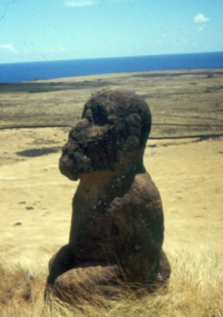 One theory is that they were not slave laborers under the lash, but people who felt they were working for themselves and undoubtedly enjoyed what they were doing. Some fished and cultivated to maintain the master craftsmen while they labored on the statues.
One theory is that they were not slave laborers under the lash, but people who felt they were working for themselves and undoubtedly enjoyed what they were doing. Some fished and cultivated to maintain the master craftsmen while they labored on the statues.
One day when we were on the island Ricky got so hungry that he went to the only coop store and bought a hunk of salt pork and brought it back for our supper. When Rosa served it we were really in for a surprise. It was sliced like lunch meat and raw, so LaPriel told her she would cook it. Rosa stood over her and kept telling her she was burning it. All Chileans do dishes in cold water with no rinsing.
December 20th: We stayed up late last night listening to Ricky singing and playing the guitar which Rosa had borrowed from a neighbor. He did very well and we were very proud of him. It was a very enjoyable evening. We all had a hard time getting up this morning and didn't eat breakfast until 9 o'clock. Then we got in Rosa's truck and went to buy corn for lunch. We bought pineapples and film from one of the Chilean policemen here on the island. There are 36 policemen to serve 1,600 people and they don't have much to do. We also visited the local museum and met several of our tourist friends there. We wished we had moved to the hotel, as Amber is quite unhappy and bored at the house. Vaughn decided that she shouldn't be the only girl at the motel dancing with a lot of island boys. For lunch today we had weak tang, steamed chicken, good fish, sweet potatoes, mashed potatoes, corn on the cob and watermelon. Everyone went to the beach except Rosa, Joan and I. Joan Larson is a member who works at the U. S. Embassy in Santiago and lived with Ricky and LaPriel’s family for the first several weeks when she came to Chile. Joan has had her face swollen from sunburn and I have had a head ache today, so we decided we'd stay out of the wet and the wind. Today we'd rather stay home than go out for seven or eight hours in the weather. An American, Grant McCall and his wife and baby, went with the rest of the group. He came over one evening and visited with us. He and his wife have lived on the island for over two years to observe the people and to write a history of them. I've read and slept most of the afternoon. When we were swimming before, Roberto would go out alone, he would challenge the waves with some kind of a yell and a song which reminded me of Tarzan. The bell at the Church up the street is ringing. I wonder why. All the cars on the island drive very slowly because many people walk everywhere and it makes less dust. We heard from the girl who works for Lan Chile today that we would have to have our bags to the airport tomorrow afternoon and would board the plane at five-thirty a.m. Friday. We'll all be happy to leave and get back to Santiago. Alfonso told us that someone came here and planted ten thousand guava trees. The animals ate most of them, but the survivors grow everywhere wild and bear much fruit. Guavas are a lemon yellow, pink on the inside with a large center similar to an avocado, but the seeds are on the outside and you have to get the seeds off and then you eat the center. They remind me of a quince, but not as puckery.
On December the 19th Joan, Vaughn, and I walked along the wharf, then along the hill to the restored Moais on the north of the island.
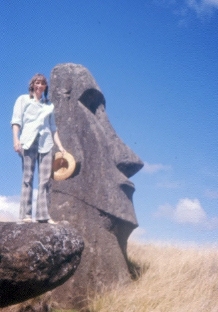 We took pictures of the only statue that has the red topknot restored. We then laid down behind it facing the sea in the shade and relaxed and watched the waves roll in from the sea. On the way home we went to a shed by the wharf and bought a couple of necklaces and a king's crown. That afternoon we went to the motel and ate ice cream. I liked it as it wasn't too smooth. Most all the statues face away from the sea to the inland so they can watch over the people. They are called living faces by their clan as they represent their families.
We took pictures of the only statue that has the red topknot restored. We then laid down behind it facing the sea in the shade and relaxed and watched the waves roll in from the sea. On the way home we went to a shed by the wharf and bought a couple of necklaces and a king's crown. That afternoon we went to the motel and ate ice cream. I liked it as it wasn't too smooth. Most all the statues face away from the sea to the inland so they can watch over the people. They are called living faces by their clan as they represent their families.
December 21st:
Each a.m. we are awakened to the running of horses hoofs as people ride by on the road. Every age rides horses. We have talked to several of the children and all say they have their own horse. It seems rarely does one of them walk a horse. Mostly run them up and down the hills and over the countryside. This is the rockiest place I have ever seen. Volcanic rock is strewn everywhere here. It is said that God had two sacks of rocks to dump on the earth. He dumped one on Rapanui (Easter Island) and the rest over the entire surface of the earth. And it certainly seems so, as any land that is cleared here has miles of rock fences. In Rosa's yard flowers such as larkspurs, snapdragons, oleander, chrysanthemums, caster beans, cactus, and several others are found. We also have seen coconut trees and a couple of pine trees. We met a lot of Easter Islanders through Rosa. They are friendly and ready to take the gringo anywhere on the island. We were charged at least a dollar more per person for everything we ate, bought, and saw than other nationalities on the tour. All the homes are clean. Their cockroaches are almost as big as a mouse, are found everywhere, and are a medium brown color. The islanders fight them, the mosquitoes, flies and all kinds of insects. Most of their pests such as mosquitoes, etc. are brought in on boats of fruit from Tahiti. The rats were brought by boat from mainland Chile. We went over to the airport to watch Lan Chile come in with several families to replace medical staff at the local hospital and all the islander students that were coming home from ten months of school on mainland Chile. It was touching to see all the grandparents, parents and other relatives unite with their children again. We went up at 4:00 p.m. to check our baggage, then we went to watch a ship that had come in being unloaded at the dock. One comes about every four months and brings supplies and orders for people from Chile. This a.m. we went to the open-air meat market by the sea. Once a month a beef is killed and everyone goes and buys meat, bones and all. I saw a lady buy the feet and some men buy just parts of the hide. They had Eucalyptus branches thrown on the ground. The meat was just laid on that and then they'd cut and hang it. People stood in one line and paid for how much they wanted and then presented the paper order to the butcher after standing in another line. They don't care much for beef and would rather eat fish. We about got fished out. Sometimes we had two different kinds of fish per meal. We bought 25 of the small tasty pineapples to take home to the kids, so we had to take them to the customs house to have them fumigated as they have a certain fly that is a menace. Then we had to get a certificate to give to the navy police at the airport when we checked in our luggage.
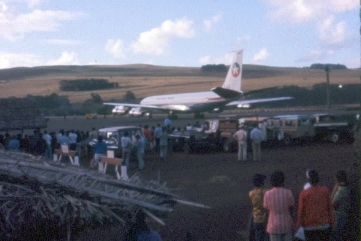 All the people on the island close all the stores and go to the airport to meet the plane as this is the big event of the island. All the kids and others who don't have cars ride their horses. The saddles are of leather and of wood made English style with the horn and a sheep skin worn over it. Long, thin leather thongs with stirrups hang on the sides.
All the people on the island close all the stores and go to the airport to meet the plane as this is the big event of the island. All the kids and others who don't have cars ride their horses. The saddles are of leather and of wood made English style with the horn and a sheep skin worn over it. Long, thin leather thongs with stirrups hang on the sides.
While on the Island of Pasqua Rosa served us rice. When I started to eat it I saw it was full of cooked worms. I could not eat it and Rosa wondered why and seemed hurt when I kept asking not to be served so much food. I would have had a hard time adjusting to their diet if we had stayed longer. Every meal was served with a weak lemon colored punch. One day when I walked in the kitchen I saw how it was made. The leaves and peeling of the pineapple were seeped on the stove and the resulting liquid is the main drink of the island. Everyone eats pineapples there all the time. The children carry them around by the top. The kids peal them and eat them like they were popsicles. Alfonso carried them under the seat of his pickup instead of drinking water.
We traveled in his truck to sight see almost everywhere we went. He charged us $6 and the other group of people with us from Chile he charged less, but it was well worth it. Most of the time we were there I wore a red sweater and my winter coat, a scarf and a hat because of the wind and being so near the ocean. The island is 13 miles long and 7 miles wide and surrounded by water. When we landed we went from one side of the island to the other side to stop the plane, as the airstrip runs across a triangular corner of the island. Everyone rode in the back of the pickup on home-made benches bolted to each side of the pickup bed. LaPriel, Amber or I got to ride up front with Alfonso much of the time. I just couldn't stand the wind and the cold. The wind blows all the time. In the middle of the day the weather is warm. Alfonso was a heavy set, nice looking man and very Hawaiian looking. All the people look like Hawaiians and sing like them with perfect harmony.
On Sunday we were going to hold our own Church but we could not get the Sacrament prayer right, so we decided to attend the only Church on the Island which is located about two blocks up the lane from Rosas. We all walked. It was a Catholic Church. The priest was very old, with long white hair and a beard. He wore a long white decorated robe and a Catholic head dress. He spoke in Latin on Father Abraham. Everyone kneeled and sang. An older woman sang right in my ear. She had a very low, mellow and forceful voice. The singing was simply beautiful. All of the music was sung in their native language, Pascuense. The only thing I could understand was when they said Rapanui, so they must have been singing about their people. All islanders were Catholics except Alfonso. He said that he could not believe it any more and had made many friends and relatives mad at him. He did not attend or make his children go to the Catholic Church. We enjoyed the services and were glad that we went. A man about our age who flew in with us who was from Argentina took movies of everything and recorded the singing at Church.
We went on a picnic at the only beach and he and his wife were there. We visited with them. Amber started doing a floor exercise on the sandy beach against the ocean background on one side, and the cliffs on the other. It was a beautiful setting. He filmed her. Oh how I wish I had that film. Roberto and she went swimming together and LaPriel and Ricky went skin diving. They said the ocean was so clear and so beautiful they hated to come out of the water. They got coral, shells, etc. out of the sea. Sharks are not uncommon and every so often an islander is lost to one. Roberto dove for fish with his spear. He was really nice and brought them to me and said in broken English "For you Mom". Sometime after we left Chile, Roberto finally made it to California to go to school and was living with a family that had sponsored him. We got his address and I wrote him a Christmas letter, but he never answered. He did call Marsha once, but they were never able to get together. All the young people on the island and in Chile loved American clothes and especially levis. They tried to talk Amber out of her clothes and she ended up giving them lots of her clothes. After we left Chile LaPriel wrote that one day they were walking down the street in Santiago and VonLogan yelled, look Mama, that boy has Amber's shirt on. She looked and there was Roberto. Amber had given him a tee-shirt that was white with red stripes around it decorated with blue stars. LaPriel yelled at him and he went home with them and she arranged for him to have the missionary lessons. He eventually quit coming to the lessons and they thought that he had gone to California.
When we left Easter Island at 4:45 a.m. many of the Islanders were there to sell trinkets and bid farewell. There were at least five Islander boys there and they all kissed Amber goodbye. We couldn't believe it. She got acquainted so fast. The day we got there, we were down at the docks and she started talking to a boy in a yellow slicker and boots. He told her that he was an outcast on the Island. He had no family or education and no way to leave the Island and he hated it there. She felt sorry for him, but Rosa became very alarmed when she saw him with Amber. Rosa and a retired school teacher talked to LaPriel and told her that Amber should not be with him as it wasn't safe.
Amber wanted to go to the only nightclub in town dancing with Ricardo. Vaughn and I walked her over to this place, but Vaughn said that we would stay while she danced and then walk home with her. She didn't want that so we all came home and she pouted. There were no girls for her to run with as they were all still in Chile attending high school.
Ricardo had graduated early. She went over and met his family and went horse back riding with him. We walked to and from the motel one night to check on her. We made her come home when we found that she was the only girl with a herd of Islander boys. She was mad. We ate ice cream on the way back to Rosas and LaPriel got sick. There were no street lights so we stumbled along in the dark, but it was nice. On the island they have a store, post office, police station, telephone company, bank branch, a sort of forest service office, the church, homes and a farm or two. That was the extent of the Island. Of course the big jet flying in was the most exciting event of all times.
The U.S. Government also has a tracking station on the island. Chile had just gone through a military over throw of the government, so being as the Island belonged to Chile, they were under martial law just like on the mainland in Chile. We were met by police when we got off from the plane. It was much more relaxed than on the mainland though and not near as frightening as when we landed in Santiago. In Santiago as we came down the steps from the plane the soldiers were standing there with machine guns pointing at us. All the way through customs it was the same. In the few days we were scheduled to be on the island we rushed through a guided tour of the Island. On the last day we found that 129 passengers of our group were stranded for who knew how long. We could have our choice of going to the motel or staying with the Cardineles. I was for the motel so we could keep an eye on Amber as that is where all the action was. The people staying at the hotel told Ricky that it wasn't that neat and that all of the food was out of cans. So, everyone voted to stay at the Cardineles at the expense of Lan Chile Airlines. I was tired of fish and wormy rice, but we survived and enjoyed being with those people. Rosa’s daughter was living in Colorado with a family getting her education. She wanted us to take a cassette tape to her, but she didn't ever give it to us. We were anxiously waiting for another of her daughters who was attending high school in Chile to come home so Amber and she could go places together. However, I guess that they didn't feel like Amber was a good influence as when she arrived on the island she stayed away with other relatives. They had relatives all over the Island.
We ate very small and good tasting bananas raised on the Island. The main income for everyone was housing tourists. Everyone wants to improve their homes and accommodations so that they can make money. We were approached by two families as we got off the plane and they asked us to stay with them. We were fortunate as Rosas’ home was one of the very few with indoor toilets and hot showers. They didn't have electricity until Thor Hyradhal came to the island and left a power plant and water system for them. In 1960 there was a big tidal wave caused by an earthquake in Chile that covered part of Easter Island. Twenty five of the big statues that had been raised up fell over. There was a yellow statute that was taken to the United States and returned. Its lips were puckered and Amber kissed it and we took a picture. Tobacco was growing wild all over the island. The tidal wave left a whole valley full of fish.
The people here think that a super-natural mind-control exercised by the ancient island priests caused the statues to get up and walk from the quarries to their platforms. The statues were called "Maroi Angamoai" or Master Sculpture. Now they are just called Moais. The population of the island never exceeded three or four thousand as near as they can tell, and they carved from solid rock well over one thousand Moais. The Moais served to maintain alive the memory of their ancestors. The statues were never given names of a divine personality such as the Creator, God, or Maqui Maqui. There are two hundred statues in various stages of being carved out of the rock in the stone quarry. King Kong is sixty five feet long and weighs hundreds of tons.
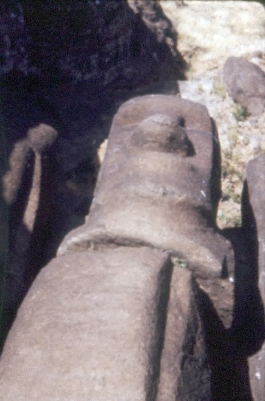 Seventy remain standing at the bottom of the crater slope. There largest one there is thirty-five feet in height. Many are deeply buried in tells but still exposed in part. There are probably more that are buried all of the way under the earth.
Seventy remain standing at the bottom of the crater slope. There largest one there is thirty-five feet in height. Many are deeply buried in tells but still exposed in part. There are probably more that are buried all of the way under the earth.
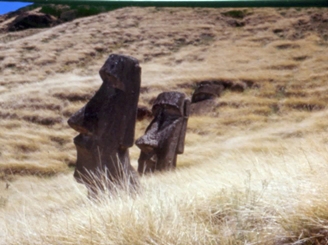 In this vicinity about thirty statues lie on the surface. The carving was done with adzes of basalt which are called "Toki". This hard, fine grained material is found as nodules in the turf and also in abundance in other parts of the Island. The entire island is volcanic. In the vicinity of the quarry thousands of these tools are found just as they were discarded by the workman who used them. The largest statue standing is called "Taro." It weighs 82 tons and was transported four miles through the valley and over a small mountain. This was truly a formidable feat of engineering! Tradition indicated that transportation was accomplished through power of the mind by the priests who were able to make the statues walk a short distance each day until eventually they reached the "Ahu" or platform for them.
In this vicinity about thirty statues lie on the surface. The carving was done with adzes of basalt which are called "Toki". This hard, fine grained material is found as nodules in the turf and also in abundance in other parts of the Island. The entire island is volcanic. In the vicinity of the quarry thousands of these tools are found just as they were discarded by the workman who used them. The largest statue standing is called "Taro." It weighs 82 tons and was transported four miles through the valley and over a small mountain. This was truly a formidable feat of engineering! Tradition indicated that transportation was accomplished through power of the mind by the priests who were able to make the statues walk a short distance each day until eventually they reached the "Ahu" or platform for them.
RETURN TO SANTIAGO
December 21st : We got up at 4:45 a.m. and went through two lines to show our passports at the airport. We were then searched and our purses and carryon luggage was searched. We bid Rosa goodbye and then boarded the plane. We are glad to leave Easter Island after a full nine-day stay. Our luggage was not over weight as we had feared, so two German ladies slipped their sacks of pineapple in with our luggage because they were over weight without our knowing it. We still had eight pounds to go. Rosa gave each of us a shell necklace and embraced us when we left. They were all hand made by the people on the island. A truck was chasing a horse off from the runway as we boarded the plane. I am sure the plane is loaded with the sweet, juicy pineapple that people have bought and everyone is loaded with shell necklaces, feather hat-bands, shell head bands and crowns. Necklaces ran from 40 cents or to $3.50. The most common price was $2.50 which would be 2,500 escudos. We bought wood carved Moai and Ricardo Tusui, the sheep herder, brought us two stone ones that he had carved. We mentioned that we would like a birdman carving, so he rushed home on his only morning home in the week and carved one for Vaughn. Vaughn gave him his double knit orange pants and a pair of socks. He also gave him a warm sweater, a cowboy hat and a Book of Mormon. We left a bottle of Vicks for Rosa. She asked Amber for some as they can't get it there. We left Easter Island at 5:45 a.m. and it was still dark. They served us a breakfast of ham and egg omelets, punch, two rolls (one sweet), a piece of sponge cake and ginger-ale. We slept a lot and landed at Santiago at 10:20 a.m. or Santiago time 1:20 p.m.
The grandchildren were so glad to see us return home to Santiago. They were well cared for, but there were three new people wandering around in the house when we arrived. The people were Raquel, the cook, Raquel’s daughter, her friend, some other woman and Cynthia and Melba who are Ricky and LaPriel’s two Chilean teenaged daughters who live with them while they attend the Church high school. Ricky had to support and sustain ten people while we were gone. And a seventy two year old lady came to do the laundry twice a week, a boy who comes every week to mop and wax the floors and there is a gardener who takes care of all the yards.
MEXICO - JORGE VISIT
On our way home we were guests of Jorge Rojas and his family in Mexico City for three days. Jorge and his wife, Marcela, are best friends to Ricky and LaPriel. Ricky and LaPriel’s 9th child, Marcela, is named after Marcela Rojas and one of Jorge and Marcela’s children is named Ivy after LaPriel. They gave up a family New Year's Celebration to be with us when our flight was canceled and showed us a wonderful time. Several weeks ago we were able to return the favor of that visit by taking them a microwave oven Jorge had purchased while in Salt Lake City for a recent visit. During that visit he was set apart as Mission President of the Guadalajara Mission. We also had their ten year old son, Jorgito, in our home for a few days. Yes indeed, these people from different countries have truly had an influence on my life for good and have made it so much richer and happier.
EASTER ISLAND ARTICLE
Some time after we got home to the United States the following came out in the Winslow Mail on Thursday July 21, l977. I had written it after we had had a party in which Easter Island was a part. The article was about a crown that I had bought on Easter Island and the title is, "If The Crown Fits, Wear It." "In the middle of the vast, lonely, South Pacific Ocean 2,500 miles off the coast of Chile lies Rapa Nui, Easter Island. In December of l975 Mr. and Mrs. Vaughn L. Brimhall accompanied by their daughter Amber, their son Richard and his wife LaPriel spent nine days visiting this Island which is a living museum of a lost culture. They clamored over noses, lips and gigantic arms of the stone giants called Moais still lying in their beds of stone unfinished by long departed craftsman. The giants carved from the mountain quarries have forever been a mystery to the world which has marveled at the fantastic engineering feat. Many of the stone heads weighing as much as fifty tons and standing 32 feet tall were dragged as far as two and a half miles without any machines. Then they were pulled to a standing position and a red stone topknot was placed on top. The natives are friendly and open their homes to the tourists and friendships were made. The special event of the day was for everyone to walk or ride scrubby horses to the main dock to wait for the fishing boats to come home. One Rapa Nui lady wore a beautiful crown made of white shells from the sea. Mrs. Brimhall talked her into selling it to her as she had acquired a feeling for this crown because it was so typical of the Island people. On July 18th of this year Jolylnn Bolas of Pearl City, Hawaii favored Mrs. Brimhall by wearing the crown as she did a Hawaiian Hula Dance at a lawn party held at the Brimhall home in Winslow. Even though Hawaii is approximately four thousand six hundred miles from the Isla de Pasqua (Easter Island) when Jolynn danced the crown looked as if it had arrived home at last on one of the worlds most lovely Polynesians. Consider a glimpse of palm trees swaying in the soft breeze, melodious Hawaiian background harmony and dancing polynesians and anglo girls. This was the scene that was presented to Mr. and Mrs. Brimhall at the lawn party at their home on July 18th. The evening began early with a delightful dinner, youngsters jumping, laughing on the trampoline and trying their muscles on the gym set. Brimhall turned the remainder of the evening over to Greg Bloomfield who had just returned from two years in Hawaii on a mission for the L.D.S. Church. He announced the different types of Polynesian dances presented by Mrs. Bolas' daughters Jaylene and Denise and by Cindy Whipple, Janet Heflin and Terry Hancock of Winslow, who also performed. Mrs. Bolas had been teaching the Winslow girls the past two weeks and this was their debut.
A solo group and twosome numbers were danced to the enjoyment of the guests. Mrs. Bolas remarked that she had never been in a friendlier town than Winslow. She loved the weather, the activities, the town and the warmth of the people. Her son Randall and the family will soon meet her husband in Sandy, Utah where they will seek job opportunities in his printing profession. They hope to establish a home on the mainland. At the present time the Bolas' are house guests of the John Kutch family. The evening ended with the Hawaiian family and Greg singing Aloha Oy. Those attending were Bill and Billy Carver, Edra Hancock, Fontella Randall, Doris Wilcox and daughters Geri and Roberta, Janice Chancelor, Lee Earle and his daughter Elisha, Fred and Ora Collingsworth, Rosemary Kutch, Dale and Sue Hancock and their children, Terry, Jeff, and Jean, and Brian Hancock, Doris and Janet Heflin, John and Helen Campbell and her niece Lorette Gibbons of St. Johns, Tom Wright, Carol Kane, and Armelda Damron, who is my Mother.”
CHAPTER 12: CHURCH SERVICE
CALLINGS
In my eighties I taught CTR-B, the seven and eight year old Primary class, and served as the Relief Society Visiting Teaching Message Teacher and Compassionate Service Leader. Also, I was on the Relief Society Work Day Committee, and also a Relief Society Visiting Teacher. I have served in many callings in the Church. Vaughn and I served many years in the MIA and as Ward, Stake, and Tri-Stake Dance Directors. This took us all over Northern Arizona and to Salt Lake City many, many times. We took many teenagers to Salt Lake for years to dance in the All Church Dance Festival and also helped organize and supervise the festival. I also served as Ward Drama Director, First Counselor in the Winslow Ward Relief Society, Ward Social Relations Teacher, and Dinner Chairman for many Ward and Stake Building Fund Dinners. Regarding Building Fund Raisers, we had to raise a certain amount of money to match money from Salt Lake to build our church buildings. Once when we were involved in one of these fund raisers, Vaughn and several other men were called in by the Bishop and told things were not going well. They were each asked to donate $5,000, which was about half of our annual income in those days. We borrowed the money from the bank and paid it back with interest over several years. We were glad that we could do this.
MISSIONS
I have finished two Stake Missions. I also have completed two full-time missions since Vaughn passed away on April 1, 1986. The first full-time mission was the Dallas, Texas Mission and the second was at the Ezra Taft Benson Agriculture and Food Institute at Brigham Young University in Provo, Utah.
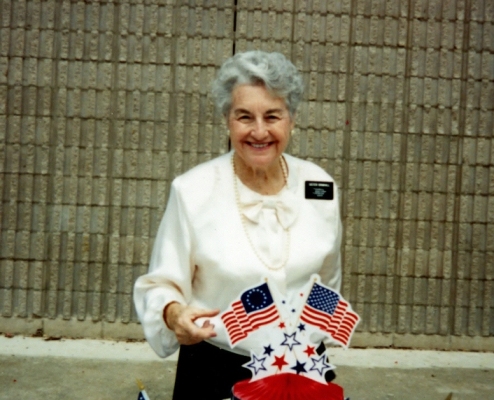
I love to travel and increase my knowledge of the Gospel and strengthen my testimony. I hope to always be a good parent and wife and grandmother.
After Vaughn passed away the reality of adjusting to going on without him and adjusting to the resulting loneliness was and is a daily reality of living. The following I wrote is one of the ways I have dealt with this situation.
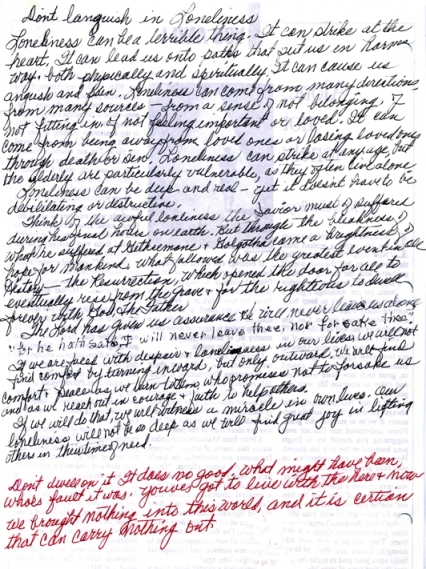
CHAPTER 13: FAMILY REUNIONS
HOW THE B-13 RANCH CAME TO BE
“A Clan So Large That Only The Wide Open Spaces Is Adequate To Accommodate Everyone! They Needed A Ranch For Their Reunions”
By Hester Elizabeth Damron Brimhall
When Logan Brimhall, his wife Mary and thirteen children found no more appropriate locations for their large family reunions, they solved the problem in an unusual way.
To obtain the necessary elbow room the family purchased a 72-acre spread in 1959 on the Mogollon Rim in the Arizona White Mountains and formed a legal corporation with each child contributing towards the purchase and in like manner, with each child and their posterity sharing in the benefits of the B-13 Ranch.
Legally, the family organization is known as the Brimhall’s-13, Inc., named after the father and his 13 children, one of which, Hulda Lou, was deceased at the time of the purchase. The 12 other children are all married boasting of many children, grandchildren and now great grand children.
The B-13 Ranch is located at Pinedale, Arizona, 15 miles north west of Showlow at an 8,000 foot level. It is a haven for any of the clan who might suffer temporary economic reverses and who might just need a rest. It is also the site for an unusual family reunion held every second weekend of August. A committee is organized for the reunions and then approved by the Presidency.
Each year a different plan of activities is arranged by an assigned family. The following is a typical program of our family reunion. All families participate in a parade replete with floats unwatched by any onlookers, since everyone is in the parade. A twenty piece band marches and plays and is made up of the musical students of the family. There is even a drum majorette. Since there are now over 700 descendants of Logan and Mary, this is quite an affair. Next about fifteen cattle, ranging from calves to a bull, are volunteered for the B-13 Rodeo. The riders range from bull-riding fathers to children as soon as they are big enough to climb on the back of a calf. Even a few sheep are ridden by some of the braver boys? Evening brings programs, songfests, talent shows and lively dancing with everyone participating. The programs take place in the large family center built by the willing hands of the family. To close the evening all gather around a huge campfire where the smell of roasting marshmallows is unmistakable and tall tales are told about the area and about each other. Whoops of laughter ring through the pine covered mountains and valleys! The evening always ends with a formal prayer of gratitude to our Heavenly Father for the blessings of family, life and liberty in this great land of the United State of America. The following morning Sunday services are held in the family center followed by the family business meeting.
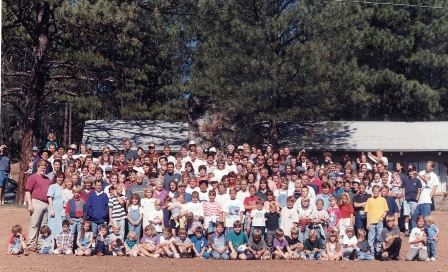
The Ranch area was homesteaded in the late 1800s by R. D. Owens. It was purchased by the B-13 Family Organization from the Cheney Family in 1959 through great sacrifice made by all of the B-13 families. Our family Patriarch, Logan Brimhall and his brothers herded cattle here as boys in the early 1900s and was one of their favorite places. The B-13 Family now owns the original deed signed by President Theodore Roosevelt.
The reunions have been a great blessing to all of the family as we have come to know and love one another so much over these many years. Even though we are scattered throughout the United States and the World, there is only one place on this earth to be on the second weekend of August, and that is at the B-13 Family Reunion on the B-13 Ranch!”
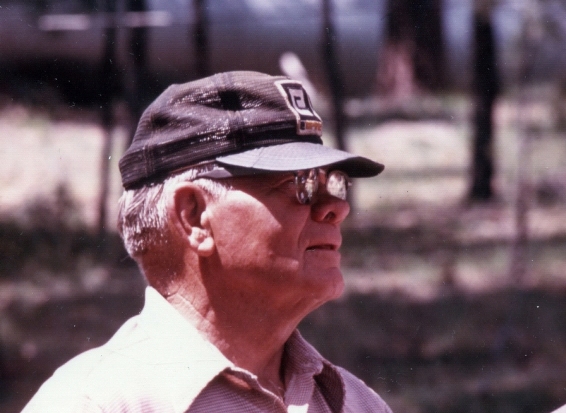
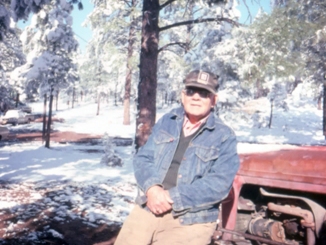
|
|
CHAPTER 14: To My Posterity
ADVICE TO YOUTH & GOALS
What I gained during the years of my youth that I would like to mention here was that I learned that its the best policy to mind your parents. If you do so, you won't get into trouble. I learned that if you don't acquire good study habits early on that you are in misery during all the rest of your educational years. I learned that it doesn't pay to date non-members of the Church because the people you date are the ones you marry. It's very important to choose good, honest, faithful friends because they influence you a great deal. It's a good idea to work on strengthening your testimony and to obey all the commandments that you possibly can while growing up. The goals that I set during my youth were to overcome poverty and to succeed. I wanted to go to college, and I did this. I wanted to be married in the Temple and have lots of children. I also accomplished these goals.
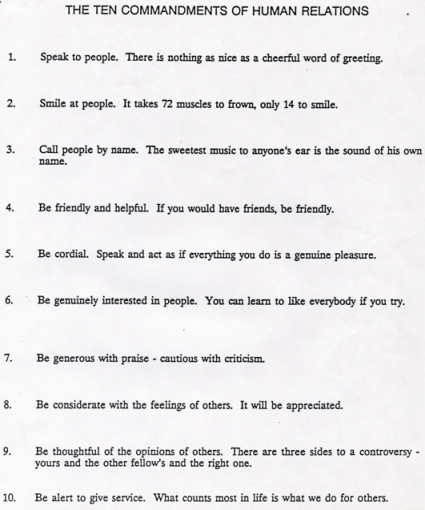
STRENGTH FROM TRIBULATION
I acquired much strength from tribulations. I learned that I could endure more than one thinks that one can, and that life goes on no matter what happens. We just have to try to make the best of it.
We were desperately poor during my childhood, but I didn't realize it until I got older. I could never invite anyone to eat without getting permission first, as food wasn't plentiful except in the summertime when we grew it. Very few birthday parties can I remember. The only one that I do remember, we had cake and hot chocolate. It was during the depression years and money was very scarce.
Death is an important part of our lives and something from which we should learn just how important it is to live the Gospel. It is hard to be separated by death from your husband, your father, your brother, sister, etc., but such is the Lord’s Great Plan of Salvation. Life goes on for you, and for your loved ones on the other side of the veil. The covenants and ordinances we have been privileged to make in the Lord’s Temple give us the assurance that, if we keep the Lord’s commandments, we will be together forever as a great extended family.
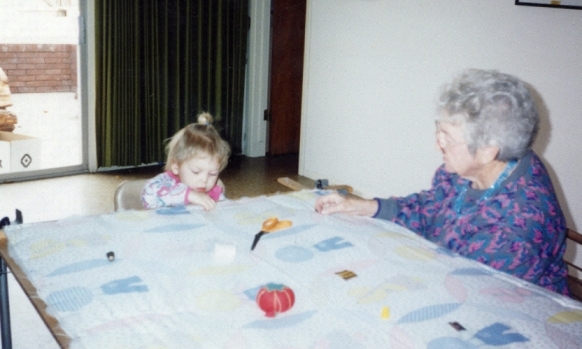
|
Quilting with my Grand Daughter, Miranda Stewart in 1999 |
THE TEXT OF MY PATRIARCHAL BLESSING
“A blessing given by John F. Nash, Patriarch, upon the head of Hester E. Damron, daughter of Joseph V. Damron and Armelda Ferguson, born December 31, 1919 in Thatcher, Arizona.
Sister Damron, as a patriarch I lay my hands upon your head and bless you. You were chosen of the Lord while in the Spirit World to come upon the earth in the dispensation of the fullness of times. This was because of your faithfulness and obedience in your first estate. You are of Ephraim, the son of Joseph and entitled to the blessing of the priesthood. I seal upon you the spirit of your forefathers for upon you rests the calling of searching out the records of your people. The numerous in the Spirit World who have accepted and as yet very little has been done for them. They are organized there and their spirit is prevailing on men upon the earth to gather the ancestral records which in due time, if you are faithful to the calling placed upon you, will come into your hands to be arranged in order that work may be done for them in the House of the Lord. If you keep the commandments of the Lord, you shall be given a faithful companion who will labor earnestly in this great mission. You shall see the hand of the Lord made manifest in bringing records into your hands. I seal you up against the power of the Destroyer that you and your children may be protected from the diseases that shall sweep the earth. I bless you in your basket and in your store that you may have a generous portion of the bounties of the earth. Your last days shall be your best days, comforted and blest with the knowledge that the hand of the Lord has been over all of your days. You shall come forth in the morning of the First Resurrection, clothed with honor, glory and Eternal Life to rule and reign in the House of Israel forever. These blessings I seal upon you through your faithfulness in the name of Jesus Christ, Amen
Signed: John F. Nash”
MY TESTIMONY
The Church is a vehicle that carries all saving works and satisfies mans basic needs. I have a testimony that this is the only true Church the Savior has authorized to use his name and to disperse the powers and blessings that lead to salvation and exaltation. I know the Book of Mormon is true and that all the works that lead directly to salvation are done in The Church of Jesus Christ of Latter-day Saints. I have a great appreciation of the scriptures and feel as President Kimball did when said, “To be without the word of the Lord to direct us is to be as wanderers in a vast desert who can find no familiar landmarks, or in the dense darkness of a cavern with no light to show us the way to escape.” At some time in our lives each of us must discover the scriptures for ourselves and not just discover them once, but again and again. As Nephi said and I too feel this strongly, “Behold, my soul delighteth in the things of the Lord; and my heart pondereth them and I writeth them for the learning and the profit of my children.” It is significant how the Resurrected Savior, as he ministered to the Nephites, took time to examine their scriptures, correct them, add to them and finally expound on them. As John said in quoting the Savior. “Search the scriptures for in them ye think ye have eternal life and they are they which testify of me.” I love the scriptures as they have helped me so much in my life. I shudder to think what would happen to us all without them.
The Lord is so good to me. His cosmic craftsmanship is displayed in the heavens that we all might see him moving in His majesty and power. All the beauty on this earth bears the fingerprint of the Master Creators. I know he loves me and I have faith and confidence in the worthwhileness of life. This faith gives me assurance and trust. The greatest contrast to faith is fear. Jesus said, “Be not afraid.” I try to keep my thoughts clean and uplifting as they have been described as the blue prints of our future actions, and I believe this is true.
One of the greatest blessings the Lord has given me is good, loving and obedient children who are striving to keep and live the commandments of God. I pray daily they may be able to teach their children and my many great grandchildren how to walk in the light. As I visit them I see what a struggle it is to keep the adversary out of their homes and lives. They all try so hard and I’m sure the Lord will bless their efforts.
I am so grateful for the gospel plan to guide and direct me in my different walks of life; for the abundance of blessings the Lord has showered upon me all the days of my existence here on this earth. To end my testimony, I quote a beautiful paragraph by Elder Neal A. Maxwell which sums up my feelings. “So as the shutters of human history begin to close, as if before a gathering storm, and as events scurry across the human scene like so many leaves before a wild wind, those who stand before the warm glow of the gospel fire can be permitted a shiver of the soul. Yet, in our circle of certitude, we know, even in the midst of all those things that there will be no final frustration of God’s purpose. God has known all things from the beginning, wherefore, he prepareth a way to accomplish all his works among the children of men. I desire and hope to be there when all flesh shall see Him together. All knees shall bow in His presence, and all tongues confess His name. He will be dressed in red, reminding us that it was His blood that redeemed us all. Then at this time war and great military battles will be but graffiti on the wall of time.”
I say and believe these things in the name of the Lord Jesus Christ. Amen
CHAPTER 14: Photos of Who We Are & Who We Were
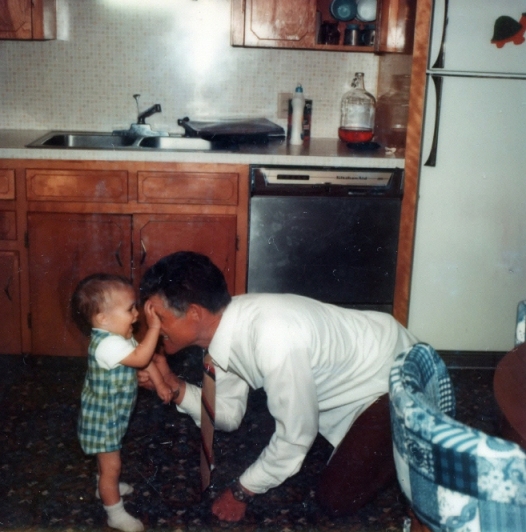
|
Jon Jon Nielsen with Grandpa Von Brimhall 1980 |
